Wet Willie | Interview | “Keep On Smilin’”
Wet Willie is a legendary Southern rock band that released several soulful blues rock albums and had a major hit with ‘Keep On Smilin’ in 1974.
The band, originally called Fox, got together in Mobile, AL, in 1969 behind the powerful vocals and distinctive sax of Jimmy Hall, with his brother Jack Hall on bass and banjo, Rick Hirsch on lead and slide guitars and mandolin, Lewis Ross on drums, and John Anthony (later succeeded by Mike Duke) playing the keyboards. Wet Willie put out several albums on Capricorn Records between 1971 and 1977. Along with a ‘Greatest Hits’ album released on Polydor Records, they also released two more final studio albums on Epic Records.
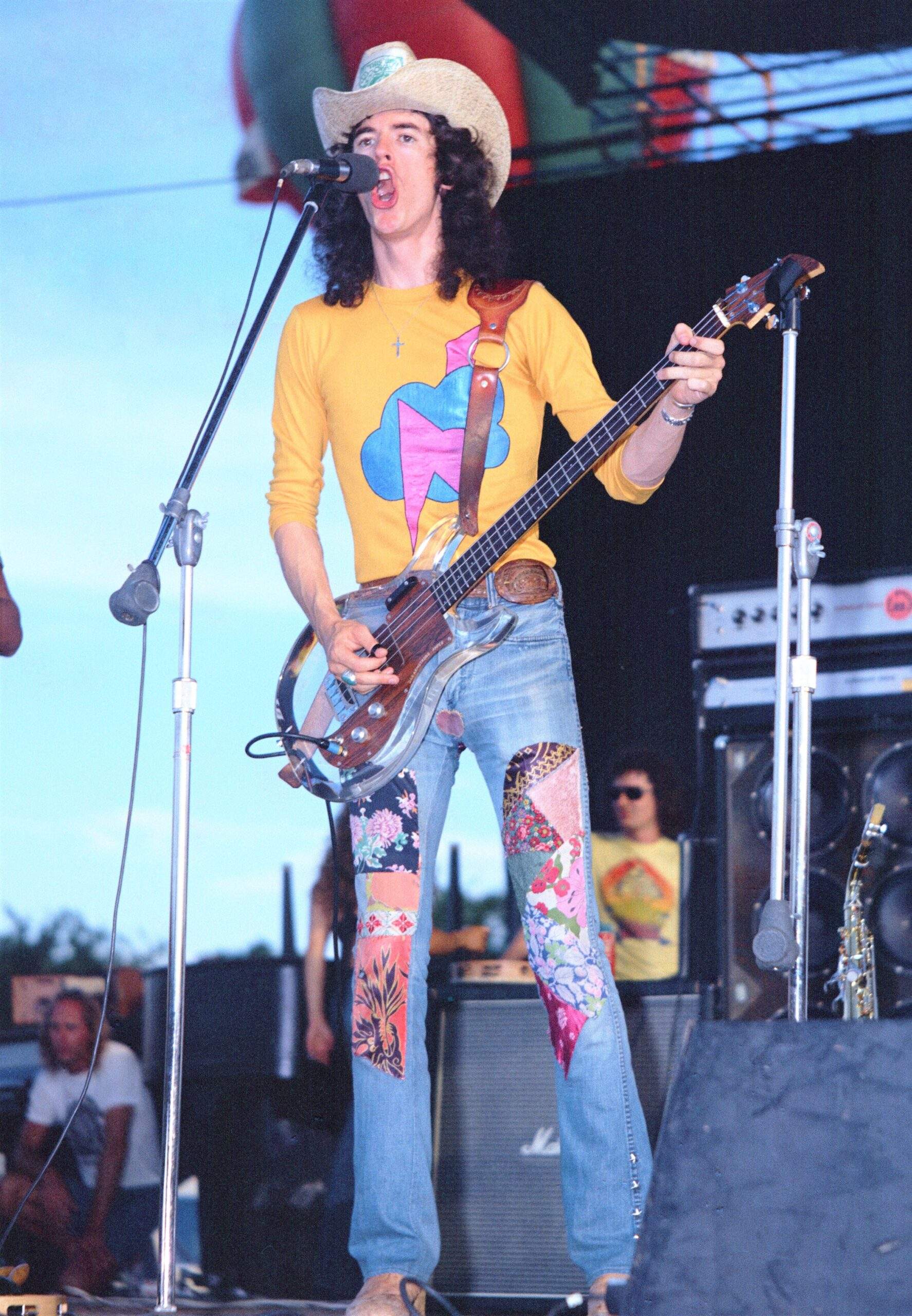
In 2012, Wet Willie released a new live album ‘Miles of Smiles’ on the Hittin’ The Note Records label. They continue to tour with three original members including original lead singer Jimmy Hall, brother Jack Hall on bass and vocals, sister Donna Hall Foster on vocals, as well as other long time members, drummer T.K. Lively, Ric Seymour on guitar and vocals, Ricky Chancey on guitar and newest member, keyboardist Bobby Mobley.
“Keep on smilin’ through the rain, laughin’ at the pain
Rollin with the changes til the sun comes out again”
It’s really great to have you and I can’t wait until we dive deeper in the history of Wet Willie. Where and when did you grow up? Was music a big part of your family life? Did the local music scene influence you or inspire you to play music?
Rick Hirsch: Thanks, Klemen, for the opportunity.
My parents were first generation Americans with parents of eastern European and Mediterranean ancestry in Atlanta, Georgia, where I was born. I am a “son of the South” as they say. My story begins there, but I was raised during the formative years in Mobile, Alabama and eventually moved on as a young adult to Tuscaloosa, Alabama, where I received my Bachelor’s Degree in science at the University of Alabama, then to Macon, Georgia, and finally Los Angeles, California. I mention these geographical points of reference simply because they each represent a stage of my growth as a musician, songwriter and performer.
My mother, Violet, was a music buff to a degree and her tastes definitely shaped mine in the very early years. My dad, Raymond, a wonderfully kind and warm human being who’s strengths were in the business realm, but was basically tone-deaf. He’d sing to make us laugh. Violet was very much into the pop music of her era, and her tastes veered in the direction of Xavier Cougat and other Latin pop artists of the day. That extended into Sinatra, Garland, Jo Stafford, among a slew of other music contemporaries. There was a bit of “long hair classical” interspersed as well, Beethoven, Ravel, Mozart, Chopin…the usual suspects. She had a Victrola and a fairly nice collection of 78’s that was populated with the aforementioned. I’m quite sure much of that got into my ears as a 3-4 year old. I’m not sure, however, how my mind interpreted what I was hearing, but I do know that I was curious as there are photos with me behind a child’s drum set an aunt had given me. When my parents decided to move to Alabama to start a business is when my real connection to musical things begin in memory.
I was only six, but things were starting to stick. Like hearing Hank Williams’ ‘Jambalaya’ on the car radio. Plus, I had a nanny. When I would come home from school, Annie Jean would have an ironing board set up with a small bakelite radio resting on it so she could listen while she worked. It would be tuned to what they called the “black station” back then, WMOZ. By the way there is a sister station that still exists to this day in NOLA called WWOZ, an iconic roots station. WMOZ is no longer or has morphed into a modern version of itself. Back then though, I heard a constant stream of Muddy Waters, Elmore James, Howlin’ Wolf, B.B. King and many other blues artists who were actually current and playlisted back then.
The one song that stands out among several was ‘Rock Me Baby’ (B.B. King) and the memorable signature guitar riff B.B. played. I didn’t know what I was listening to, but there were these consistent sounds blasting from this tiny speaker. Mainly, B.B. and Elmore (as I later learned) were the ones getting into my head. Interesting point is I had no idea what was making this sound. I just knew I was drawn to it. My perception at that point was visual imagery and shapes simply because I didn’t know about a physical sound source. Of course eventually I discovered it was guitar. They played jazz on this same station, so I was introduced to the gamut of instruments as well as guitar. Regardless of what it was, I had this visualization of these notes in my mind’s eye, and also the intervals happening between the notes.
As I grew up and developed friendships with like minded pals who were into music, I began to expand my musical database. By the time I was ten, a random visit into a soft-serve, groundbreaking for the time, ice cream parlour provided the next major leap for me. As we entered the place, almost as if it was cued up, Ray Charles’ ‘What’d I Say, Pt. 2’ began to blare out of the juke box. You know … the part where there’s this banter going on between Ray and what sounded like a small group of people in a club environment highly charged and engaged by what Ray was getting ready to throw down. And then the pop music game changing call and response that ensued … my life was at that moment forever altered. I may not have known it at that precise moment, but it was profound. It’s hard to explain the joy and exuberance that B-side conjured up in me, but I’m certain I’m not alone.
Donna Hall Foster: Music was always a big part of our lives growing up in the Hall household. Our mother, Mattie LaVera Richardson Hall (Nanny) played piano and sang at her church from an early age and she continued to play piano and sing her whole life, teaching gospel songs and harmonies to all of her 6 children. At the time, we didn’t realize the musical education we were getting. It was the foundation for all of our musical pursuits. We would gather around her piano, usually on Sunday afternoons and practice together. Jack and Jimmy joined the high school band and I was active in the chorus of our high school.
John Anthony: I grew up in Whistler Alabama, a small township next to Mobile, Alabama. I started with piano, then violin, then later guitar and organ. My influence from music was top 40 radio. Then underground FM radio.
When did you begin playing music? What was your first instrument? Who were your major influences?
Jack Hall: I come from a large musical family. I’m the oldest of 6 siblings, three of whom became members of Wet Willie: my brother Jimmy, sister Donna and myself. Our mom, Mama Hall to us and our bandmates, played piano and sang old hymns and popular songs, as we would gather around and sing along. Mom was always our musical muse and influenced us to a large degree.
Jimmy and I joined our middle school band in Mobile, where we grew up. My first instrument was the clarinet, Jimmy played alto sax. So our introduction to music theory was in our middle and high school bands. I later moved to bass clarinet and Jimmy wound up on bassoon, of all things.
I have a vivid memory of one Christmas when Jimmy and I got tiny transistor radios- mine was black, Jimmy’s red I think. I would put mine beside my pillow at night and go to sleep to the songs played on the local AM popular music station. So my earliest musical memories, other than singing around the piano with Mom, were hits from the 50’s and 60’s, when DJ’s could play an eclectic mix of styles from R&B (Wilson Pickett, James Brown, Otis Redding), pop (Elvis Presley, Bobby Darin, Brenda Lee) and even country (Ernest Tubb, Jim Reeves, Loretta Lynn). So my first musical influences came from the songs we heard on the radio, but I gravitated more to the gritty soul and R&B sounds from artists like Chuck Berry, Jerry Lee Lewis, James Brown and Otis Redding.
Rick Hirsch: My first recollections of placing my hands on an instrument are around an old piano that was in a restaurant the family frequented. It was hidden away in a rarely used room I discovered. I was mesmerized by it and would just tinker. My parents sent me to a summer camp where I befriended a kid who had brought an acoustic guitar with him. He made the mistake of showing me two chords, first position E major and first position E minor. He wasn’t all that about it, and it was a good thing because I ended up holding onto it for practically the full month we were there. And I must have played that one chord change E – Emin back and forth more than a thousand times. That started my whining to my parents for a guitar. They ended up buying one for me that had strings that were at least a full centimeter above the fretboard. They didn’t know, and were it not for my friend’s legit guitar, I wouldn’t have known either. It didn’t matter. I would tune it to an open chord without knowing what that was and just bar the frets with one finger and strum. I used to fall asleep with that guitar resting on my chest making random sounds, again not really knowing anything about what I was doing. I then began to figure out how to play simple chords.
Unbeknownst to me at the time, music terminology began to find its way inside my relationship with the guitar. And it wasn’t long before the parental units decided I needed to take lessons which I did from a guy who played in a supper club organ trio. Luke Morris was his name and he was from Texas. I learned a lot from him and especially in the area of chords. He was a jazz guy and knew the guitar very well. I think primarily what I got from him besides chordal knowledge was how to deepen my connection with the guitar and understand what touch means and its importance in playing the guitar effectively. During my years in junior high and high school, I had to take my studies seriously. I did but the guitar was always there as a kind of refuge and an escape. When in high school, I was starting to get pretty good and was part of a high school folk group as the sole accompaniment. I was also backing up a trio of girls and going on small regional tours with them campaigning for a congressional politician, my first paying gig. This was probably much more fascinating than I realized at the time. And by the time my senior year rolled around, I was playing in a local band called the Mark IV. We played at roller skating rinks and high school dances. I was severely bitten by the bug and would play every chance I found.
By the time I arrived at college, I had a decent repertoire of songs I was able to play plus a fair understanding of intermediate guitar skills. Suffice it to say guitar and music in general were well in the mix of my everyday life, but majoring in science with all the labs took up the great majority of my time. I could wax philosophical here but will spare your readers.
My last couple of years in college, I met a local guitar hero. In Tuscaloosa, you could throw a ball blindfolded and hit a great guitarist there were so many. This one fellow was literally legendary and played in Muscle Shoals a lot with that crew. His name was Tippy Armstrong. You asked me who influenced my playing. On a personal level it was definitely Tippy. I would track his local gigs when I could, and he would put up with my endless questions. He could play any style of music convincingly and would do some very obscure tunes on his gigs. I was into Brazilian music by then and he could rip through them as if he was cloning João Gilberto. I bought my first electric guitar from him, whereas in all the bands I’d played with most of the guitars I played were loners. It wasn’t that unusual back then. The guitar Tippy sold me for fifty bucks was a Fender Musicmaster. Wish I still had it. A few years later I found out that Tippy was no longer with us, a great loss to the music community of ‘Bama and to me personally of course.
I’ve had so many influences, both as a guitarist and also as a writer. Personally, it is important to note that my musicality was not strictly blues influenced, nor was it always guitar driven. Eclectic would apply. But back then (’60-70’s) among peers and musicians of comparable age, like everyone, I borrowed from many contemporaries, including Jesse Edwin Davis, Ry Cooder, Mike Bloomfield. And I’d be lying if I didn’t say various sides of Duane Allman and Eric Clapton to a degree. Thing is, all of us young blues dudes from back then were all reaching back to the same pool of older blues musicians like B.B. King, Albert, Freddie, T-Bone Walker, Elmore James, Muddy Waters and all those cats I’m leaving out. We probably leaned into the ones with whom we resonated the most. And Elmore James was for me the greatest blues singer and player from that era. His controlled intensity was on fire. Robert Johnson too, with his immediately recognizable playing and singing. All of the greats had one thing in common and that was a distinct musical personality, a trait that is sorely lacking today. That said, there are so many current incredible young players who are truly leveling up and raising the bar big time.
As it pertains to Wet Willie, we all grew in the context of a band not only as performers but as writers too. With Jimmy Hall as the face of the band and lead vocalist, I kept that in mind when I was writing. It had to be something he could sing comfortably. We never really talked about that, but it was just a natural part of the process. And it worked because although we were influenced by different genres, at the same time, we were listening to a lot of the same music, i.e. Van Morrison, Taj Mahal, et cetera. The first year, we were a cover band and performed much of the music we dug in clubs. This will shape a band in many ways!
Lewis Ross: My first instrument encounter was a single snare drum (but not actually owned by me), which my sister brought home from her school when I was about 8 years old. Not long after that my brother brought a more modern version of a snare drum as he too had taken up snare drum in school. That introduction to those instruments along with the marching cadences of some of the Marching Bands in our Mardi Gras Parades cemented my enthusiasm for learning how to play.
John Anthony: I started piano lessons when I was six years old. At the age of eight, I started violin, and classical organ at the age of fifteen. My teacher thought I was gifted and arranged for me to attend the academy of music in his hometown of Krakow, a prestigious music school in Europe. My parents were of little means, and so ended my hopes of a trip out of town.
What are some of the very first bands you were part of?
Jack Hall: I was rather late getting into playing with other musicians. I got my first guitar at 16, a Kay acoustic, a gift from my parents. Folk music was the rage at the time, so after teaching myself basic chords I would play songs by Peter, Paul and Mary, early Bob Dylan, and the like. Later some high school friends and I put our first bands together, some of which had pretty colorful names like, Edison Birdcage, Tequila Mockingbird, Mrs. O’Leary’s cow and the ill-advised Devil’s Disciples (I think we just liked the alliteration). I played mostly rhythm guitar at first, but had an epiphany at a Chuck Berry concert, where I could hear the bass player well, and decided that’s what I really wanted to play.
Later some college classmates and I had a group called the Pagans, a pretty decent band, who opened for the Animals at one point.
Lewis Ross: The very first high school band was The Fyfth Cykle which played several local and some neighboring county high school dances and private parties and “Local Teen Hutspots.” Then came a band named Carl LaFong which was formed with one of the members of The Fyfth Cykle, Marshall Smith, Wick Larson, Jimmy and Jack Hall and myself. This band played places like Pensacola, Fort Walton, Florida and Lucedale and I believe, Hattiesburg, Mississippi before disbanding.
John Anthony: From the age of 16, I played in three local working bands; The Nomads, The Vanguards, and The Sons of Creation. The latter placed third in the Dick Clarke Battle of the Bands in Raleigh, NC in 1968.
In the twelve grade I received a music scholarship for violin to Springhill College, but getting out of town was still pulling on me, so in 1969 I joined a travelling rock band instead, and moved to Macon, GA. The band turned into southern rock band Wet Willie and they say the rest is history.
What were the circumstances around the Fox formation? The band was assembled by drummer Lewis Ross in the summer of 1969?
Jack Hall: You’re correct in that Lewis Ross was the person who reached out to friends from several Mobile bands. John Anthony on keys, myself on bass, and Ricky Hirsch, who had recently graduated from the University of Alabama, on guitar. Our first jams were at Lewis’s house or John’s, and it was obvious we had natural chemistry from the start. Ricky was probably a bit more advanced musically, and I recall being impressed by his natural B.B .King-like bluesy vibrato. We jammed on old blues and R&B, but found we didn’t have a strong lead singer among the four of us. I said “I think I know somebody who might fit in great.” Jimmy, of course, who had been playing with some of the better cover bands in the area. When asked, Jimmy jumped on board and we became Fox.
Rick Hirsch: The Summer of ’69! After graduating from University of Alberta in January of ’69, I was in Mobile figuring out what I was going to do with my life while spending time with my folks in a family business. I hadn’t met any of the other guys at that point. One day while at work, I received a phone call that turned out to be Lewis Ross who introduced himself mentioning he was a drummer. Said he’d heard about me through some friends and asked if I’d be interested in going down to Panama City to play a gig for a couple of weeks (paraphrasing here.) My immediate response was sure, but I needed to make sure my absence wasn’t going to cause a problem at work. All was fine, and he asked me to come jam (we used that word instead of “rehearsal” back then) at a house in Whistler that weekend. To say I was limited in my equipment would be the understatement of the century. All I had was my Musicmaster guitar (the same one I bought from Tippy), no case, no amp and a piece of rope for a guitar strap. When I arrived I think everyone else was there. It turned out to be keyboardist John Anthony’s parents’ home. John was the youngest member but probably the most studied of any of us. He played violin in his school’s symphony but could play anything he put his hands on. His father (and mother) were highly supportive of his music endeavors and exceptionally kind to us from the outset. When I walked in we went into a small music room his father had added on to their house. John knew I didn’t have an amp and he had set up a speaker cabinet his dad made face down on the floor to mitigate the volume and a Bandmaster amp. Wow. That little rig screamed. Anyway after the introductions, we started spitballing songs around that everyone might know. And the first one was a blues from The Electric Flag’s first LP written by Buddy Miles titled ‘Texas’. It starts out with a simple drum pickup which Lewis knew, and into this Cmin/maj/B7 downbeat that was as blue as blue gets. Everybody landed on it right on time, Jimmy ripped that first line (“I just got in from Texas, baby… you didn’t even know I was around…”), and we were off to the races. I looked up and the room was fully tie-dyed and electrified. This is one of the most vivid memories I have. That song within a couple of years eventually morphed into Wet Willie’s own C-blues, ‘Macon Georgia Greezy Hambone Blues’. At the jam, we went on to flesh out what we could pull off at a gig. That included a slew of Cream songs, Taj Mahal, Led Zeppelin, The Rolling Stones, Albert King, B.B. King, Van Morrison, even The Beatles. Funny when I think back, because it was as if we’d all arrived prepared just by having played so many of the same songs.
Lewis Ross: As I mentioned Carl LaFong had broken up and I was without a band. So the search was on for me to find or create another band to play with. I looked around for a few weeks to find something I wanted to do but all the bands I talked with were working or about to record. It then became apparent that maybe I should try assembling a band. I started to approach players that I had seen perform and thought were the players to enlist. John Anthony (keyboards and guitar) was first on my list. I went to a couple of his shows and brought up the idea of putting a band together. After second visits with John he agreed. Now to the player I had not heard. The lead guitar player in Carl LaFong (Wick Larson) had told me about a guitar player that he knew, and said “He was very good.” Now this was the exception to my organization plan, I had not heard him play. To keep things moving, after a couple of meetings with John, I decided to call Rick Hirsch and from that came the now infamous words “You don’t know me but I’m calling to see if you wanted to join a band I am putting together.” From that, he agreed to come to a jam session. So now is when I actually called Jack (Jack Hall) and all the players were in place if he was still interested as I had talked to Jack previously and told him what I wanted to do.
Jack and Jimmy had already found work with a band called Mrs. O’Leary’s Cow. He did not agree to join, but he did agree to come to a jam session also. That left Jimmy Hall and as I mentioned he and Jack were already playing in Mrs. O’Leary’s Cow and that band had won a contest to record in New York and Jimmy wanted to do that.
We did not have a singer the first couple of times the players got together I talked with John about the singer situation and he agreed to talk with the singer of The Sons of Creation (George Mills) (John’s previous band) to see what he thought, George as it turns out was noncommittal. I then went back to the pursuit Jimmy after three or so tries he agreed to come jam. That first jam session was magic!!! We all were overjoyed! After a couple of meetings we decided on the name Fox.
John Anthony: Lewis Ross and I started looking for like minded mates to play underground FM after I left “Sons of Creation” in the later part of 1968.
Tell me who was in the Fox lineup?
Jack Hall: Our initial Fox repertoire was very eclectic. From heavy rock (Led Zeppelin, Cream), blues (Taj Mahal, Robert Johnson, Jimmy Reed) and R&B (James Brown, Wilson Pickett). Jimmy could sing just about any genre, with a very impressive range, so folks were impressed with our wide ranging song selections.
Rick Hirsch: It was John Anthony (keyboard), Jack Hall (bass), Jimmy Hall (vocals, sax, harp), Rick Hirsch (guitar) and Lewis Ross (drums).
Lewis Ross: Jimmy Hall (lead vocals, harmonica and saxophone), Rick Hirsch (lead guitar), John Anthony (keyboards, guitar), Jack Hall (bass guitar), Lewis Ross (drums). Later Donna Hall (vocals) and Ella Avery (vocals).
I’m guessing you were influenced by a lot of great Blues and Blues Rock artists of the time, would you like to share some names.
Jack Hall: Personally, as far as bass players, I had a wide range of influences, from Paul McCartney, John Paul Jones, and other British bassists, to David Hood, Duck Dunne, Chuck Rainy and other great R&B bassists.
Rick Hirsch: Klemen, I think I may have addressed a few of these above. But I’ve left out some major players. Musically influenced by so many! I guess I literally binged on Ray Charles as mentioned. Curtis Mayfield was way up there (‘Superfly,’ The Impressions). Marvin Gaye. James Brown. Donny Hathaway, Cornell Dupree, Richard Tee… My penchant for Brazilian music was major too, like very early Sergio Mendes, Astrud Gilberto, Tom Jobim, João Gilberto, Rosalinha Valencia … Lots of jazz figures in there too like Bill Evans, Pat Martino, more modern and avant garde like Miles Davis, John Coltrane, then later with Weather Report and Wayne Shorter, Joe Zawinul, with all its variations. Herbie Hancock (can’t say Wayne without mentioning Herbie), Eddie Harris, Les McCann, Idris Muhammad … And various producers but mainly Arif Mardin, Tom Dowd, Henry Lewy, Russ Titelman, Lenny Waronker, Tommy Lipuma, Stuart Levine … worked with several of them and admired all. I can’t leave out the sax players although Eddie Harris and Wayne Shorter are already mentioned, Hank Crawford is huge … Fathead Newman … all those cats that played with Ray.
Lewis Ross: I was influenced by Elmore James, Mike Bloomfield, Willie Dixon, John Mayall, Muddy Waters, Taj Mahal, Little Walter, John Hammond, James Cotton, Albert King.
What was the scene like in Mobile, Alabama? Were there any clubs that you played as Fox?
Jack Hall: As the folky era led to the hippie scene, most Mobile musicians evolved along those lines. Lots of psychedelic influenced bands, musically and sartorially. We began to dress and look the part. There were several really good groups along the Gulf coast, from Pensacola, FL to New Orleans and bigger cities like Birmingham. There was one club in Mobile where we played a good bit, but after all this time, the name escapes me. Hopefully some of the other Wet Willie folks can fill in the blanks.
But one funky joint, Johnny’s Smokehouse, just across the Alabama Mississippi line as I recall, really stands out in my mind. As our reputation began to spread along the coast, Fox began to draw bigger and bigger crowds. It was at Johnny’s Smokehouse, with a huge raucous crowd that I first realized we had something very special.
Rick Hirsch: Not many. Mobile at that point had The Stork Club, The Dixie Club, The Harlem Duke Social Club (primarily a black club and even more iconic). Most of our club dates were out of town … Carolinas, Arkansas, Florida.
Lewis Ross: There were only a few places that we could play back in those days. Because of this we started playing in the City’s Municipal Park, which was referred to by everyone as Municipal Park. Once we started the event (by simply setting up and playing) we did not miss a Sunday for quite some time except for major weather events (hurricanes) for quite some time, at least 7 months, but we were not alone not very many bands could find work so the roster of performers grew and so did the crowds.
John Anthony: There were no clubs in Mobile, Alabama that were interested in booking our “long haired hippie music” but a funny story to amplify that, was a month or two after we started playing free shows in Municipal Park we were booked to play a family restaurant in Fairhope, AL. I think there were some young girls that wanted us to play at their fathers place. Well one of the young ladies dressed up like a “go-go dancer” as they were called in the 60’s and when the father came into his restaurant and saw us hippie types and how we were influencing his daughte r…He threw us out on our ears … so much for our first paycheck.
Do you recall the instruments, amplifiers, et cetera you had very early on?
Jack Hall: I had played several different basses before and up to The Fox years. My first memory is a Gibson EB-0, red with a single humbucker pickup. Later I found a rare Hofner solid body bass, in a pawn shop I believe, with a vinyl covered body, black with gold scrollwork design. This probably was the bass I played at the inception of the band, but unfortunately it was stolen from Capricorn studios as we recorded our first album. Then I acquired my number one favorite for years, a 1962 Fender Precision, bought from a local Macon musician for a ridiculously low price. But, again, my heart was broken when it too was stolen from a friend’s car in Atlanta. Our fourth album, ’Keep On Smilin’,’ was recorded with an Ampeg Dan Armstrong bass, with a clear Plexiglas body. It sounded great in the studio and I played it on tour for several years. I wish I still had it.
I went through a series of amps too; one of my earliest was an Ampeg B-15, which I wish I still had. Then a Standell amp with two 15 inch speakers. Also I had a Kustom rig with the iconic roll and tuck covering. I can’t recall what type of amp I had at the start of Wet Willie, but it wasn’t a big expensive rig. Over the years my rigs got bigger and more complicated, to the point when only our roadies knew how to set them up.
Rick Hirsch: My first “real” acoustic guitar in my teens was made by a company named Gagliano. It was equivalent to any jumbo acoustics you see around today. No longer in my possession. The first electric guitar I actually owned as opposed to being a loaner was the early ’60’s Fender MusicMaster mentioned above, a metallic teal color (Daphne?). Early on I somehow ended up with a Silvertone amp 2×12 combo in high school, maybe have been a loaner. When Fox was on the road, I played through one of John Anthony’s amps, a Fender Dual Showman head with the large cabinet that came with it. I had also picked up a Gibson LG0 acoustic somewhere along the way and traded it for a strange looking Gibson hollow body that looked much like a Les Paul in size and shape.
I later traded the Music Master for a ’65 Gibson SG, a great guitar but the sentimental value of that Music Master is priceless. I’ve regretted every time I’ve sold a guitar. The SG was with me during the first couple of Wet Willie tours until someone decided I didn’t need an SG and permanently borrowed it and a 1970 Les Paul Deluxe that I’d picked up. My amp scene began to change and I started using two Ampeg V4’s through four 4×12 Marshall cabinets. We were in the beginning stages of playing some arena type shows and the extra horsepower helped.
Lewis Ross: Yes, of course I wanted a “Ringo” Ludwig Set back in those days, after seeing The Beatles on TV, but when I finally convinced my mother to co-sign for me to be able to get a drum set, the “Ringo” kit had been sold when we actually arrived at the music store so my only choice was a gold satin swirl Gretsch 3pc drum set. There were more pieces added from my aunt’s and my mother and myself. I kept, and played that kit till 1971.
John Anthony: Farfisa organ (red), Vox organ, Silvertone guitar (from Sears and Roebuck), Fender Bassman amp, Fender Showman amp, Vox Super Beatle amp, Horner pianette tenor sax (that Jimmy ended up with) a Horner clavinette and tons of other think that got sold or stolen or broke!
Is there any chance to hear the demo recording of Fox? What were the songs you recorded?
Jack Hall: We did record a few songs in Mobile before moving to Macon and becoming Wet Willie, but I doubt any of those recordings still exist. A local songwriter, Milton Brown, asked us to record a few of his tunes, one of which, ‘Sugar Free Woman,’ comes to mind. And though my memory is spotty about demos we did as Wet Willie before our first Capricorn album, there may be some early recordings still in the vaults at Capricorn.
Rick Hirsch: We went into a few studios as Fox. Not many. Most notable was Malaco in Jackson, Mississippi owned by Wolf Stephenson, one of those legendary guys. They were starting to cook and had a few hits. A couple of friends here who were connected to Malaco took us there and we tracked one of the first originals we had as a band, a song I wrote entitled ’Rock and Roll Band’. The version we cut later at Capricorn ended up on the first Wet Willie LP. We cut some other things in Mobile at a tiny upstairs studio that these same friends had to demo their songs which we helped them with. But the very first recording Fox tracked was in a practically de-constructed studio some guy was trying to put together in downtown Mobile. I’m talking about exposed wall studs and beams! We cut Curtis Mayfield’s ’People Get Ready,’ probably the Impression’s arrangement, and I may still have the cassette.
Lewis Ross: I am not sure what this is in reference to but early on Fox recorded ‘People Get Ready’ at Channel One Productions.
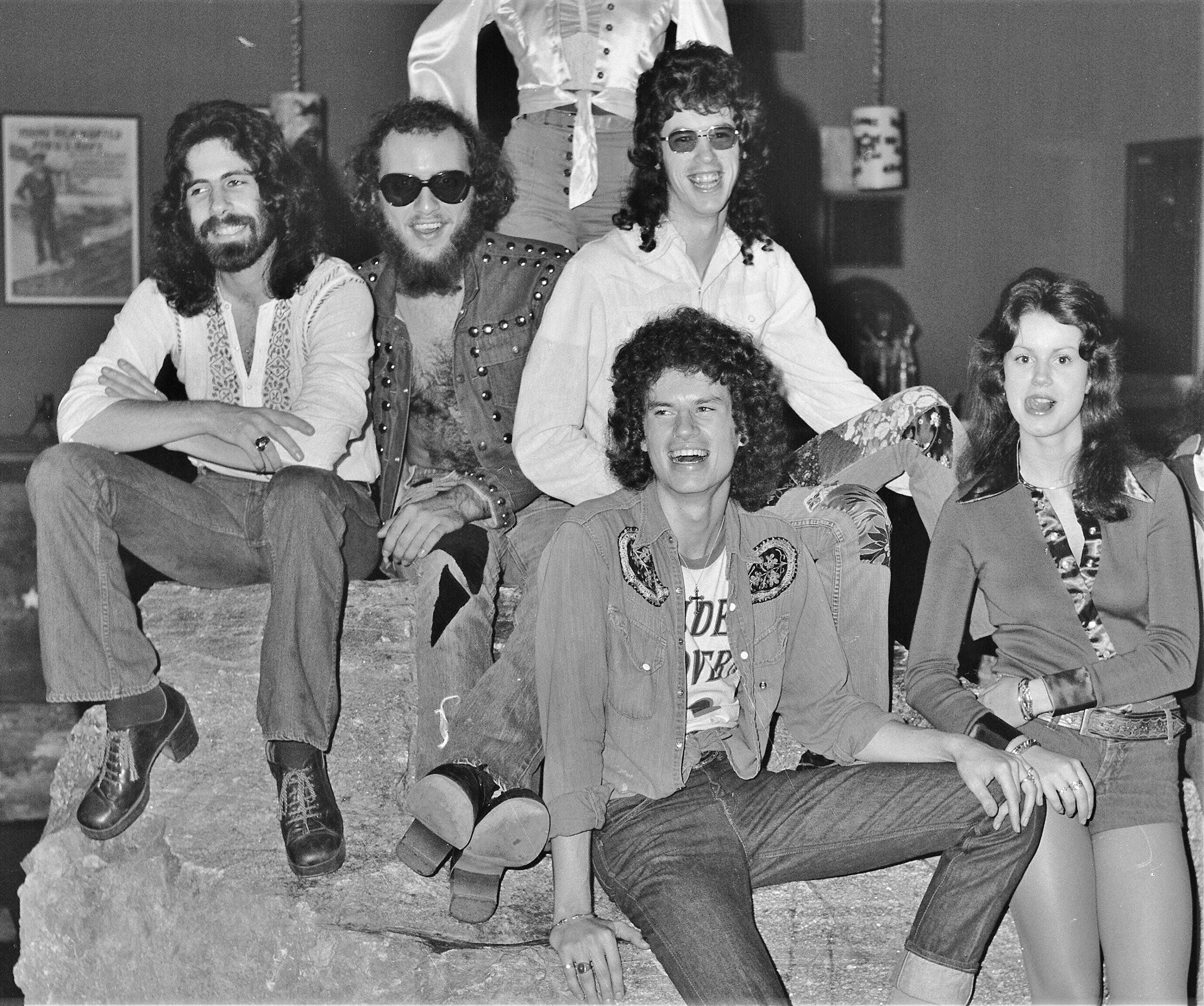
Did you have a plan to move to Macon, Georgia because Capricorn Records was based there and you were hoping they could sign the band?
Jack Hall: Basically, yes we were motivated to move the band to Macon when we heard that The Allman Brothers and Capricorn Records were based there. As Fox was gaining a reputation in Mobile and along the Gulf coast, Ricky Hirsch got a call from Frank Friedman, a fraternity brother from the University of Alabama. Frank, a singer-songwriter and guitarist, had moved to Macon from north Alabama to seek a deal with Capricorn, along with several other talented Alabama musicians. They tried putting a band together and even started doing live gigs, I believe, but when that effort didn’t pan out, Frank contacted Ricky, suggesting that we, Fox, join him in Macon as a six piece band.
Rick Hirsch: We were of course aware of the Macon music scene and Capricorn just by the sheer immense blow up of The Allman Brothers Band. That band put Macon on the map as they say. We’d been to see them at the Warehouse in New Orleans, LA., and were blown away. But we didn’t have a plan to move to Macon and attempt to be signed or anything like that. Not until a college friend of mine, Frank Friedman, who had seen us play in Tuscaloosa at some point, and who had already moved to Macon, called me one day and suggested we come there and audition for Capricorn Records.
Donna Hall Foster: In 1969, Jack and Jimmy left Mobile to move to Macon, GA because they had heard of the budding music scene there due to Capricorn Records. I was still in high school but when I graduated in 1970, I moved there as well. I got a job at Capricorn Records working for Mike Hyland in the publicity department, putting together press packets and press releases for various acts. Also was busy in the studio, adding harmonies and backing vocals on albums by Wet Willie, Cowboy, Marshall Tucker and Kitty Wells.
Lewis Ross: We seized the opportunity to travel to Macon when the situation presented itself. Once presented with the fact that there was interest in the band by Capricorn, naturally we were hoping to get signed.
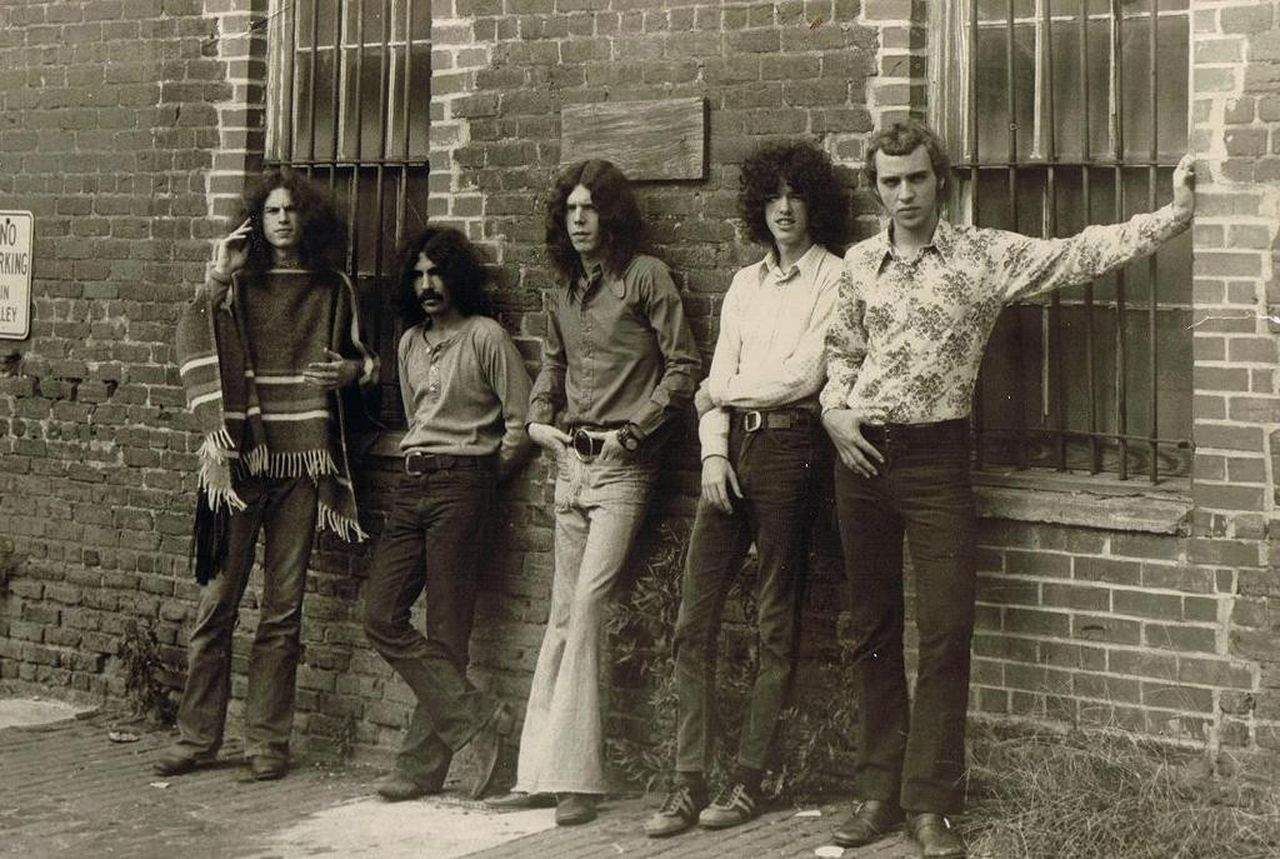
Do you recall how you got the contract and what led to the name change? On that note, there must be a story about how you got the name “Wet Willie.”
Jack Hall: We decided to give it a try and went to Macon initially to determine if we could put enough songs together for an album. Frank was fairly prolific and had some good material, so with his songs and a few we’d been playing, we auditioned for several Capricorn label executives in a rehearsal space adjacent to Capricorn studios. I recall Frank Fenter, VP of the label, listening to us and, apparently favourably impressed, said “Come to the office Monday (or whatever day it was) and we’ll sign you to Capricorn”. We were ecstatic, of course. Our recording and touring career had begun. But when we met to sign the contracts we were told “Just sign the agreement, it’s a standard contract.” Without legal counsel and being quite naive, we didn’t realize there’s no such thing as a ”standard contract.” We were too excited to be concerned about such legalities then. We were bona fide recording artists!
The label did a name search and found that Fox had been taken, so we had to change it. I have a clear memory of Frank Fenter, Capricorn VP, suggesting with a wink and sly grin “Why don’t you call yourselves Wet Willie?” We were so pumped up about getting signed that we didn’t argue, and settled on that name.
We knew the term ”wet willie” as a prank where you would wet your finger and stick it in someone’s ear. I guess we thought “Cool, we take our music and stick it in your ear.” But later, when we flew to London to work on our first Epic album, we were puzzled by the chuckles coming from the baggage handlers when they saw “Wet Willie” stencilled on our guitar cases. When we asked about it they said “Don’t you know what it means for a guy to get his willie wet mate?” Live and learn I guess.
Rick Hirsch: OK, this is where it gets a little complicated. Frank was a guitarist and songwriter, and had some good songs, four of which are on the first Wet Willie album we recorded. His songwriting was a bit more evolved than any of us at that point and in my opinion. He asked straight up if he could be part of our band, and he could put the Capricorn audition together as he was basically scheduled to record an album there with his group which was named Wet Willie! (read that again…). There was apparently an issue with getting that version of Wet Willie together and on the same page. So this is actually the way we inherited the name Wet Willie. Backing up, we loaded up John’s van and a U-haul trailer with our gear and headed up to Macon. We stayed with Frank at an apartment he had I think. Within a couple of days we set up in an old warehouse that Capricorn had taken over on the same block as the recording studio. This place was full of boxes and crates and had a bare lightbulb hanging from the ceiling with a few outlets around we could plug into. We went in at night and were joined by the A&R executive from Capricorn, Frank Fenter, a South African who has an amazing story, but briefly he’d moved to Macon from England where he was in charge of Atlantic Records UK operation. We played several songs, mostly originals, both Frank Friedman’s and ours. By the end of it, Frank said simply, “come in Monday and we’ll sign the paperwork…” I think at the Monday meeting they asked us to assume the name Wet Willie. I wasn’t aware at the time that there was another group with the name. Frank Fenter said in his South African brogue something to the effect of, “you know…cock rock!,” motioning with his arm and fist for emphasis. That was their perception of Fox and when I see some of our photographs from back then, I guess I understand. But I was a little disappointed that we had to abandon Fox. I think someone said there was another band called Fox anyway, and we didn’t want to have to go to court over it. But I’m pretty sure other than the aforementioned, there was no band called Wet Willie anywhere, ever. And it is a name that is impossible to forget, so … voila.
Phil Walden and Capricorn Records rented a large house on Georgia Ave in Macon expressly for Wet Willie. We flipped coins for dibs on rooms and moved in. It is still there with a historical plaque in front that says The Wet Willie House. Wow. If those walls could talk …
Lewis Ross: Yes. We had a gig set up at the Clubhouse of an apartment complex in Macon, and were made aware that a representative from Capricorn would be in attendance. There we met Frank Fentor, VP of Capricorn. I believe Phil Walden was there also, but Frank stated that he would come to a rehearsal and listen to us again. I was really excited to have the opportunity, and at that rehearsal in a warehouse that The Allman Brothers had also used as rehearsal space, we were told that we indeed had been accepted as an artist for Capricorn. They wanted us to come by “The Office” (535 Cotton Avenue) and we would commence the contract signing. After a short time, I think we had already started recording songs for our first album, and we were informed that we would need to change the band’s name. There was already a band named Foxx and the record company did not want any confusion at the record bin over the name. The band that went to Macon to finish their contractual obligations, was mentioned as a possibility and Frank Fentor said something like, ”you guys are from the coast, why don’t we call the band Wet Willie.” And of course there is the other connotation that is the saliva-soaked finger stuck in someone’s ear.
John Anthony: The record company changed our name. Rick Hirsch had a friend in Macon he went to college with, who had a band named the “Willie Band” In that band was Chuck Level, who went on to play (piano) with The Allman Bros. and The Rolling Stones. The bassist was Charlie Hayward who played for 40 something years with Charlie Daniels band. But they busted up and he was left with a record deal and no band! So he called Rick Hirsch and away we went.
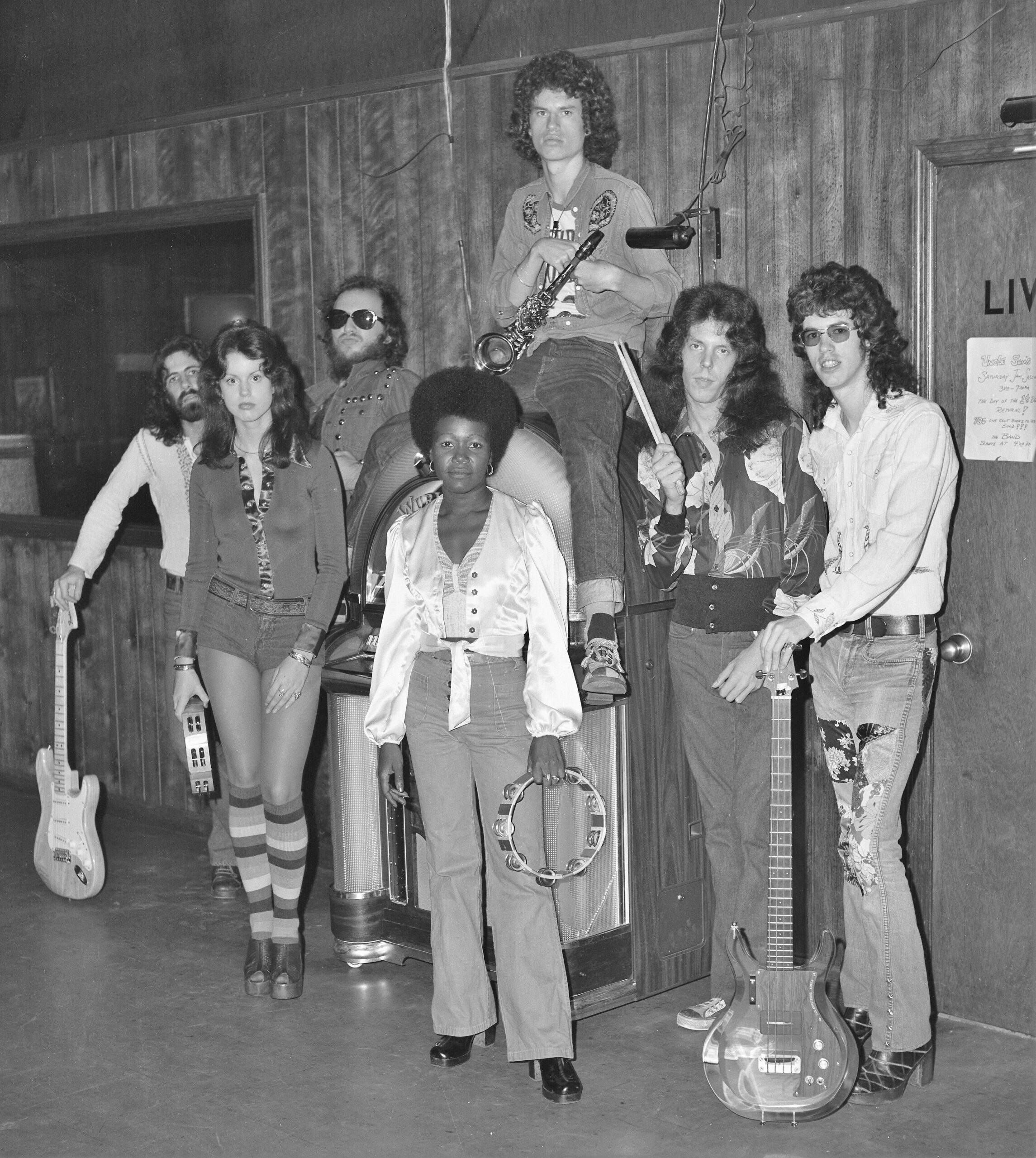
How did you first get in touch with Frank Friedman?
Jack Hall: I recall Frank Friedman and some of his Alabama musician friends used ”Willie” at one point, but it seems that Ricky Hirsch said they also went by ‘Wet Willie’ as well.
Lewis Ross: It was actually the other way around. Frank called Ricky at a time when Rick, Jimmy and Jack were living together at The Dauphine Apartments. An Apartment Complex that Jimmy and Jack’s mom was the manager of. Frank called Ricky to see if he would be interested in coming to Macon to help complete the formation of a new band to complete the contractual obligations of a band that Frank had named Willie. Rick’s response was that he did not want to leave the “good thing” he was involved in down in Mobile but, he thought we could all come up to Macon and do it. So at that point Rick called me in Gainesville, Florida to ask me the question, ”Do you want to be in this band or what?” I of course responded “Yes I do” I had taken a pick up gig with a band I had been playing with in Mobile. As a matter of fact Fox played the club where I was playing with the other band, we did a set and pretty much won a lot of hearts over with our raucous playing.
What was the name of his band that he tried to sign to Capricorn Records?
Rick Hirsch: “Wet Willie!”
There wasn’t long until you played as an opening act to The Allman Brothers Band in 1971. Tell us about those early gigs and with who else did you perform?
Jack Hall: Since we shared the same label and manager, Phil Walden, it made sense for us to open for The Allman Brothers early on. As the original southern rock band, The Allmans were consummate musicians and we were in awe of them from the start. But they and their crew were very welcoming and accommodating to this young upstart band from Mobile. They were starting to hit their stride when our first album came out, so their audiences were boisterous and energetic, and welcomed us warmly as well.
We toured almost constantly during the Capricorn years and joked that we opened for everyone from A to Z, The Allman Brothers to ZZ Top. Most of our gigs were with other southern rock groups, including The Allmans, of course, as well as Charlie Daniels, Marshall Tucker and Lynyrd Skynyrd. Our first coast to coast tour was with Grand Funk Railroad in 1974, as ‘Keep On Smilin’’ climbed the charts. We were thrilled to hear our song on the radio in far off cities like Portland and Seattle.
Rick Hirsch: Right. Well can you imagine what it was like for us? In the course of just a few short months going from a handful of club dates to landing a recording contract, recording an album for the same label as Allman Brothers Band? It came so fast that I’m not sure how we kept up that pace. The energy of youth is astounding. During the Capricorn years, we toured with The Allmans, Grand Funk Railroad, ZZ Top, Beck, Bogert & Appice, Ike & Tina Turner, REO Speedwagon, Aerosmith, Humble Pie, Wishbone Ash, Lynyrd Skynyrd, Bachman–Turner Overdrive, The Guess Who, and just about any seventies touring band you can name. We either toured or shared bills with all of them.
John Anthony: I’ll tell you how we first met The Allman Brothers Band and it’s kind of funny. We were just a few months into working for Capricorn when the booking agents called and said they had us on the show with The Brothers in Jacksonville FL. We were in Tallahassee, FL. and we’re to drive that night after our show to Jacksonville. We got there around 10:30 in the morning after driving all night and we looked and felt terrible. So we dragged ourselves out of the van and into this beautiful hotel on the water where the other bands were staying. We went up to the front desk and said, ”We’re with the Allman Brothers.” They looked us up and down and said, “Okay, here’s your room keys.” We were only in the rooms for a couple of minutes when the phone rang. I answered and in a young cocky voice said, “Goat Records,” the voice asked who is this? I said “John Anthony with Wet Willie.” The voice said, “Well, this is Duane Allman and your little asses are in our rooms! Get out now!” This was their homecoming gig and the press and radio stations and groupies were all in the lobby. The elevator opened, and everyone was looking at us. How embarrassing!!! But after a couple of months playing with them they warmed up to us.
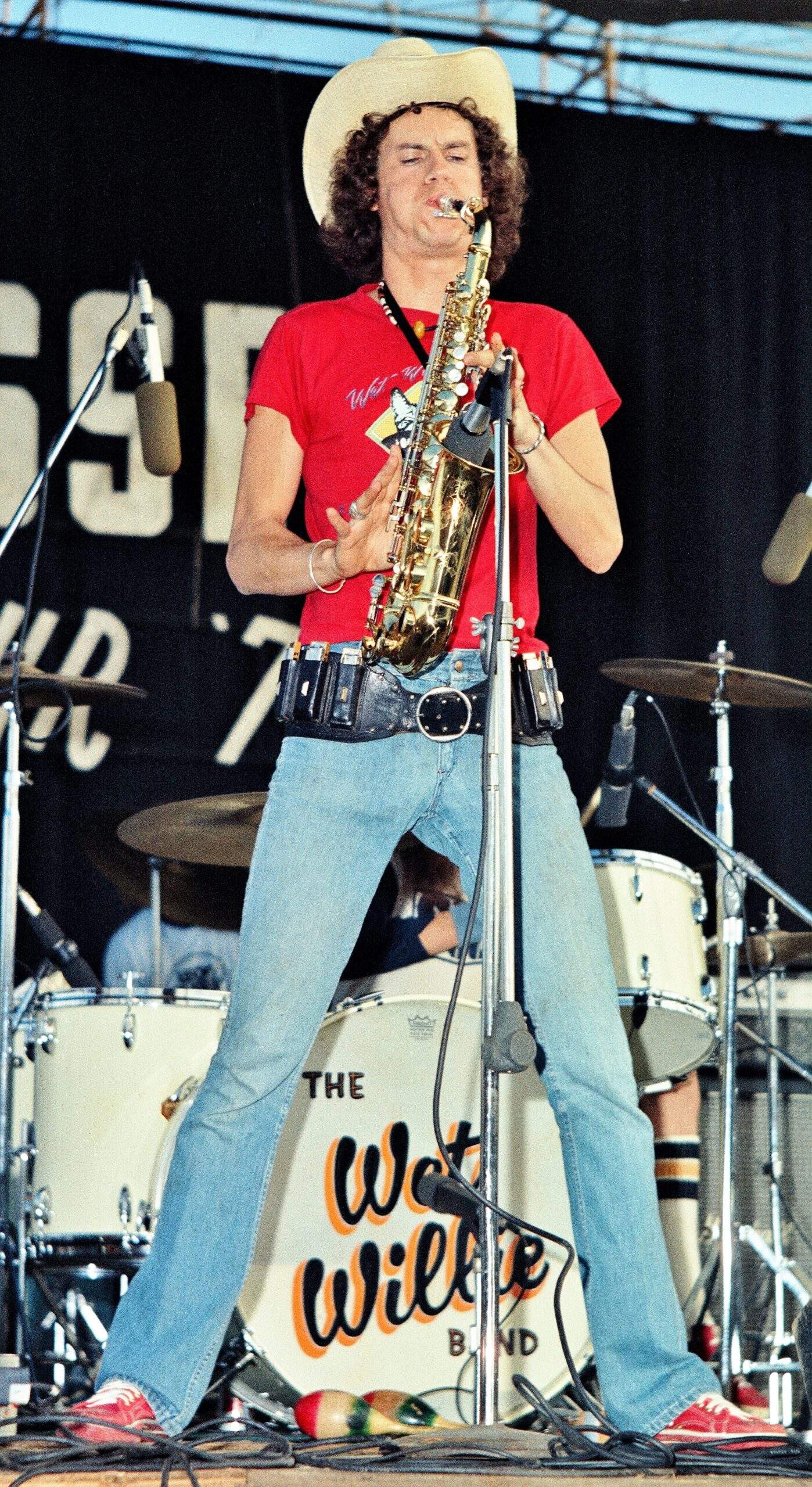
How was the band accepted by the audience?
Jack Hall: My recollection is that, except for rare cases, we were well received by audiences in most cities and venues, especially after our albums and singles were released and were heard on local radio stations. Of course our best reception was in southern cities.
Rick Hirsch: We had our markets like everyone else. I think we were pretty well embraced wherever we played, but of course especially in the southern states. I only remember one not so great experience at a college in New York where we were opening for The Allmans. Those people were there for one thing and they were not subtle in letting us know!
Donna Hall Foster: As Wet Willie’s popularity grew, The Williettes were born to help flesh out their sound. Me and Ella Brown Avery toured with them for several years. She eventually left the band because she had a young son at home that she wanted to be with. So, Elkie Brooks was tapped to be her successor by the execs at Capricorn to take her place. She toured with us for a short time and even came to Mobile to visit us at our home. She was a dynamic performer and fit in quite well. She returned to England and Leslie Hawkins took her place. Such a sweet beautiful petite girl with a big voice. We all loved Leslie!
Some time in 1975 Wet Willie decided to take some time off and regroup.
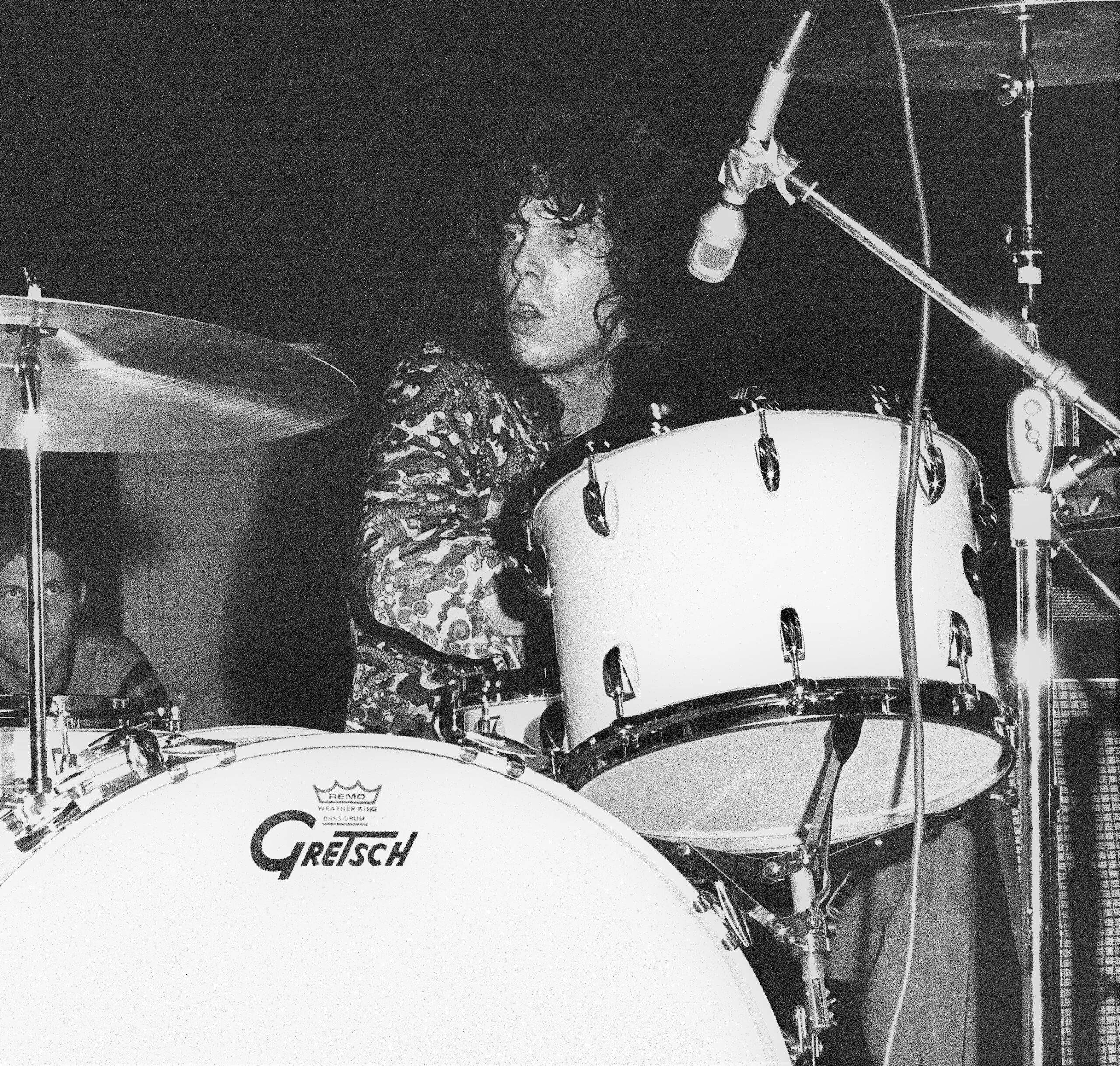
What are some of the strongest memories from writing and recording songs for your debut album?
Jack Hall: Four of the 10 songs on our first album were written by Frank Friedman. ’Spinning Round,’ ’Faded Love,’ ’Beggar Song’ and ’Fool On You’. Ricky Hirsch also had four: ’Have a Good Time,’ ’Low Rider,’ ’Rock And Roll Band’ and ’Pieces’. John Anthony contributed one, ’Dirty Leg,’ and we included one cover: Jimmy Reed’s ‘Shame, Shame, Shame’.
The band wasn’t very prolific, since we toured almost constantly and had little time to work on new material. But we worked on these arrangements in our rehearsal space, a process that went smoothly, as I recall, and working up arrangements of Friedman’s songs didn’t present significant issues either. Our high octane version of ’Shame, Shame Shame’ went over well with audiences and became a staple in our set lists for many years. I don’t recall the number of hours spent recording, but I’m sure it took a bit longer to get satisfactory takes since we were so inexperienced in the studio and the recording process.
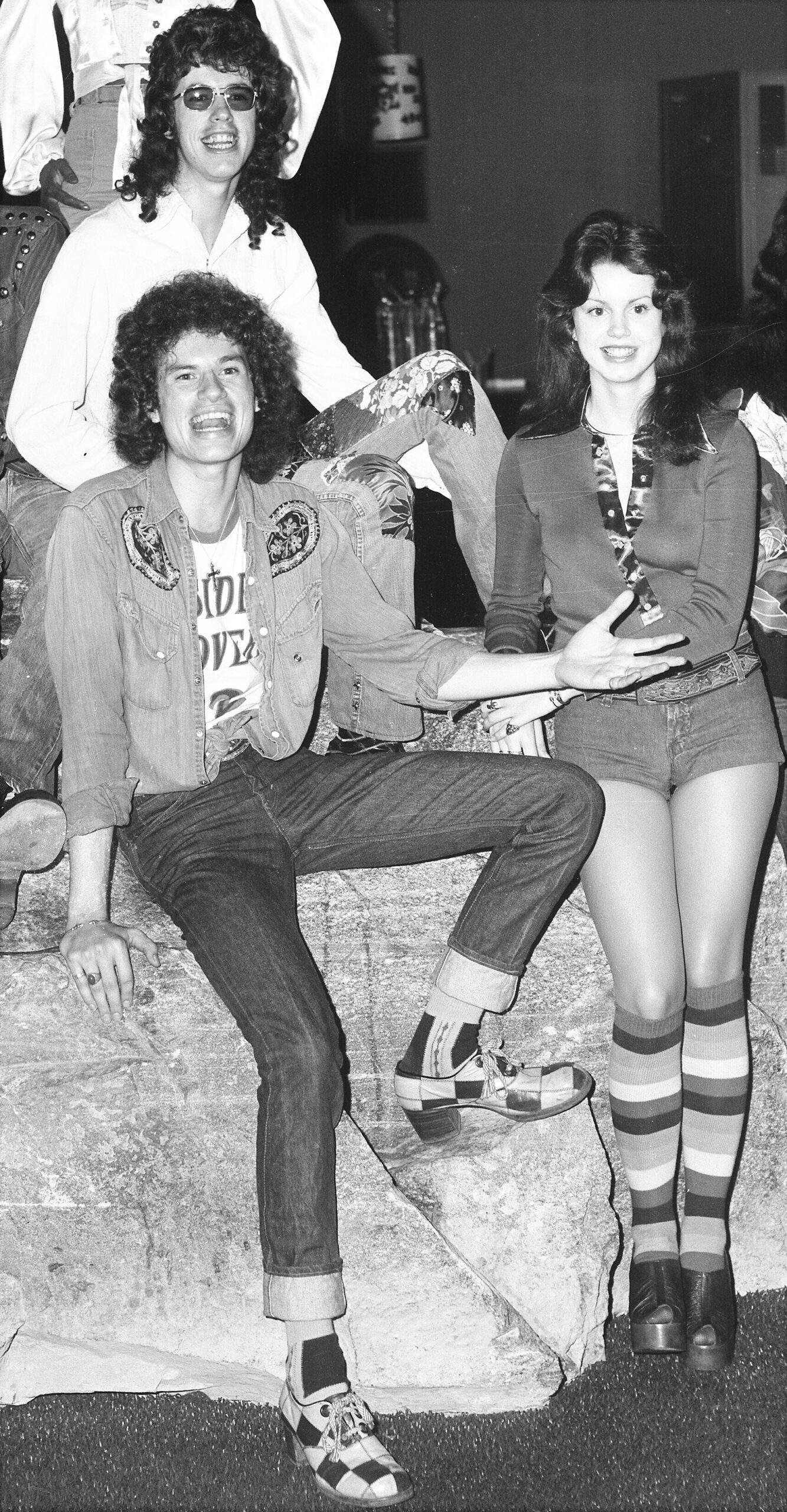
Rick Hirsch: To be honest, I’m not sure how ready or prepared we were to go into a recording studio. The record company wanted whoever produced us to capture as close to a live sound as possible. On our end that wasn’t a tough thing to do… we only had to be ourselves. But we weren’t as polished as a recording band, not that polished was going to translate into raw. But you still had to have at least some finesse. After going through a few producers, Frank Fenter called in a guy he’d used in London who produced Yes and I think Heads, Hands and Feet, named Eddie Offord. I’m not sure he was the right call, again my own candid opinion. A Glyn Johns clone is what we needed. From a guitarist point of view, I know my sound was not as raw as I would have preferred, i.e. overdriven saturated. Regardless, it wasn’t bad for a first LP and a young band. By the time we started recording, we’d parted ways with Frank Friedman, but we still recorded a few of his songs, I’m glad to say. I do not remember the details of his leaving.
My strongest memories of recording that first album mainly center around going into the control room after laying down a track and listening to what we’d done. That was a magical feeling. Keeping in mind we recorded literally on the first console they had which was hand built by Jim Hawkins, chief engineer and all round great and brilliant dude, an eight track machine, and some authentic analog outboard equipment.
Listening to what we were doing basically under a microscope and for the first time was both thrilling and at times terrifying! I guess most bands jump that hurdle initially. If we had it to do over again, my wish would be that we’d been a good bit looser in those early sessions. More hell with it and not quite as polite.
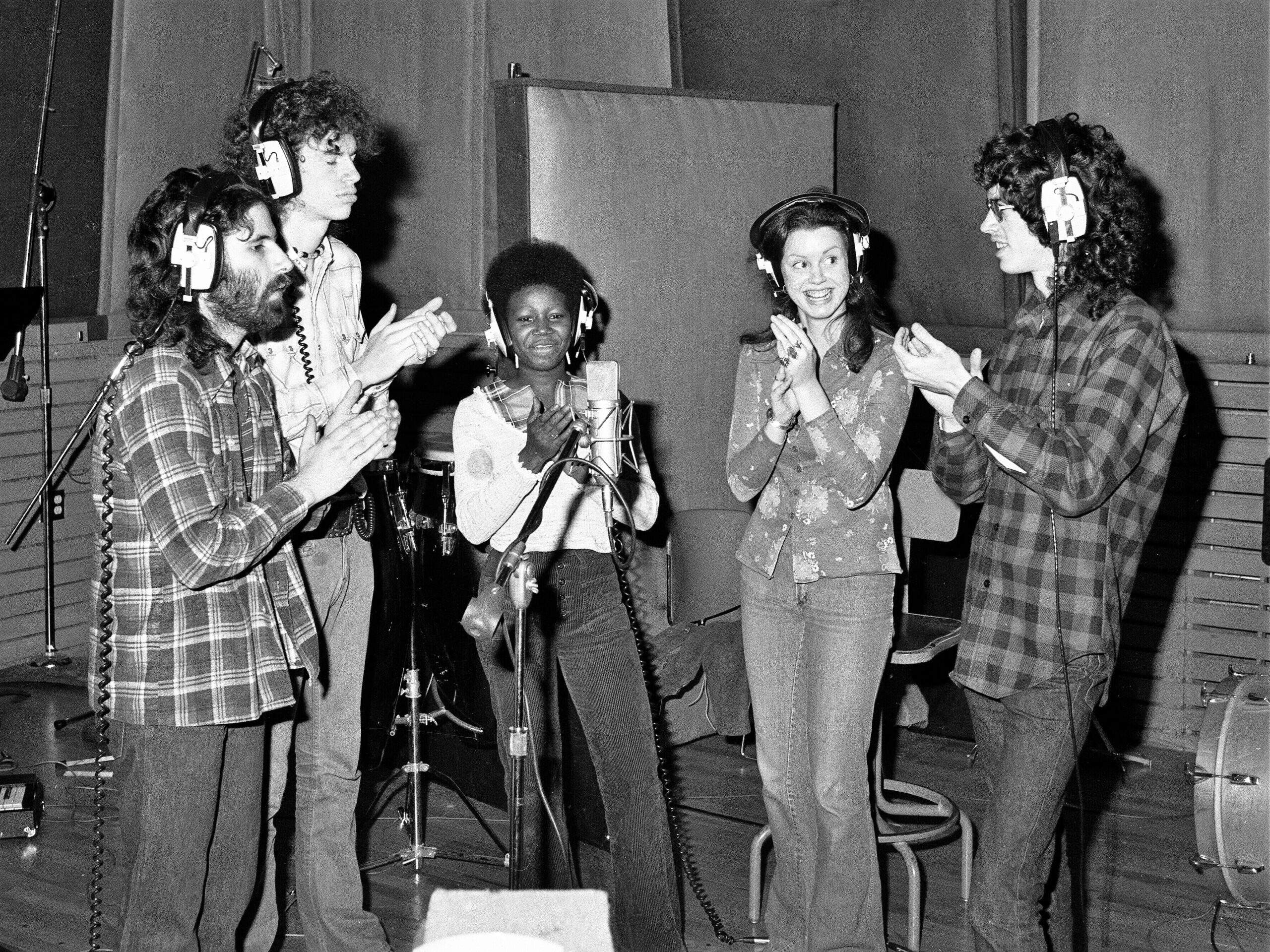
What kind of equipment did you use and who was the producer? How many hours did you spend in the studio?
Jack Hall: My memories about specific equipment aren’t very clear. This is my default reply, when I can’t recall certain details. We probably used our touring equipment for the most part, amps, guitars et cetera. I probably used my ’62 Fender Precision bass, plugged straight into the board. As I mentioned, the Hofner solid body bass had been stolen from the studio.
Initially Paul Hornsby was slated to produce this record. Paul was a Capricorn staff producer and pianist, but the band had artistic differences with him and he graciously stepped aside. So Capricorn staff, probably Frank Fenter, suggested Eddie Offord, a British producer with an impressive resume. The recording process went well with him as I recall, he had lots of experience with techniques like multi-tracking vocals and overdubbing harmonies and instrumental parts.
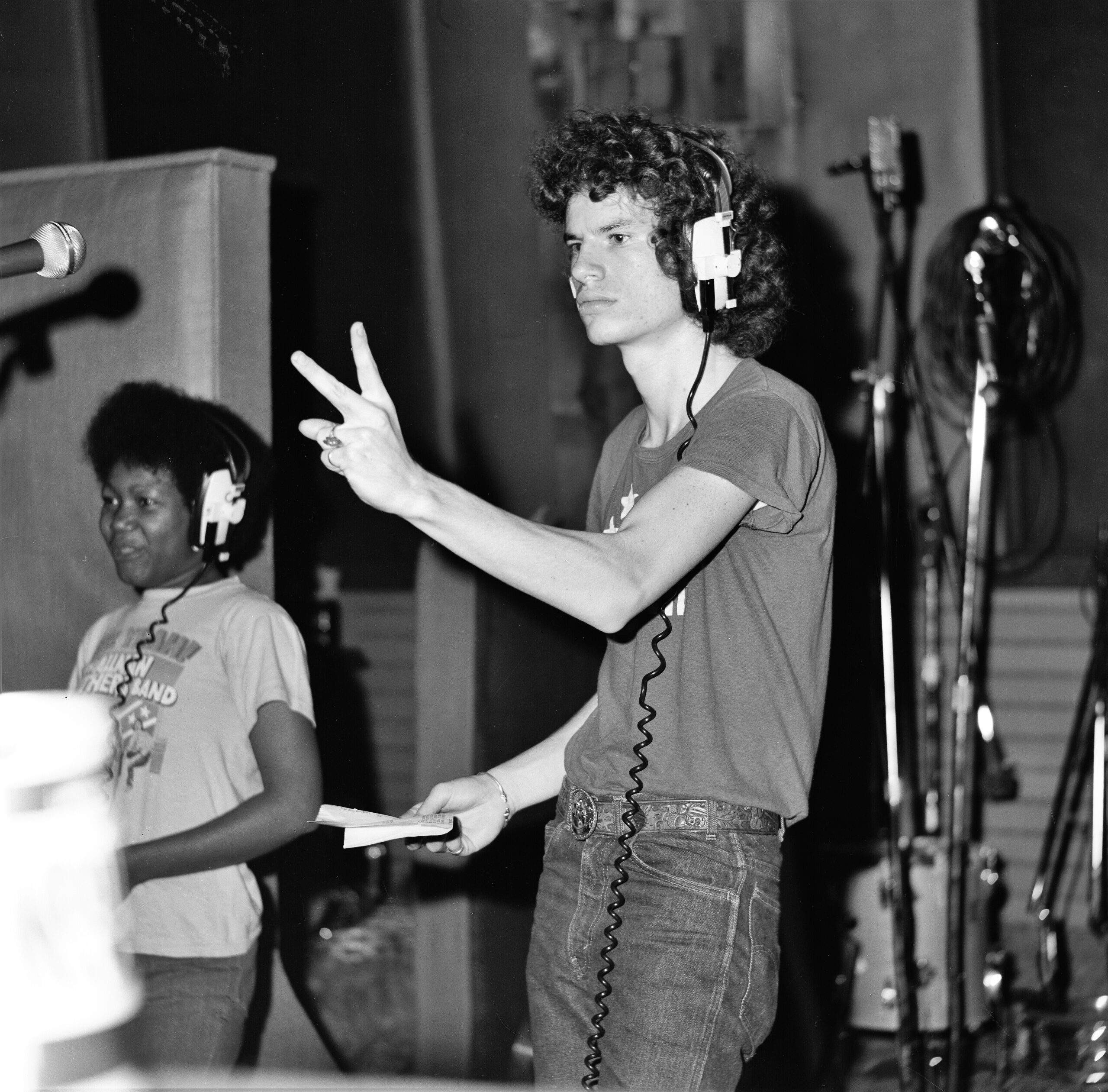
My equipment was essentially my ’70 Les Paul Deluxe and a Fender Twin amp the studio had as I recall. And a ’65 Gibson J45 acoustic. I don’t think I’d started playing bottleneck at that point. No effects, straight into the amp, but they would take a direct feed off of my guitar signal and record that by itself. I played the mandolin on a track.
The cover artwork is fantastic. Do you recall the name of the artist?
Jack Hall: We really got lucky with the art on this album cover. Flournoy Holmes, with the Athens Art Co-op/ Wonder Graphics, did the amazing artwork, relying on his varied interpretations of the band’s name. The most familiar connotation of “Wet Willie,” the wet finger in the ear, became the front cover. Flournoy went on to design many more iconic covers, including ‘Eat a Peach’ for the The Allman Brothers.
Rick Hirsch: An avant-garde artist named Flournoy Holmes from Athens if my memory serves me right. He’s received many accolades for his work, and I think he’s probably influenced a few people.
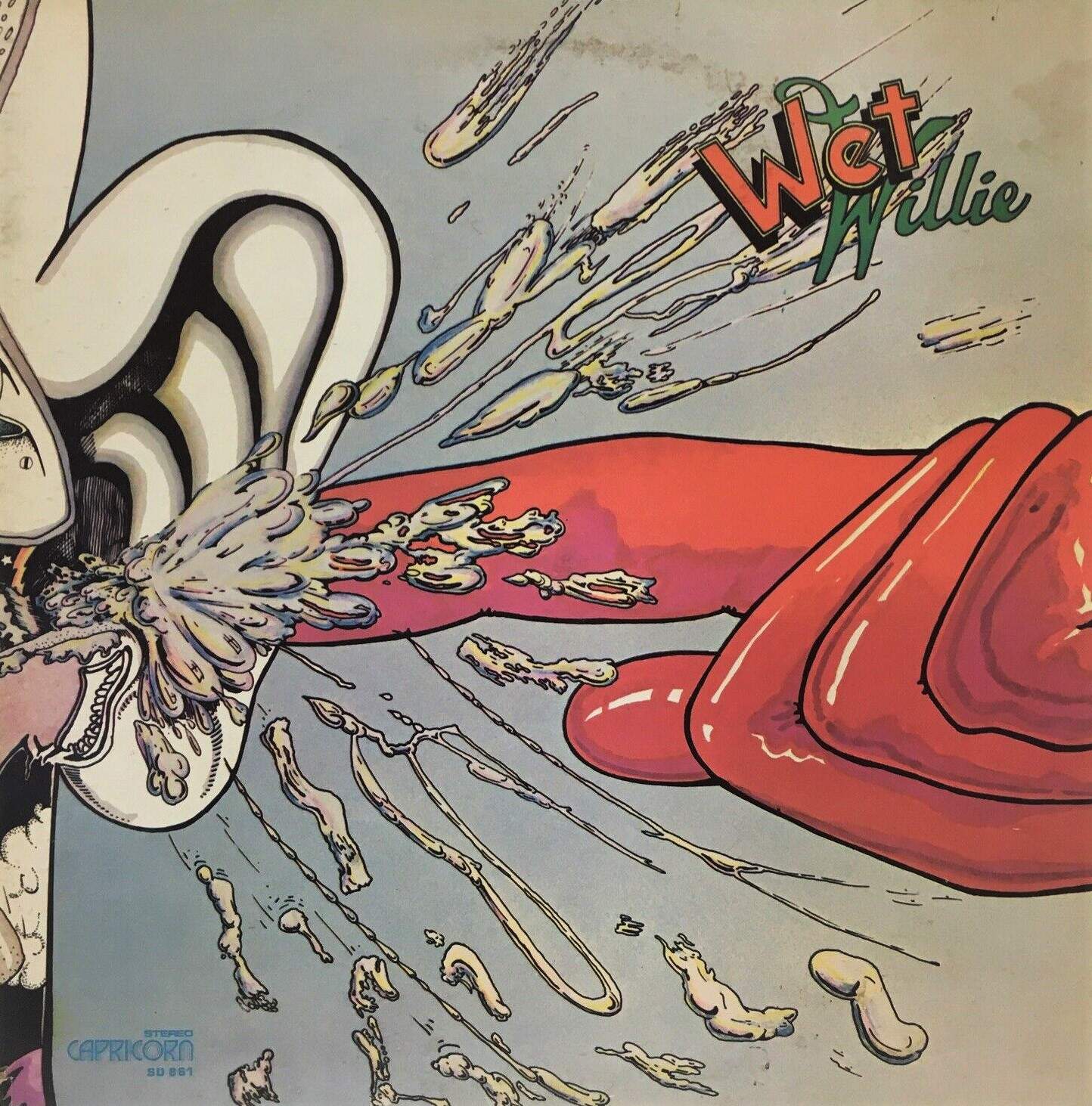
What sort of venues did you play? Where were they located?
Jack Hall: At first we played mainly in the southern states, mostly clubs and small concert venues. Again, my default reply, I don’t recall many specifics, but cities like New Orleans, Atlanta and Panama City come to mind as locations where we seemed to do well. Piedmont Park in Atlanta, Macon’s City Park and Tipitina’s in New Orleans stand out to me. As our reputation grew and we released more albums, our reputation naturally grew apace and we toured farther from home.
Rick Hirsch: Everything from topless bars to convert movie theaters to 50,000 seat stadiums … We played Carnegie Hall, Madison Square Garden, Cobo Hall (Detroit), Superdome (New Orleans, which we were the first band to hit a note there), Tampa Stadium, Jai Lea Florida, Willie Nelson’s Club (Dallas, I think. It was probably his first), Forum (Los Angeles), Whisky a Go Go (West Hollywood, CA), several Paramount theaters, and of course the iconic Pink Pussycat (Fayetteville, NC), and every state in the contiguous United States. I’m sure I have a few tour schedules hanging out somewhere around here I could look at.
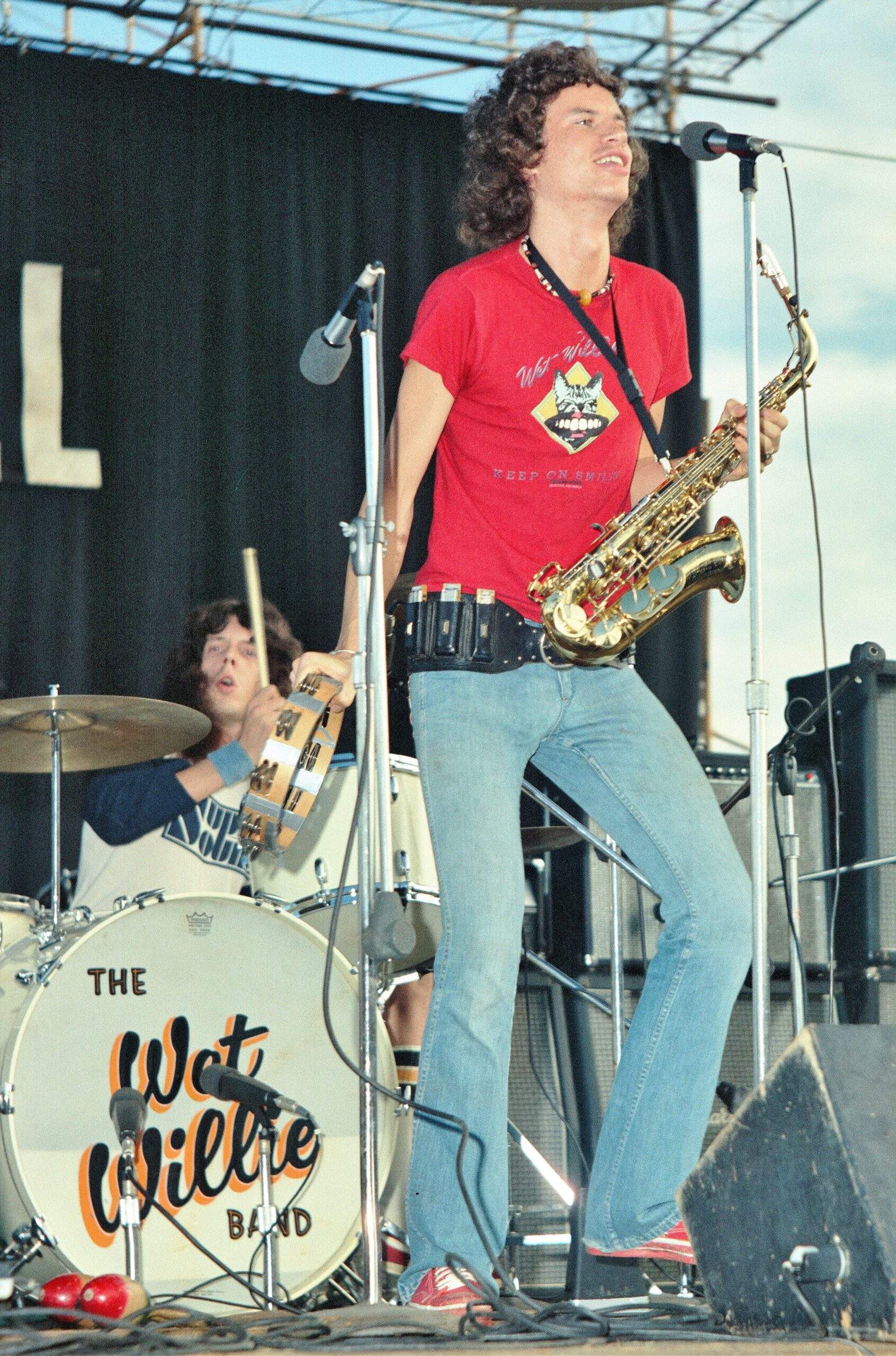
Did the size of audiences increase following the release of your debut?
Jack Hall: Naturally, as our albums were released and our reputation grew, so did the size and enthusiasm of the crowds. And as we started opening for The Allmans, Charlie Daniels, Lynyrd Skynyrd and other SoRock (southern rock) bands, the audiences started to grow exponentially.
Rick Hirsch: Absolutely!
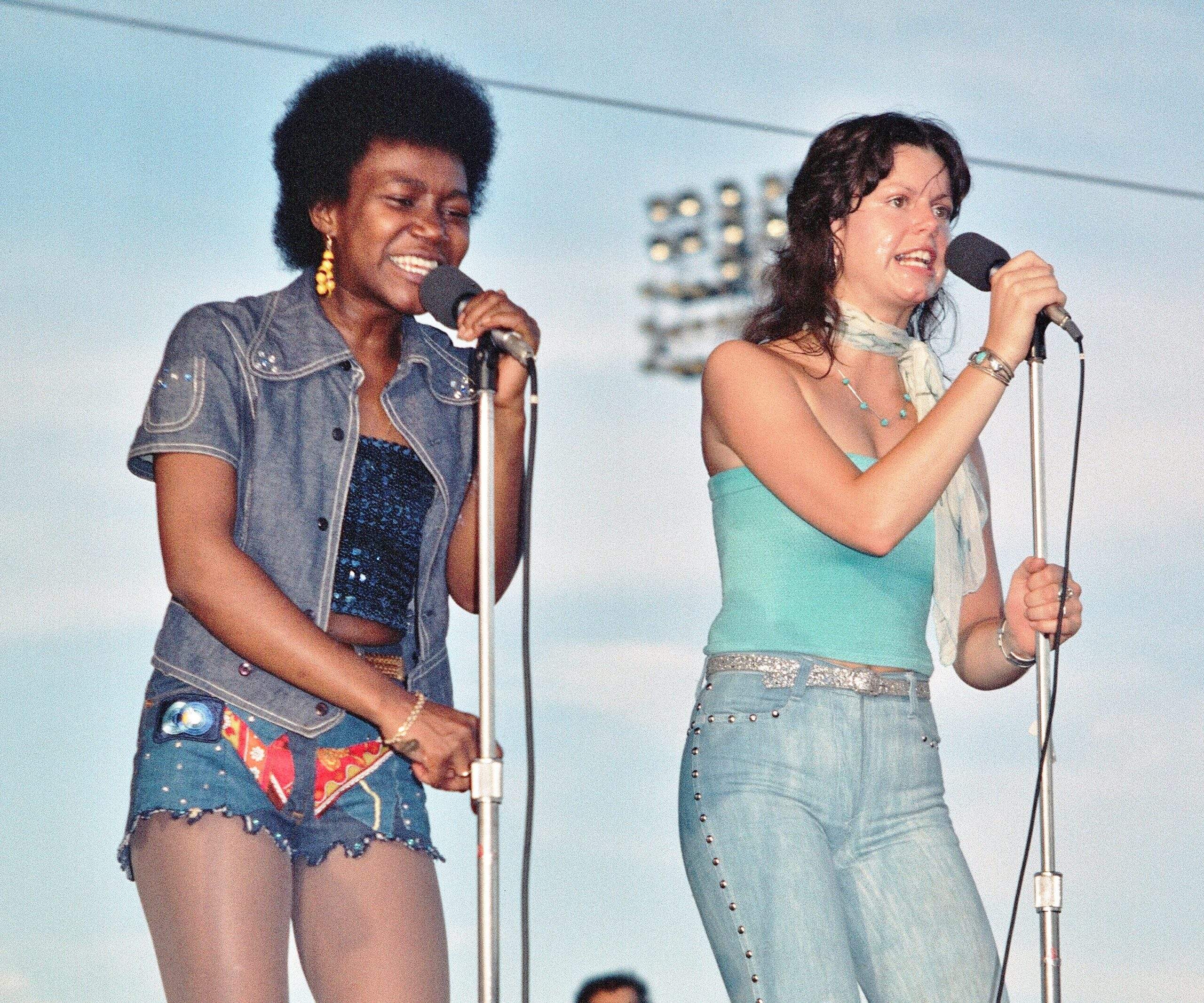
On your second album you have a twin guitar with Wick Larsen, was he a local friend from your hometown? Was he in any other bands or how did he join you?
Jack Hall: Hardwick (Wick) Larsen was a friend from the Mobile area, a very talented musician, well known to many local players. He had been a student at the University of South Alabama at the time Jimmy and I attended. I don’t recall why he wasn’t invited to join the band early on, but at some point between our first and second records, we asked him to come on board. He added nice guitar touches and contributed ‘Shaggi’s Song,’ a very poignant tribute to a former girlfriend.
Rick Hirsch: Wick Larsen was a schoolmate in junior high (middle school) and a neighborhood pal. We grew up terrorizing the neighborhood on bicycles and exploring like kids do. After high school we lost touch with each other with my going off to college. He moved to California I think. Neither of us really played guitar together in those days, oddly enough. But we were pretty tight as friends. When I came back to Mobile and discovered he’d jumped off into guitar and had become a great player, I was totally surprised! I think Jimmy and Jack had a band with him somewhere along the way. We added Wick to flesh out the band’s sound a bit. It was a cool experience being able to relate to each other as musicians after having all that time as kids. He was a deep cat and as all of us had his share of demons. I wish he’d have stuck around a little longer.
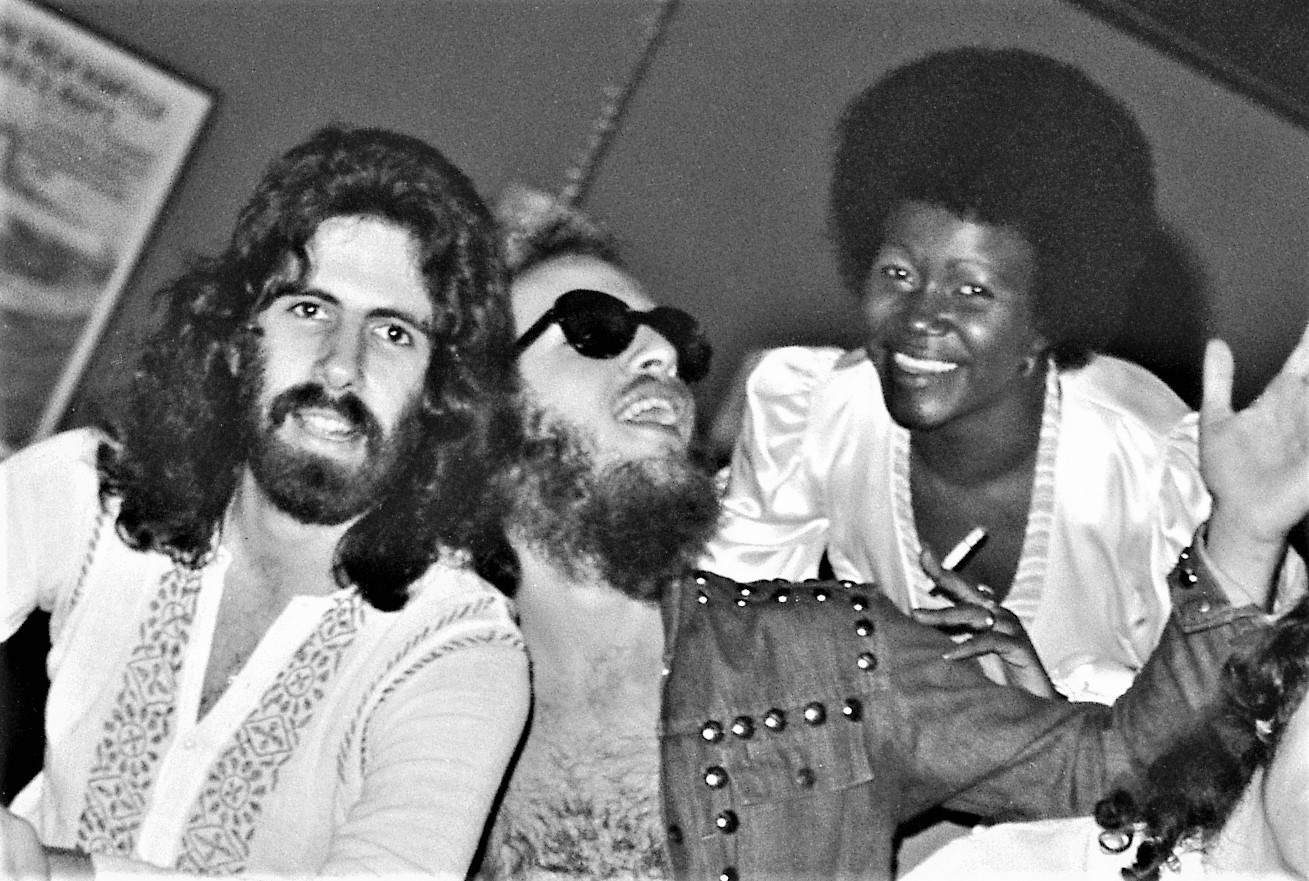
And Frank Friedman left the band or?
Jack Hall: Since Frank and Rick Hirsch had been frat brothers at the University of Alabama, I imagine Ricky can recall more specifics about Frank leaving Wet Willie. But as I recall, we had artistic differences as to the direction the band wanted to go and about the producer of the first album. I think Frank was more committed to Hornsby and sometime after the album was released, decided to go his own way. This led to the band asking Wick Larsen to join for ‘Wet Willie II’.
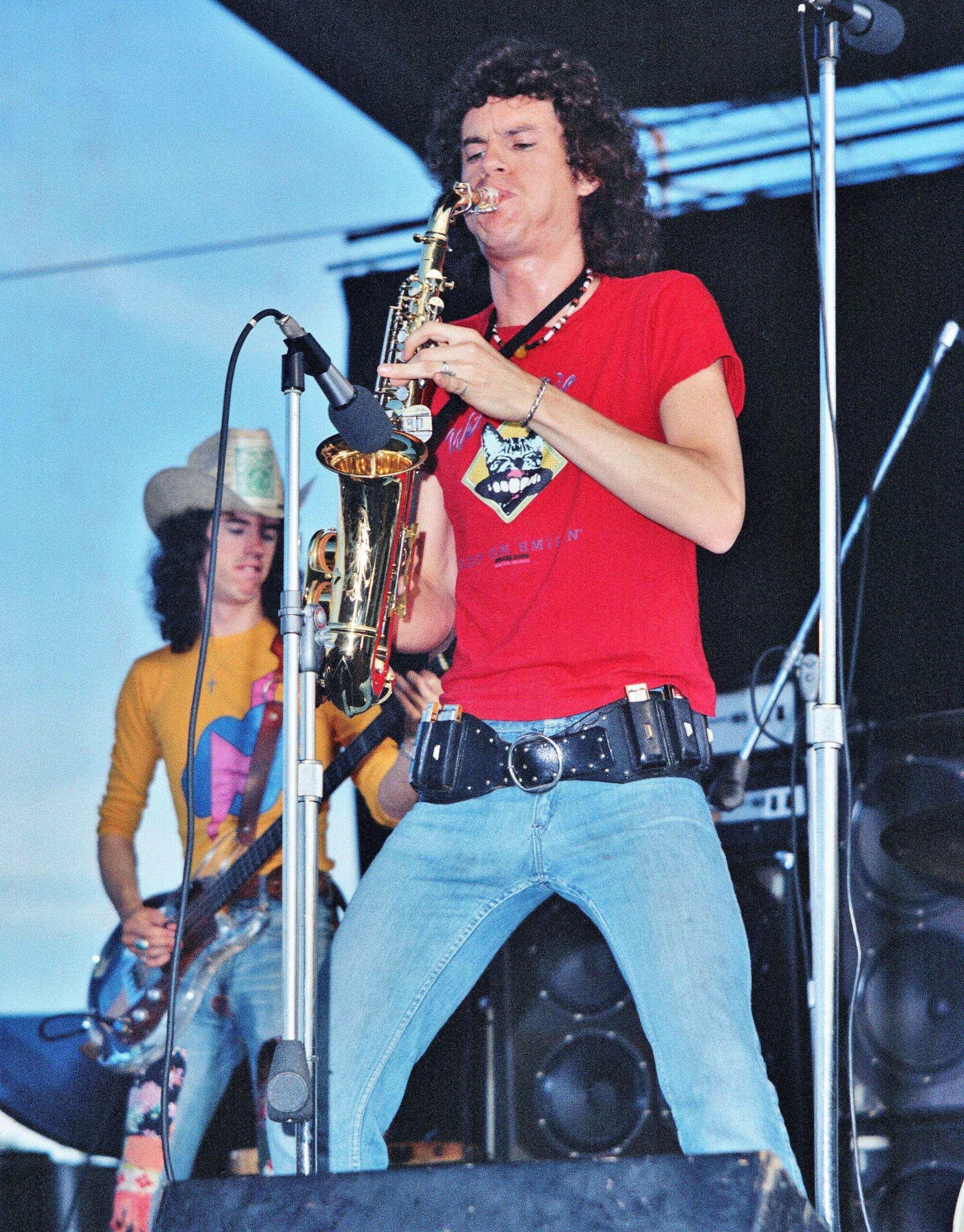
At the time the second album was recorded Capricorn was being renovated, so you basically used a few different studios? Was that annoying or it didn’t matter that much?
Jack Hall: When Wet Willie was scheduled to do our second album, Capricorn studios was undergoing a major renovation. So it was a natural choice to record in Muscle Shoals, at the famous Muscle Shoals Sound studio. According to the album credits, some work was also done at Capricorn, probably editing and mixing. I don’t remember it as particularly annoying to work in Muscle Shoals. We just set up camp at a local motel and got to work.
‘Wet Willie II’ was also produced by Eddie Offord. We had gotten comfortable working with him on the first record, and he produced all but two songs on this album, ‘Keep a Knockin’ and ‘Grits Ain’t Groceries,’ produced by Johnny Sandlin. ”Grits Ain’t Groceries’ also became one of our most well received live performance songs. In fact, four of the nine songs on the album were R&B and blues covers that went over well with audiences, including ‘Red Hot Chicken’ a band collaboration, based on a guitar riff Rick Hirsch may have ”borrowed” from Wilson Pickett’s ‘Ninety-Nine and One-Half (Won’t Do)’.
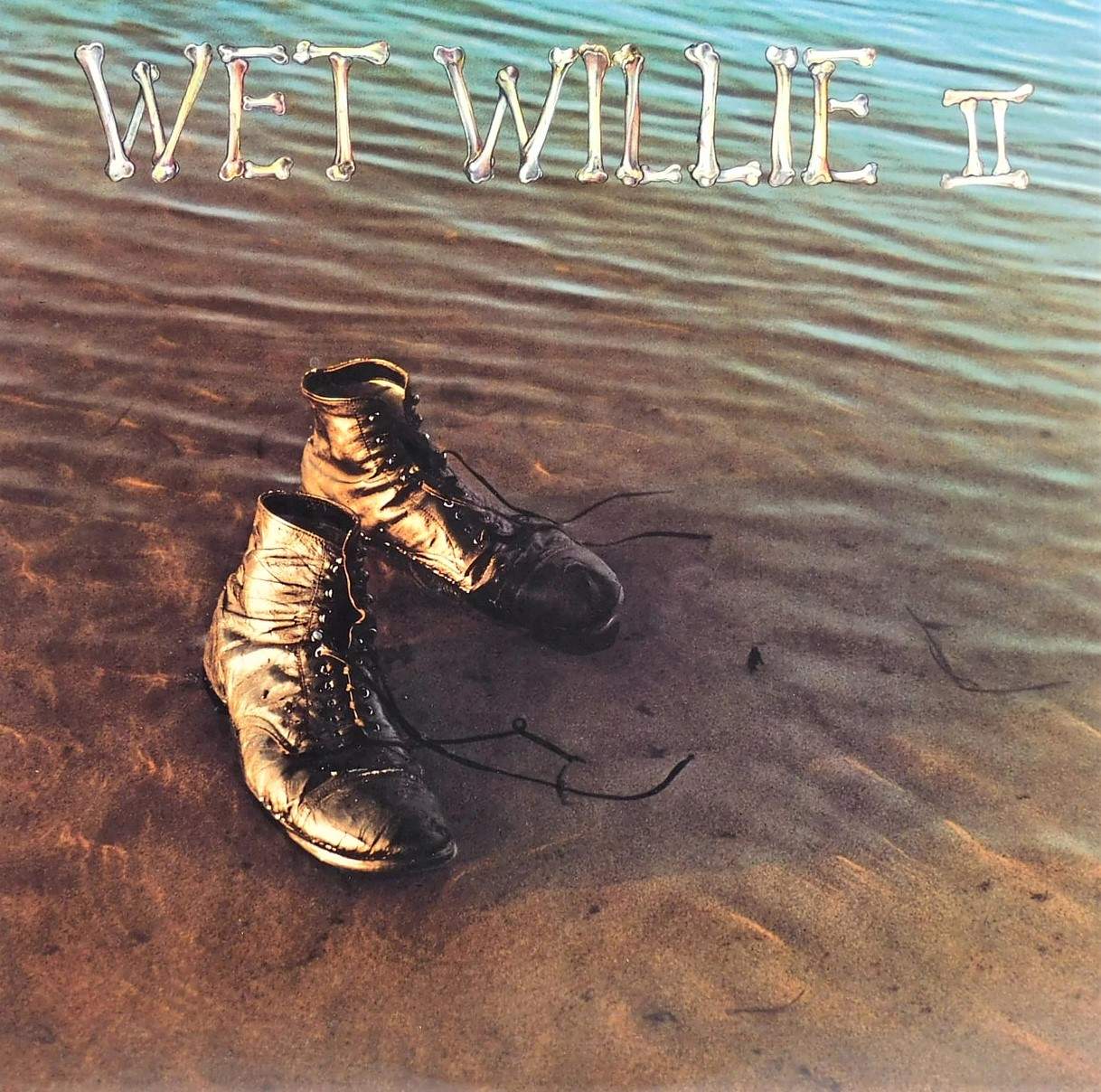
Rick Hirsch: That was an unexpectedly pleasurable inconvenience! We headed to Muscle Shoals to finish recording ‘Wet Willie II’ and checked into the now legendary Muscle Shoals Sound studio on Jackson Highway. I remember meeting Jimmy Johnson who was the original Swamper rhythm section guitarist who’d stopped by to check out our session. We were tracking an instrumental nod to La Carousel, a funky late night food joint in Macon titled Red Hot Chicken, when he walked in. He was hospitable and encouraging. I had the great pleasure of running into Jimmy several times over the last few years and gratefully had a chance to record him before he left us. He was a great pleasure to be around and is missed by many.
As far as the sessions, most of the second LP was tracked at Muscle Shoals Sound with Eddie Offord again producing except for a couple of tracks we cut at Capricorn which were produced by Johnny Sandlin. The difference between Eddie and Johnny was mostly to do with Eddie being a producer more so during the mix phase of recording and Johnny being very hands on during tracking and having a great sense of getting the rhythm tracks lined up for the best outcome. Eddie mic’d us up using his mic technique, left us to our own devices and then sorted everything out later. He would implement a skill set that I presume he built up while recording all those British groups. By the way, both Eddie and Johnny were highly gifted engineers.
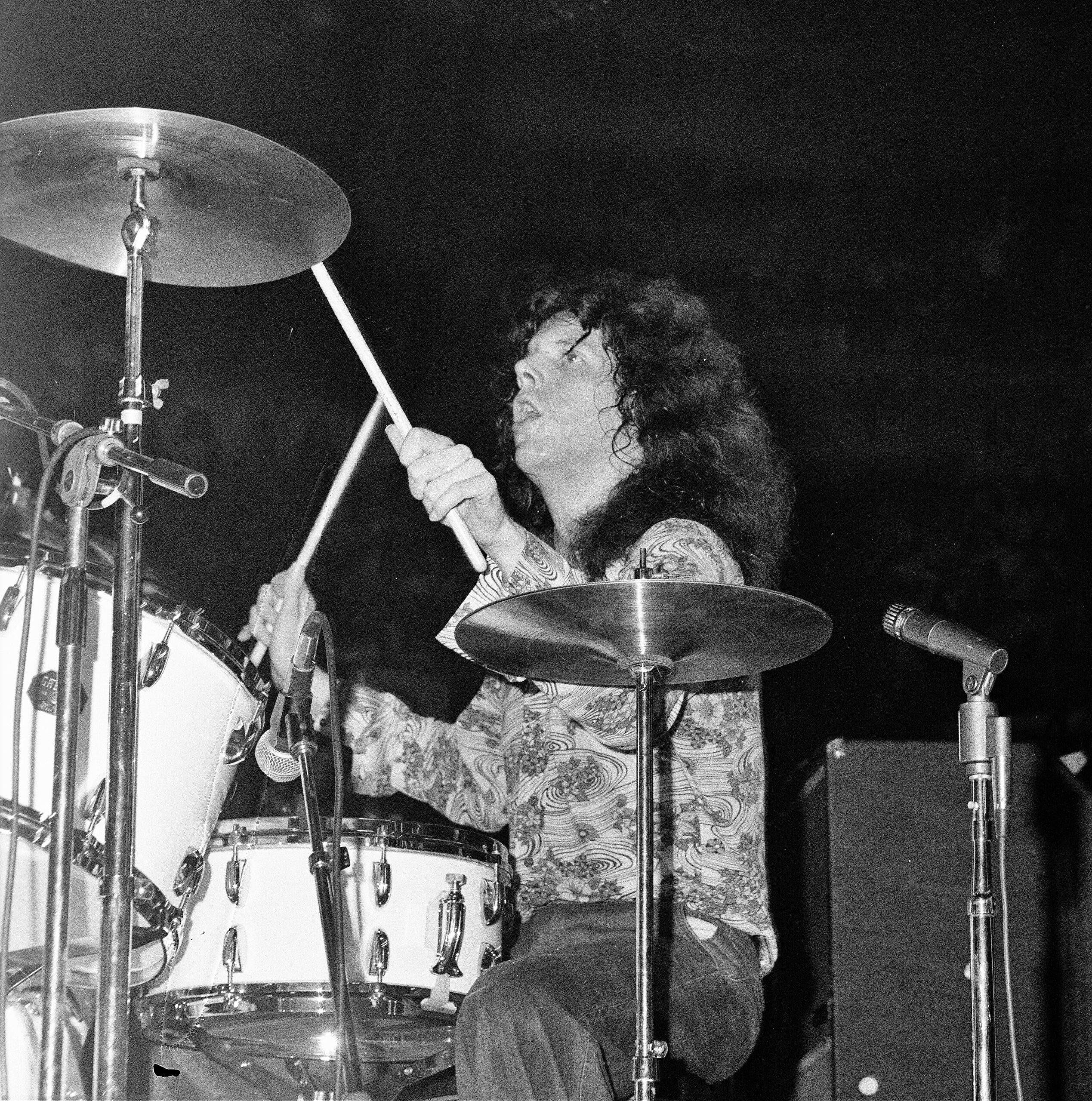
Please share your recollections of the sessions. What were the influences and inspirations for the songs recorded?
Rick Hirsch: The best two word description of Wet Willie’s music I’ve heard is “soul-rock,” possibly a direct connection to much of the R&B music we’d grown up with all our lives. Jimmy’s vocal style dictated a lot of the direction we could go musically, and I think we took advantage of that either consciously or subconsciously. This is germaine to what separates Wet Willie from the “southern rock” genre in my opinion. There are other musical elements that make up the band’s personality, but mainly having Jimmy as a vocalist was always a consideration whenever I wrote a song for the band.
Wet Willie’s evolution and growth from the first LP to the last is evident with each subsequent album; and personally I attribute that to our individual tastes as fans and to the eclectic music we listened to. I was getting into a lot of instrumental music from different eras but also modern or progressive R&B. Bill Withers, Curtis Mayfield, Marvin Gaye among others. And as a guitarist, I think I resonated with a funk vibe on a lot of things we did. James Brown’s music definitely found its way into my playing those chordal shapes his guitarists would use on a few of our songs. John Anthony was inspired by more orchestral rock forms, but make no mistake, he could funk out on his synths and keys. He added beautiful layers to our sound. Jimmy and Jack were raised with a measure of gospel and country music, and this was finding its way into their song contributions, but without compromising the R&B feel. In any case the blues could be found threading its way through all of it.
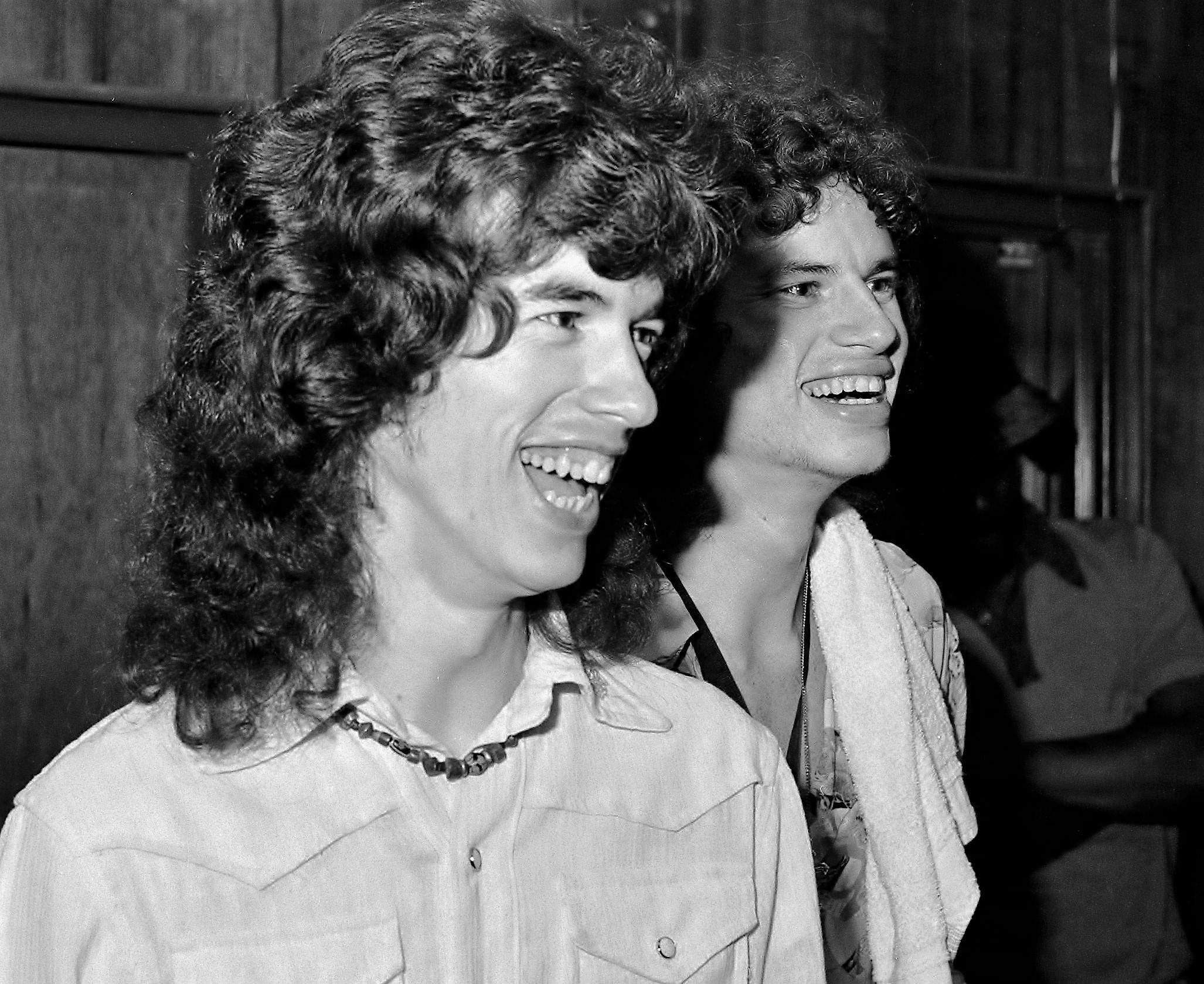
Would you agree that you were first and all a live band and to really know it’s all about you had to see you play. Those of us that couldn’t have the release of ‘Drippin’ Wet Live’ available. What was it like to play those numbers that got on the live album?
Jack Hall: Wet Willie was indeed best heard live and ‘Drippin’ Wet Live’ finally captured the raw power and energy of our live shows. It’s unfortunate this album wasn’t available in some parts of the world. Led by Jimmy’s powerful vocals, sax and harp, and with a tight and funky rhythm section and Rick Hirsch’s stellar guitar work, the band has been described as cooking up a hot and potent gumbo of soul, R&B, blues, and gospel. ‘Drippin’ Wet Live’ was recorded over two nights at the Warehouse in New Orleans, culminating in a New Years Eve set before an electrified audience, as we opened for The Allman Brothers. To me, this record captures the raw intensity of a young band, like a powerful well-oiled machine running at full capacity. Even the sound of fireworks, captured on tape, couldn’t slow this engine down.
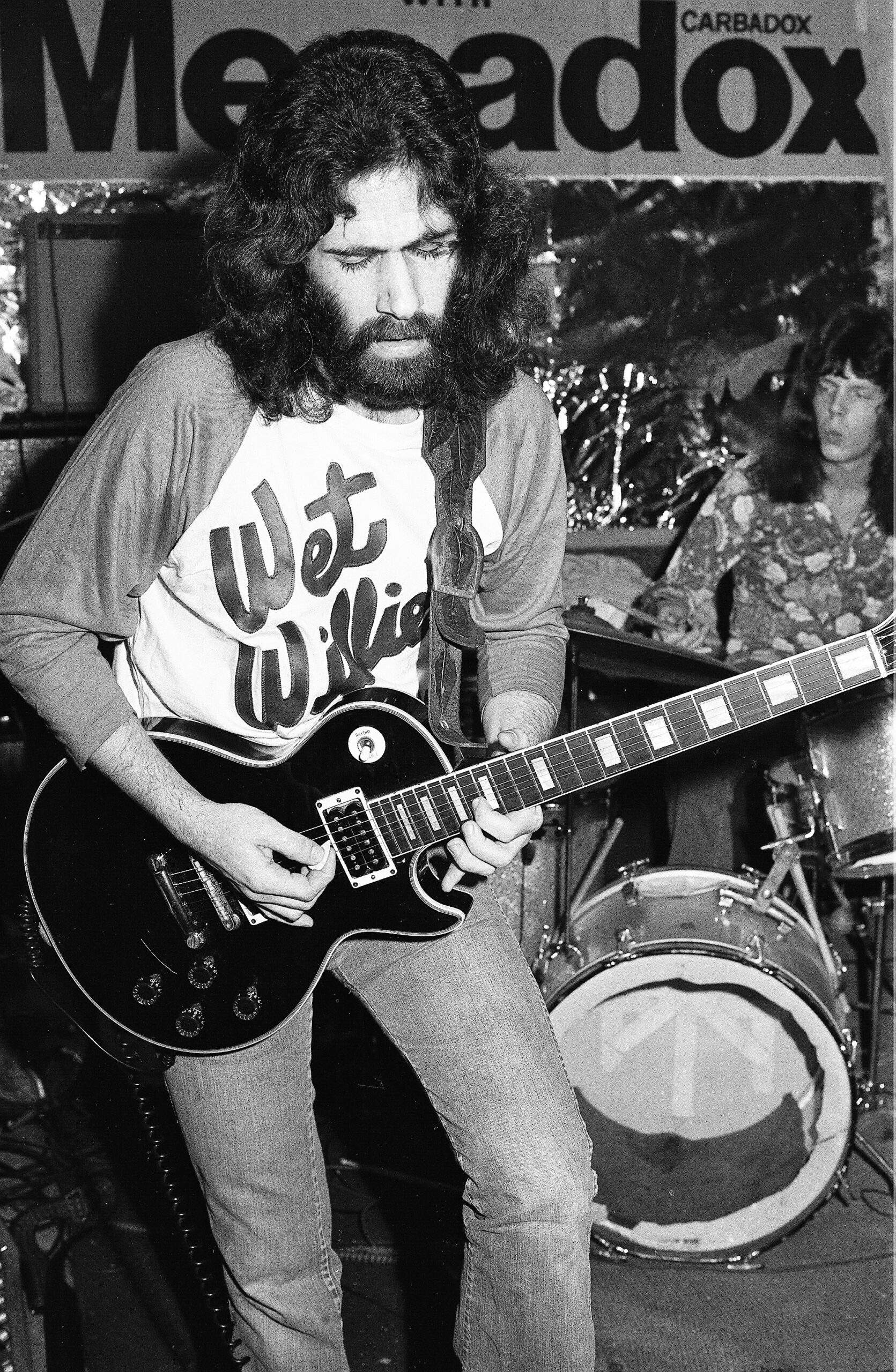
Rick Hirsch: There is a lot of truth to that, but I think as Wet Willie progressed, we became more and more comfortable in the studio. Had we had more time to explore the studio setting back then, I’m pretty sure we would have come up with some good things.
Our stage energy was very natural and organic. Our songs evolved out of spontaneity, and if we hit on something we liked, we’d keep it in. ‘Drippin’ Wet Live,’ the first live LP and third Wet Willie release was recorded at the same venue, The Warehouse in New Orleans, where we saw the very early Allman Brothers Band while still living in Mobile. Out of all our albums, I am more frequently contacted about ‘Drippin’ Wet Live’ than any of the other albums by far. The band consisted of the original nucleus and five members of Fox, and we were very tight musically by then, meaning our songs had had time to develop to a stage that was peak high energy but not burned out.
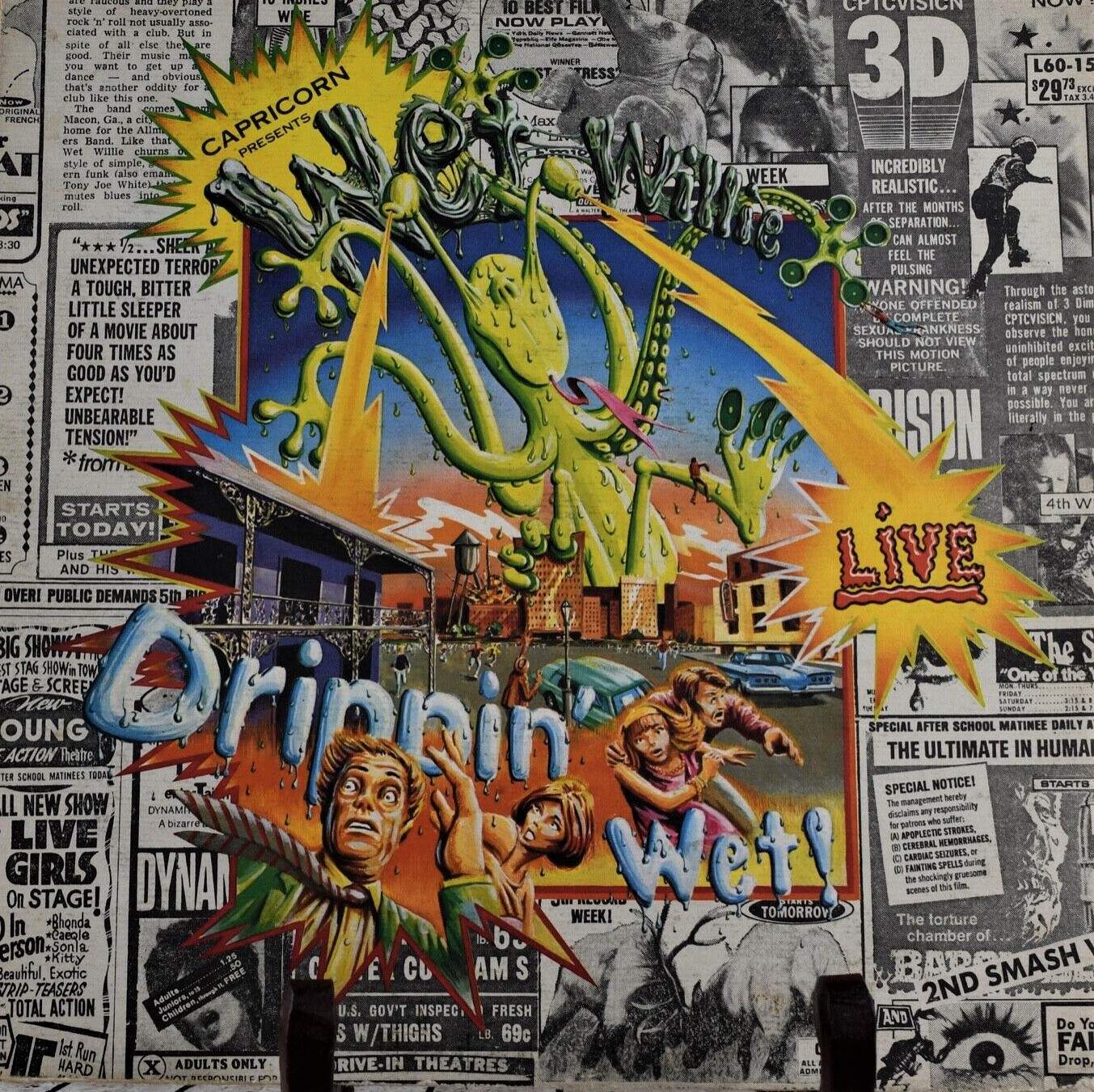
It has always been a bit elusive to me as to why, but most guitarists who refer to Wet Willie invariably ask about my equipment, specifically on ‘Drippin’ Wet Live’. I honestly believe my tone improved vastly in the LP’s beyond that one. I shouldn’t really complain because it is thoroughly a compliment that someone was listening to that degree. To answer the question, the guitar heard on ‘Drippin’ Wet Live’ is a 1970 Sunburst Les Paul Deluxe with mini-humbucking pick-ups. The amps are two Ampeg V4’s going through 4 4×4 Marshall speaker cabinets with 4 12S JBL in each. I played through a Cry-Baby Wah pedal on one song. Otherwise, it was straight into the amps and any gain or overdrive was achieved with the guitar’s tone and volume controls. An extremely loud rig, I will say the tonal characteristics were very unique and distinguishable.
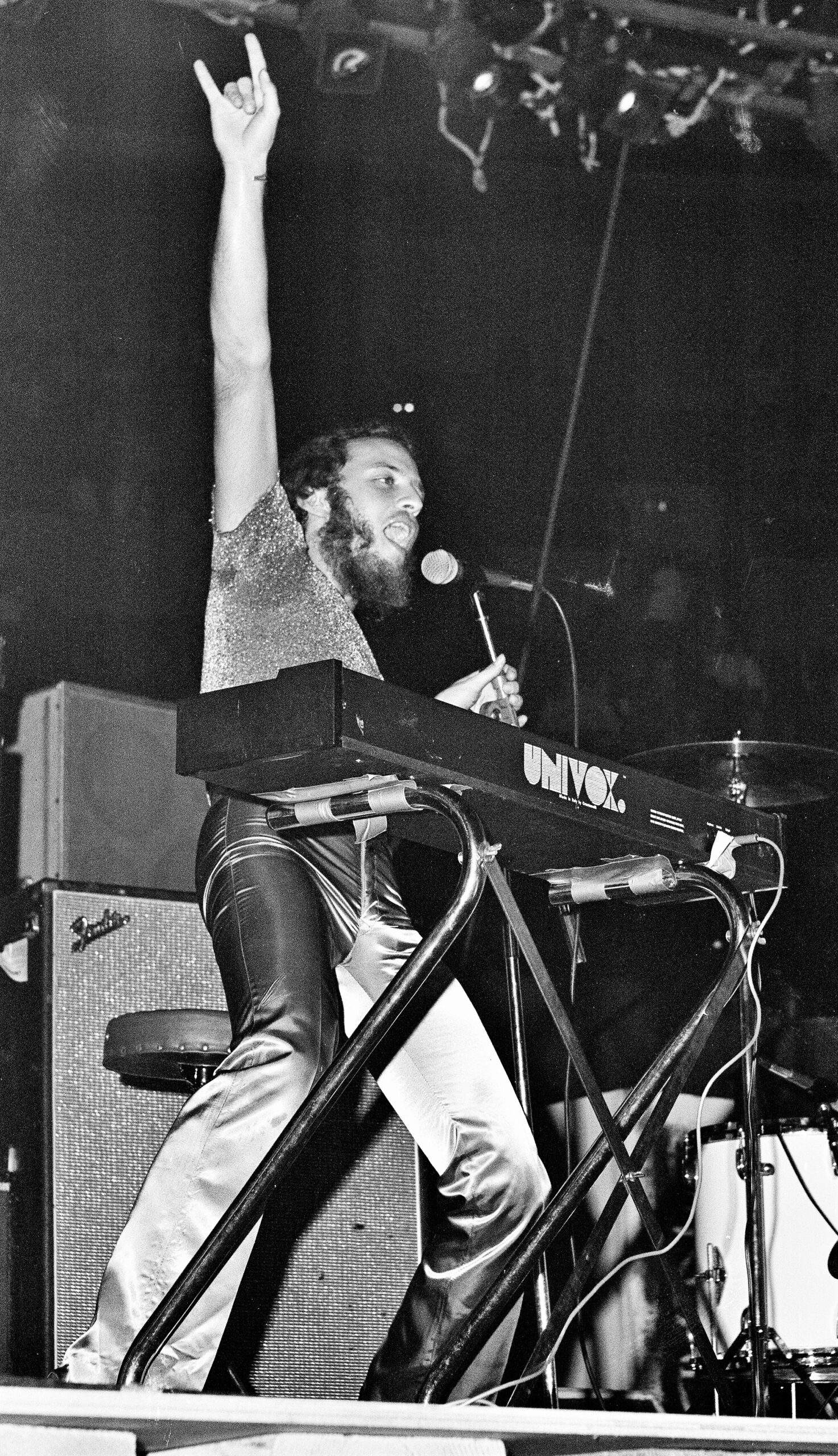
‘Drippin’ Wet Live’ cover artwork is quite similar to debut album cover artwork. Who was the artist behind it?
Jack Hall: Since we were almost constantly on the road, we were unable to find time to consult with the record labels about cover art. These decisions were left mainly up to the labels and their art departments. But the ‘Drippin’ Wet Live’ cover is probably the one I liked least of all of them. Whereas our debut album had a funky, semi-psychedelic, Zap comics vibe, this cover seemed thrown together, with no real connection to the band or what we were about. I don’t have access to the album credits, so don’t know who the artist was.
But I distinctly remember being herded into a shower for the back cover shot, where we were soaked to the skin, so we could appear ‘Drippin’ Wet Live’ – not a great experience. The other guys might remember it differently…
Rick Hirsch: It was similar, but I’m pretty certain someone else did that.
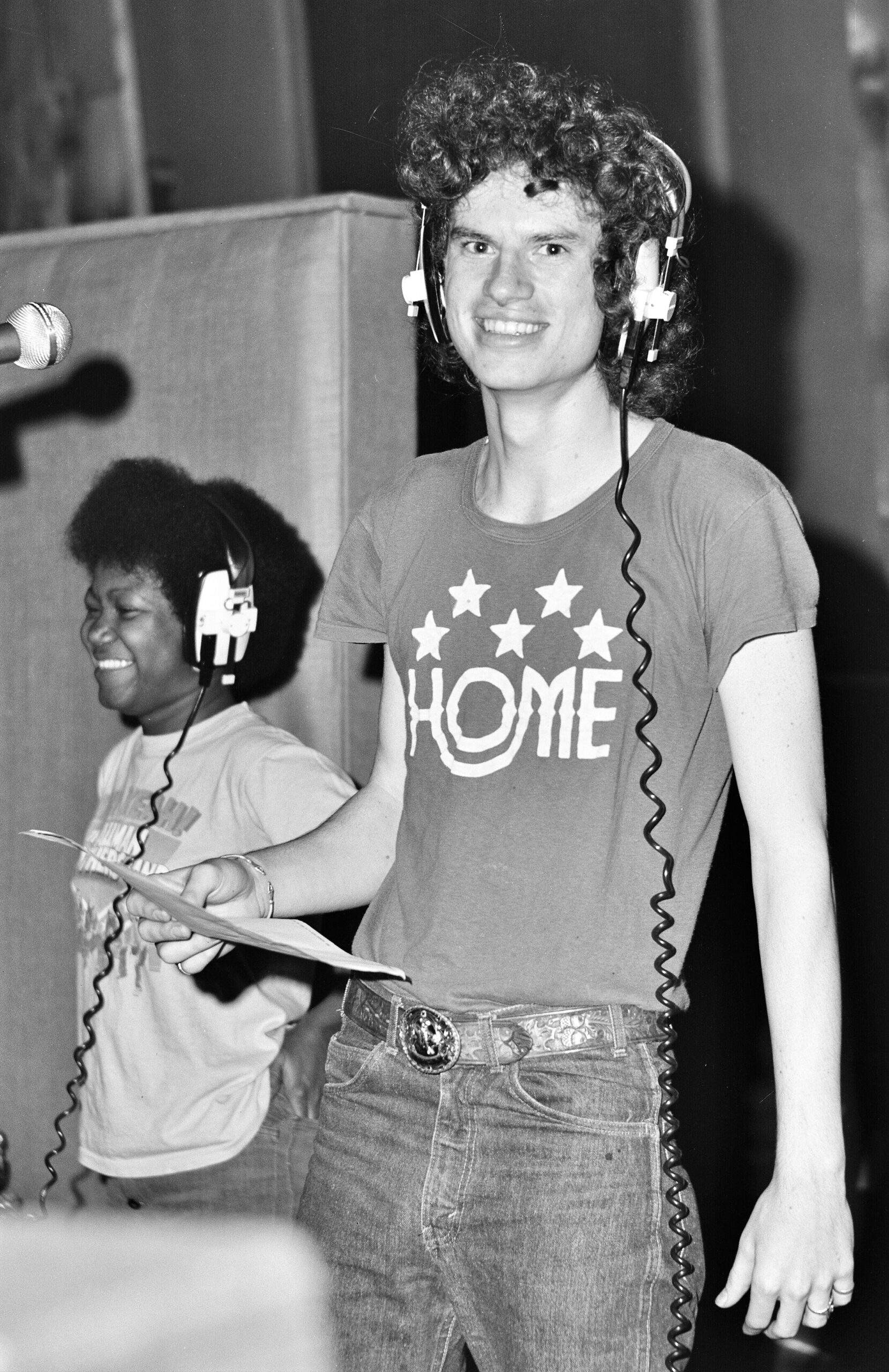
You are playing a really fantastic mixture of blues, soul and funk… was that intended from the beginning or it just came naturally for you guys?
Jack Hall: Our sound seemed to evolve naturally, beginning as Fox in our pre Wet Willie days. Like a lot of American musicians, we were introduced to the blues second hand from British bands like Cream, Led Zeppelin, and John Mayal’s Bluesbreakers. Later on we discovered original versions of songs like ‘Born Under a Bad Sign’ and ‘Crossroads’ and started incorporating these influences with R&B, soul and gospel for the potent, high energy ”gumbo” that Wet Willie became known for.
Rick Hirsch: It was us being us. Nothing was contrived or planned. Just head arrangements with subtle little tweaks here and there. If it worked, we kept it! I’m sure you know the term “heads up” as applied in a band situation. And a lot of what we did was simply tracking each other onstage and responding to what was going on musically. It’s hard to believe how far a song will develop from what it was at its inception, but in my opinion if that isn’t happening, then neither is your band. And I’ve been on both sides of that fence.
Speaking of gigs, what would be the craziest gig you ever did?
Jack Hall: We did many memorable gigs, and the band members probably have their own favorite “craziest” ones. For me it was probably in New Orleans, again one of our favorite cities, at New Years I believe, after the ‘Keep On Smilin” had hit the charts. We were in a festive mood and rented costumes for this show: top hats and tails for some of us, even a Civil War outfit! The crowd was very boisterous, almost manic, and gave back the energy the band was putting out. New Orleans based rock photographer Sidney Smith took many iconic shots of Wet Willie through the years, including great photos from this show.
Rick Hirsch: Assuming you are asking within the context of Wet Willie, the answer would be a show in Washington, DC at RFK Memorial Stadium with The Allman Brothers and The Grateful Dead in front of around 50,000 people. We were put on notice that the Dead’s roadies were notorious for carrying those colorful plastic water guns with LSD laced water that would permeate the skin. I personally was not going to test the theory and walk out in front of that crowd, tripping my brains out and staying close to the tour bus. The backstage scenery was quite the scene and replete with characters who’d obviously started ahead of time … ladies doing their flowing scarf dancing, et cetera. We were on our game that day and did a great show. The energy swap between band and audience in a situation like that is absolutely palpable and electric. People have asked me in the past if I was nervous to get up in front of that many people and no I was not. A mass of people that huge becomes one singular organism, and it can be a beautiful thing entertaining that organism.
“Recording ’Keep On Smilin’’ was a milestone in Wet Willie history”
What was it like to record your third studio album, ‘Keep On Smilin”?
Jack Hall: Atlanta documentarian James Cool did a terrific short form doc about the origin of ‘Keep On Smilin” and the recording sessions. Hopefully you can use all or parts of it for this interview. Much of the doc focuses on renowned producer Tom Dowd, and how he guided us through these recording sessions. As depicted in our doc interviews, working with Tom was like a master class in recording and arranging techniques. He could focus on every microscopic detail, measure by measure, note by note at times, and helped each of us hone our parts so they meshed well.
Even though he was much more experienced, Tom was very patient and never condescended to anyone. We can thank and give major credit to Tom Dowd for the success of ‘Keep On Smilin”.
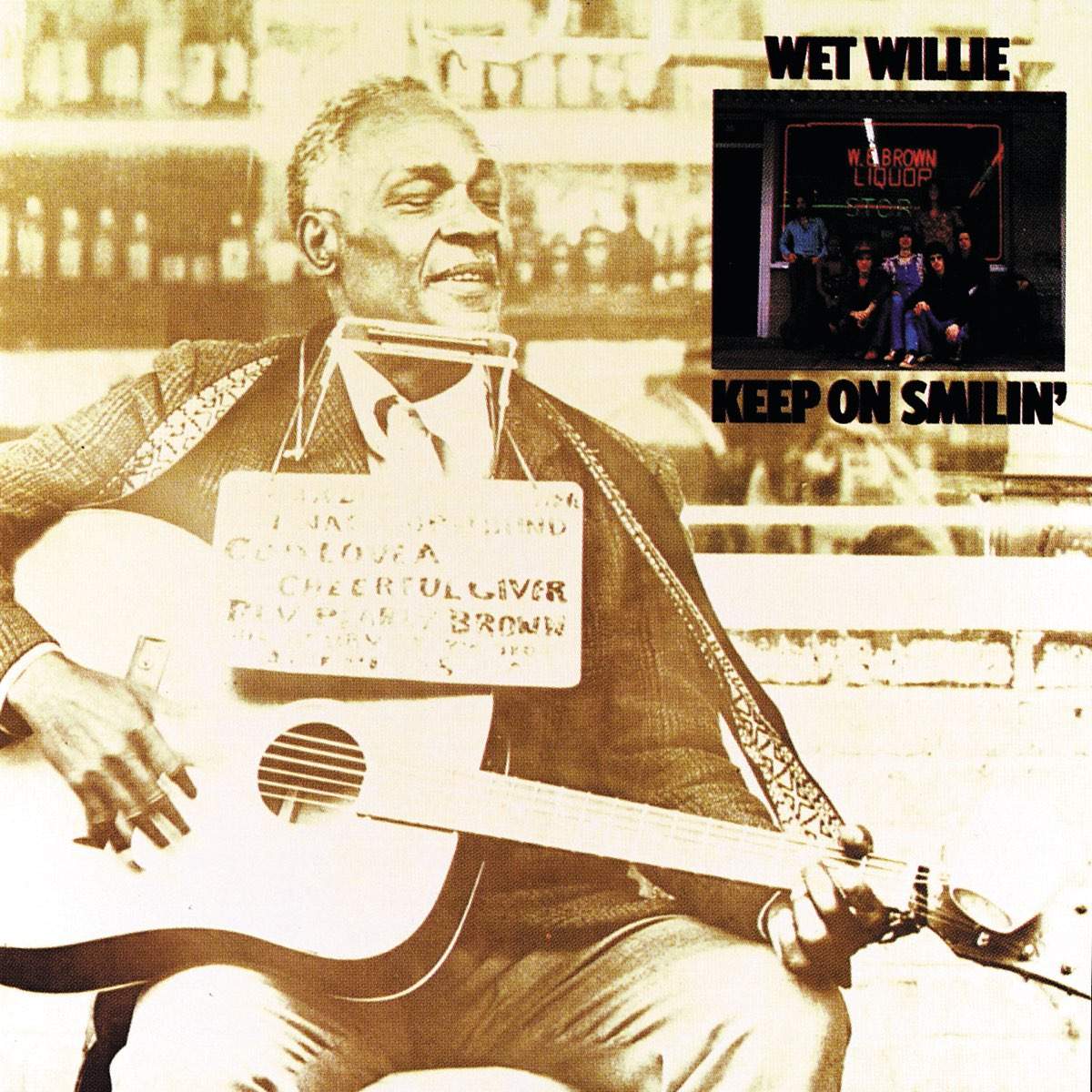
Rick Hirsch: Recording ’Keep On Smilin’’ was a milestone in Wet Willie history of course. I think it was, first, because we had several new songs to record that were ripe, and, second, Tom Dowd entered the picture as producer. There’s so much to be said about Tom Dowd and his impact on Wet Willie. As I’d mentioned about a hands-on producer earlier, Tom was definitely right in there and was such a helpful force in getting these songs straightened out and ready to track. Much of his focus aside from picking the songs out of what we had that would ultimately be part of the album was digging into every tune and understanding where everyone was at rhythmically. He literally heard everything that was going on in a mathematical way in terms of beats and measures. And his ability to ferret out the subtlest problem was something I’d not seen before. For example, he might tell someone who’s part came in on a downbeat to keep the part but come in on an upbeat, and it would dramatically change things for the better. He just had the gigantic ear for it, and we learned a lot from his generosity in sharing it with us. Tom also produced the follow up to ‘Keep On Smilin’,’ the ‘Dixie Rock’ album.
The hit single ‘Keep On Smilin” reached No. 10 on the Billboard Hot 100. Did it have a big impact on the band attention / press-wise?
Jack Hall: The success of ‘Keep On Smilin” had a huge impact on crowd response and popularity of the band. So requests for print and radio interviews increased as the song reached No. 10 on the US charts. We did in-studio radio interviews and in-store promo appearances from coast-to-coast as a result.
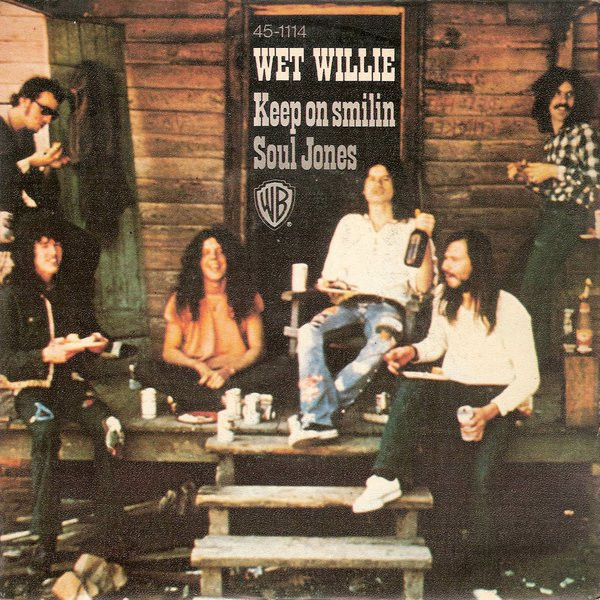
I clearly recall hearing our song on the radio way out in Portland, OR on our first coast-to-coast tour with Grand Funk Railroad, we were thrilled to hear our song so far from the South.
Rick Hirsch: Yeah it was huge and still to this day is a major anthem for the band and for Jimmy when he does his solo gigs. By the way, the song may have reached #10 on the Billboard charts, but it was #1 in many markets not only in the South but all around the country. I will never forget being in the tour bus heading up the New Jersey Turnpike and hearing ‘Keep On Smilin” and ‘Band On the Run’ back to back on AM radio. You couldn’t turn on a radio without hearing it.
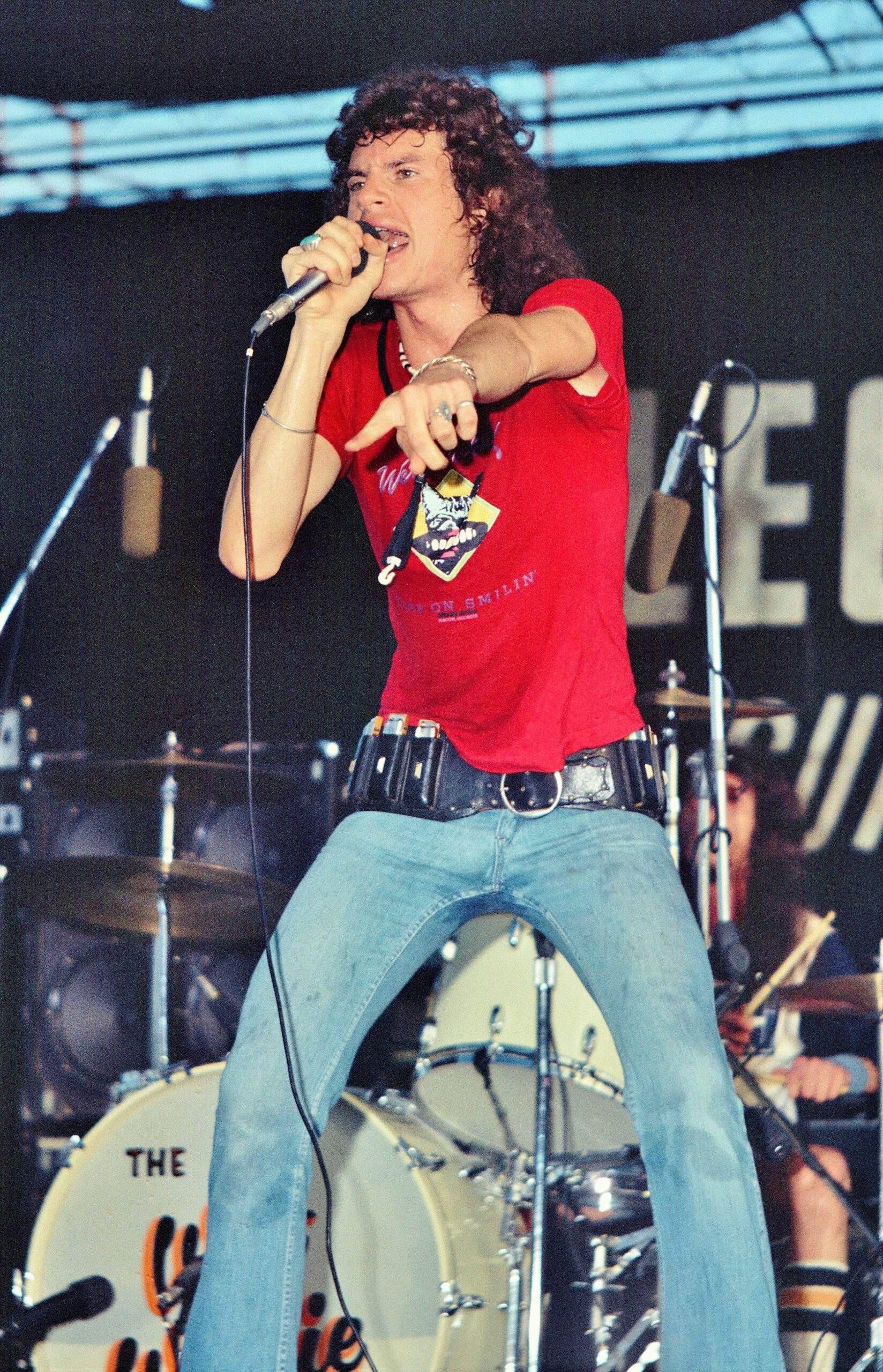
What inspired the album cover artwork?
Jack Hall: The Reverend Pearly Brown was a well known presence on the streets of downtown Macon back then. A blind singer and guitarist, Pearly was often seen singing with his guitar and a sign around his neck that read “God loves a cheerful giver.”
So the Capricorn staff suggested featuring Rev Pearly on the ‘Keep On Smilin” cover and sent a photographer to take his picture. The inset shot of the band was taken in front of a downtown liquor store, as I recall. To me it seemed like an afterthought; this photo would’ve been better as the back cover instead of the street sign shot shown there.
The record label neglected to get Pearly Brown to sign a waiver/release for the use of his image. He later sued the record company and won a settlement.
Rick Hirsch: On ‘Keep On Smilin’,’ there is a picture of us sitting in front of a liquor store (for effect, I’m sure) in downtown Macon that is inset on a full sleeve backdrop and photo of Rev Pearly Brown, a blind street singer and guitarist who was local. He had a sign he wore around his neck that said something close to “God loves a cheerful giver…” I don’t know who designed the cover, but have to assume they made a connection between Rev Brown’s persona and what was decided to be the title of the album, ‘Keep On Smilin’,’ as it was pretty built in from the image that he had a pretty tough life and the message is, well, “Keep On Smilin’.”
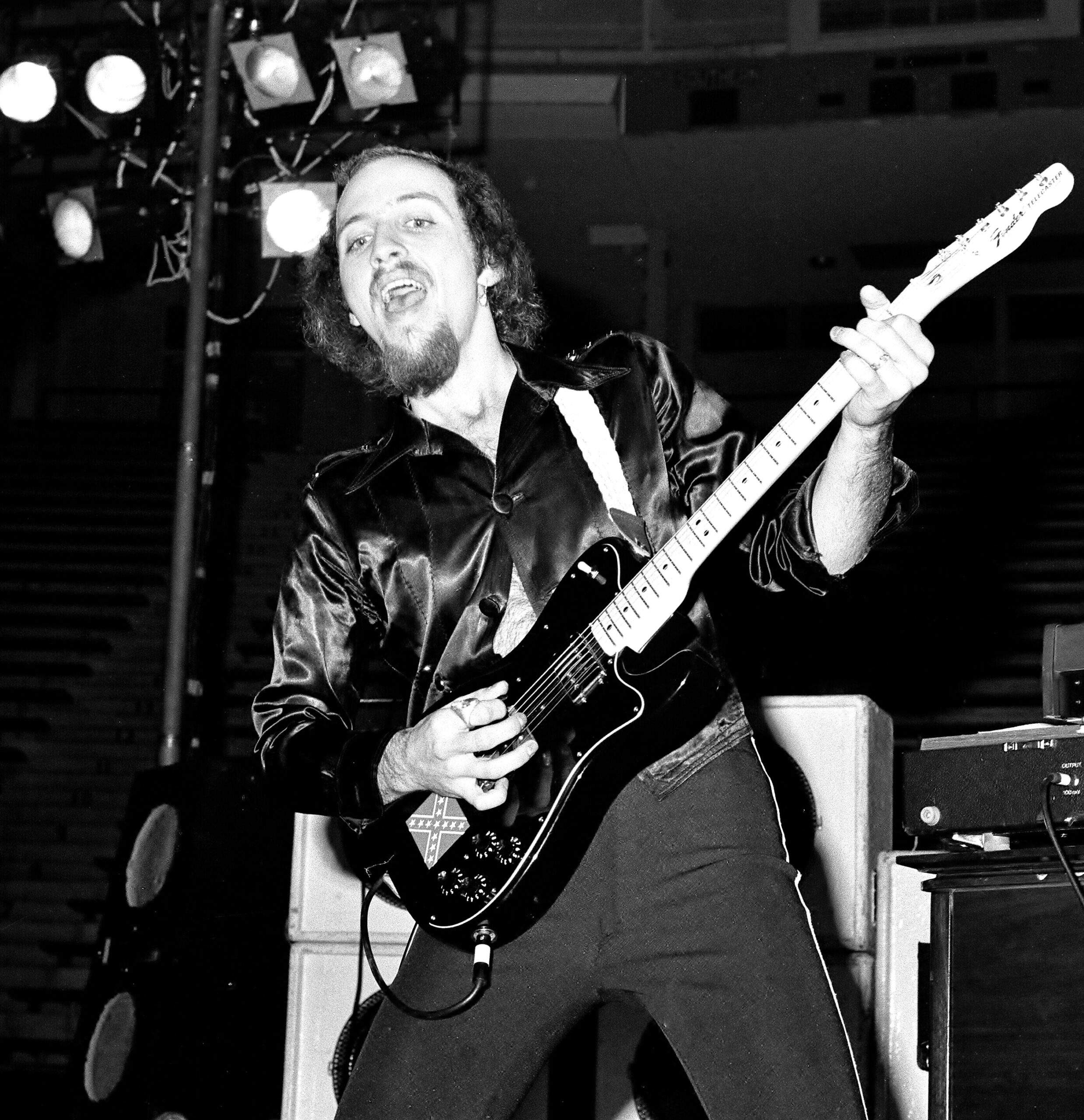
Your sound changed quite a bit on ‘Dixie Rock’ and ‘The Wetter The Better’ with the arrival of second keyboardist, Mike Duke. (commentary please)
Jack Hall: We were hoping for a follow-up hit after ‘Keep On Smilin” did so well, and as I remember it, Lynyrd Skynyrd had just blown up nationally with ‘Sweet Home Alabama. So we advertisedly tried writing a song that was more guitar oriented and powerful than most of our previous recordings. The result was ‘Dixie Rock,’ which became a staple of our live shows and went over well with audiences, especially in the south. There was no conscious effort, in my mind, to overhaul the overall sound of the band, and I think the rest of the songs on the album underscore this. One was a tribute to our Hall family gospel roots: ‘He Set Me Free,’ which featured piano and vocals by ‘Mama’ Hall and our three sisters: Donna, Cindy and Susie.
After ‘Dixie Rock,’ and, again, touring almost constantly, we needed new material. Mike Duke’s reputation as an accomplished singer, keyboardist and songwriter had preceded him. We’d heard about him from other Alabama musicians, some of whom had moved to Macon just before we did. We had met Mike in Tuscaloosa, where he’d attended the University of Alabama for a while, and again at a concert date in the area. When we heard him sing and play some of his songs we were impressed enough to offer him a position with Wet Willie.
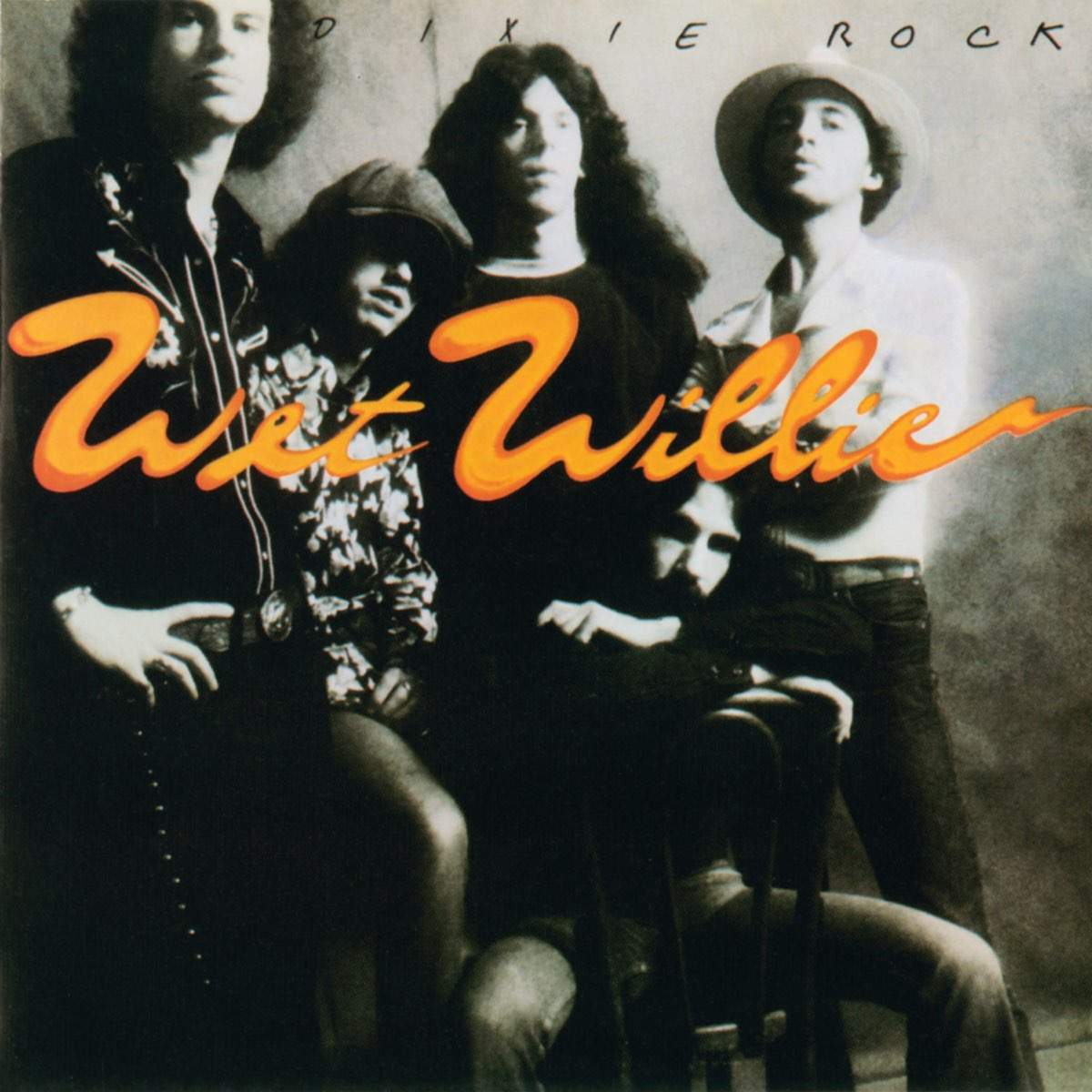
Mike added an extra dimension to our sound, playing organ and other keys while John remained on piano. His soulful R&B-influenced vocals also added to our sound, singing harmonies and some leads, especially on songs he’d written. We recorded three of Mike’s songs on ‘Drippin’ Wet Live’: ‘Teaser,’ ‘No, No, No’ and ‘Ring You Up’. Rick Hirsch’s ‘Everything that Ya Do’ was a standout as well, and became another concert favorite to this day.
Rick Hirsch: Mike Duke is a keyboardist, singer/songwriter from Thomasville, AL. He was living in Tuscaloosa and part of that music scene, and I think Jimmy ran into him somewhere and heard him play and sing some of his songs. Remember I mentioned Jimmy and his brother Jack came from a family with strong gospel music roots. Their mother played and sang at their church, and they were constantly playing and singing around the family piano at home. Among Mike Duke’s songs (he had a million of them) there was a gospel song titled ’Trust In The Lord,’ an upbeat truly great uplifting piece he’d written. We all loved the song and it plugged right in with our vibe, so we recorded it for the ‘Dixie Rock’ album as a duet between Mike and Jimmy swapping off verses. We were digging the layer Mike brought to the overall sound with two keyboards, something I’d always loved about groups like The Band and keyboard oriented bands like Procol Harum. It created a certain elegance that was really beautiful to listen to in my opinion. If I had to claim a favorite chapter of Wet Willie music, it would likely be that period where we had John Anthony and Mike Duke sharing keyboard duties.
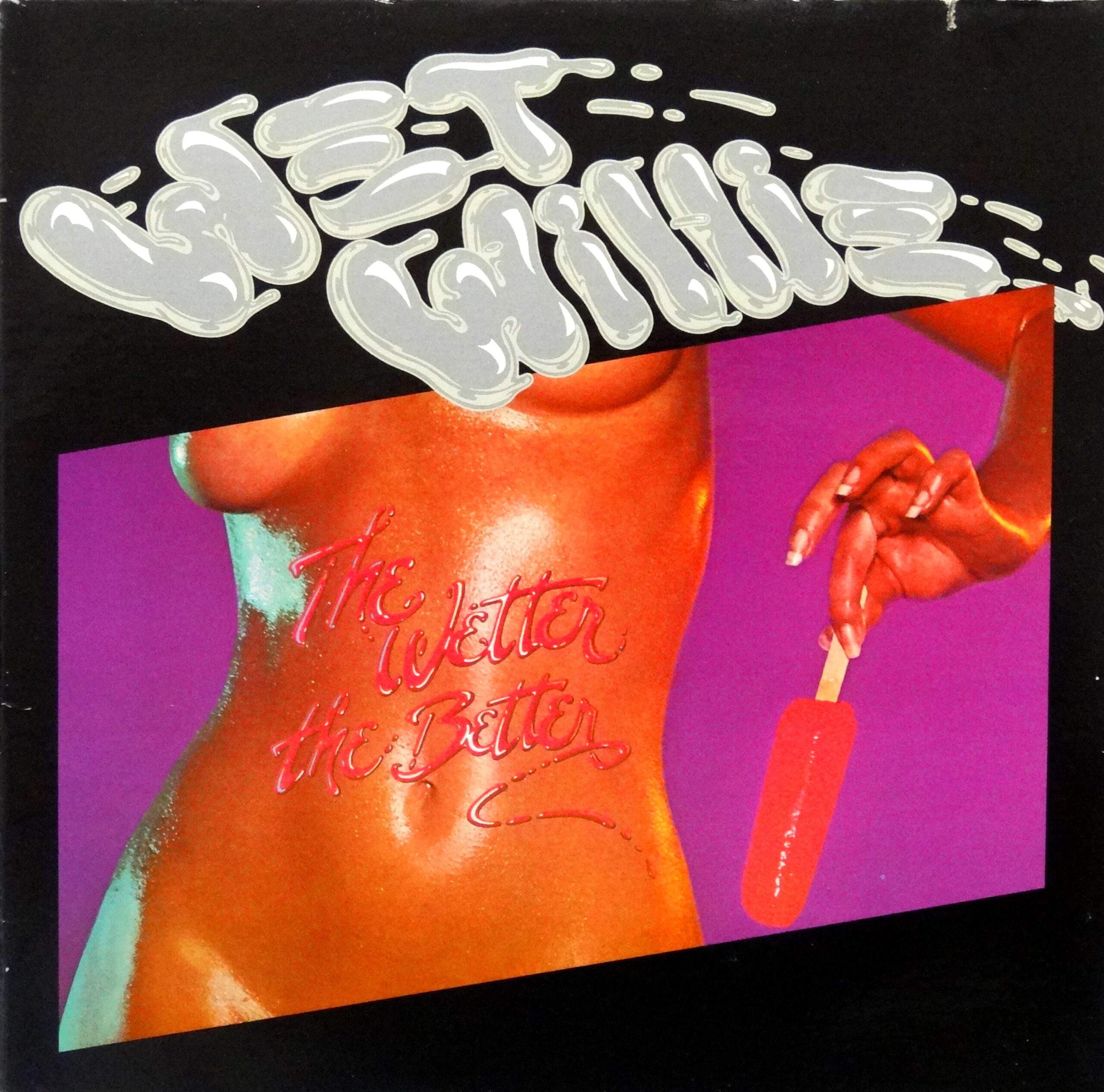
By then I’d picked up my go-to axe for the next many years, a ’59 Sunburst Les Paul and a custom designed Boogie amp built by Randy Smith of Mesa. I’d also started incorporating some minimal effects, i.e. EchoPlex, Tube Screamer, MXR Compressor and Phase 90 phase shifter. So personally my sound was starting to develop in the direction I wanted it to go finally. I’d begun playing bottleneck by then, trying to put my own spin on it and steering clear of mimicking the inimitable master, Duane Allman. I hope it is evident in my playing.
Donna Hall Foster: At this time I moved to Flint, Michigan to live with Mark Farner (Grand Funk RR) on his farm. We had met and fallen in love during our tour together in ‘74. We lived together for several years and I added my vocals to several songs on Grand Funk ’Good Singin’, Good Playin” album. We have one son together. I moved back home to Mobile in the late 70s and didn’t tour, just went into motherhood. Eventually had two more children with a local Mobilian.
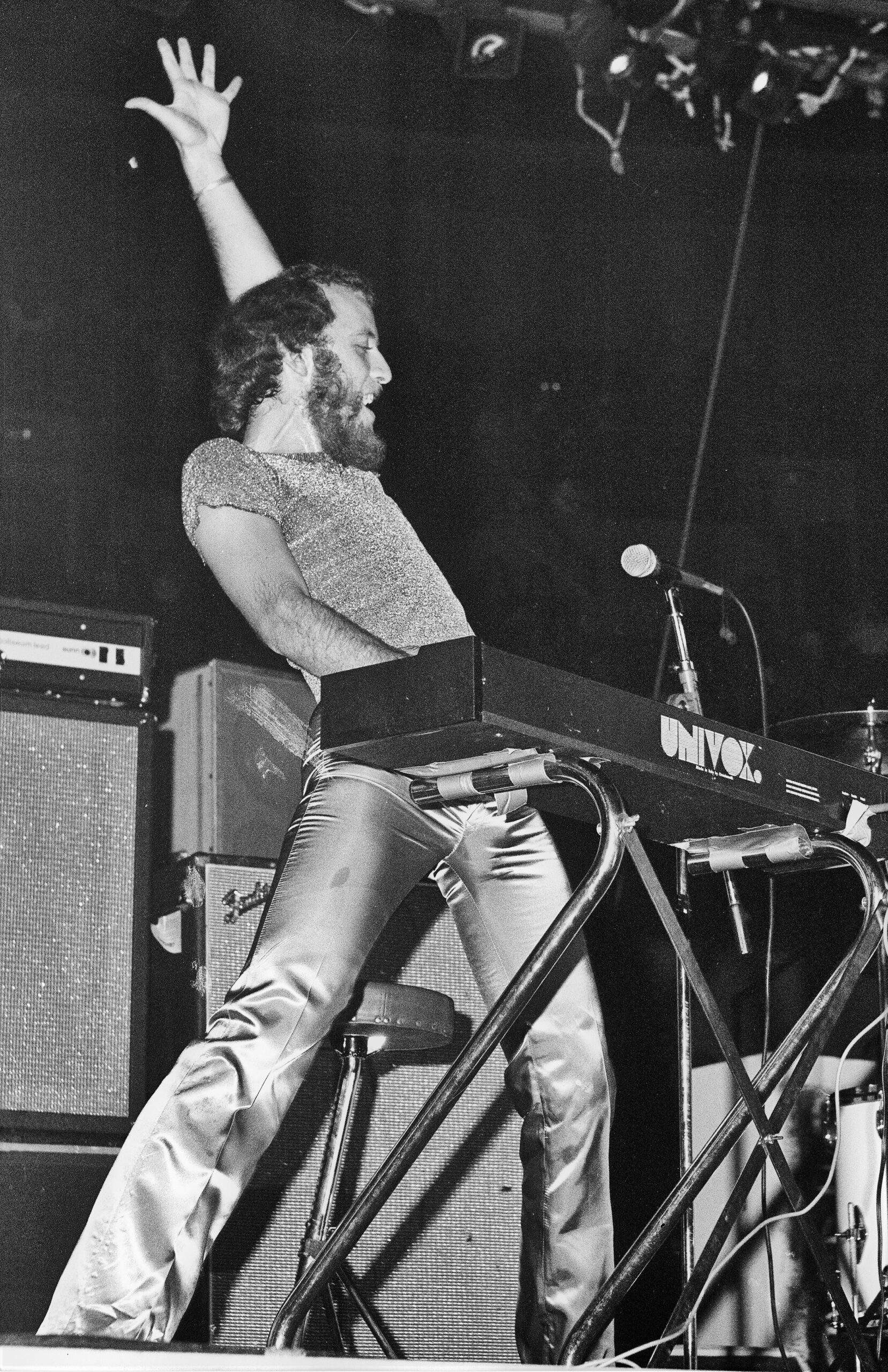
You even had Elkie Brooks joining the band as a backing singer, as did future Honkette Leslie Hawkin. Tell us how did that come about?
Jack Hall: My memories aren’t clear on the details as to how we added these two “Williettes” to our line up. Elke already had a reputation in England, where she was from, as a backup singer with Robert Palmer. Ella Avery had left the band and we needed someone to fill the role as Donna’s partner, so Capricorn suggested Elke, probably because they had an interest in signing her to the label. She had great stage presence and a strong voice, which complimented Donna’s very well.
But Elke wasn’t with the band very long, so when she left Leslie Hawkins filled her role as “Williette No. 2.” As tiny as she was, Leslie also had a strong voice. I don’t recall when she left, but as we all know, she was tapped by Lynyrd Skynyrd as one of the original “Honkettes,” and survived the plane crash in which Ronnie Van Zant and several other Skynyrd members perished.
Rick Hirsch: Ike and Tina got the Ikettes, Ray Charles got the Raelettes, we’re Wet Willie from Macon, Georgia… and we got the Williettes! The Williettes were officially introduced on the ‘Keep On Smilin” LP consisting of Donna Hall and the late Ella Brown Avery. We had begun to experiment with background vocals early on in Wet Willie debut album, and by the time we were in the recording phase of the ‘Keep On Smilin” album and Tom Dowd producing, Donna and Ella became a significant part of the sound. So we were lucky enough that they would eventually become the Williettes, and were a major attraction for our live audiences. We had a couple of substitutes come in, Elkie Brooks (a Brit from Manchester, England and formerly of UK band Vinegar Joe), and Leslie Hawkins who went on to sing backup for Lynyrd Skynyrd and survived the infamous plane crash that took out several of the others. Frank Fenter was aware of Elkie from his London years and brought her into the foal. Donna Hall Foster and Ella Avery were the ones who wrote the Williette book.
How did you enjoy your second live album, ‘Left Coast Live’?
Jack Hall: This was a one-off club date on the ‘Left Coast Live’ in Los Angeles. Mike Duke had gotten comfortable with his role in the band, and this set showcases the tight arrangements and harmonies developed over many miles of touring. A standout here is Rick Hirsch’s ‘Lucy Was in Trouble,’ an extended minor key jam that revealed well honed chops by the whole band and also became a staple in our setlists. It’s clear that we and the crowd had a rollicking good time.
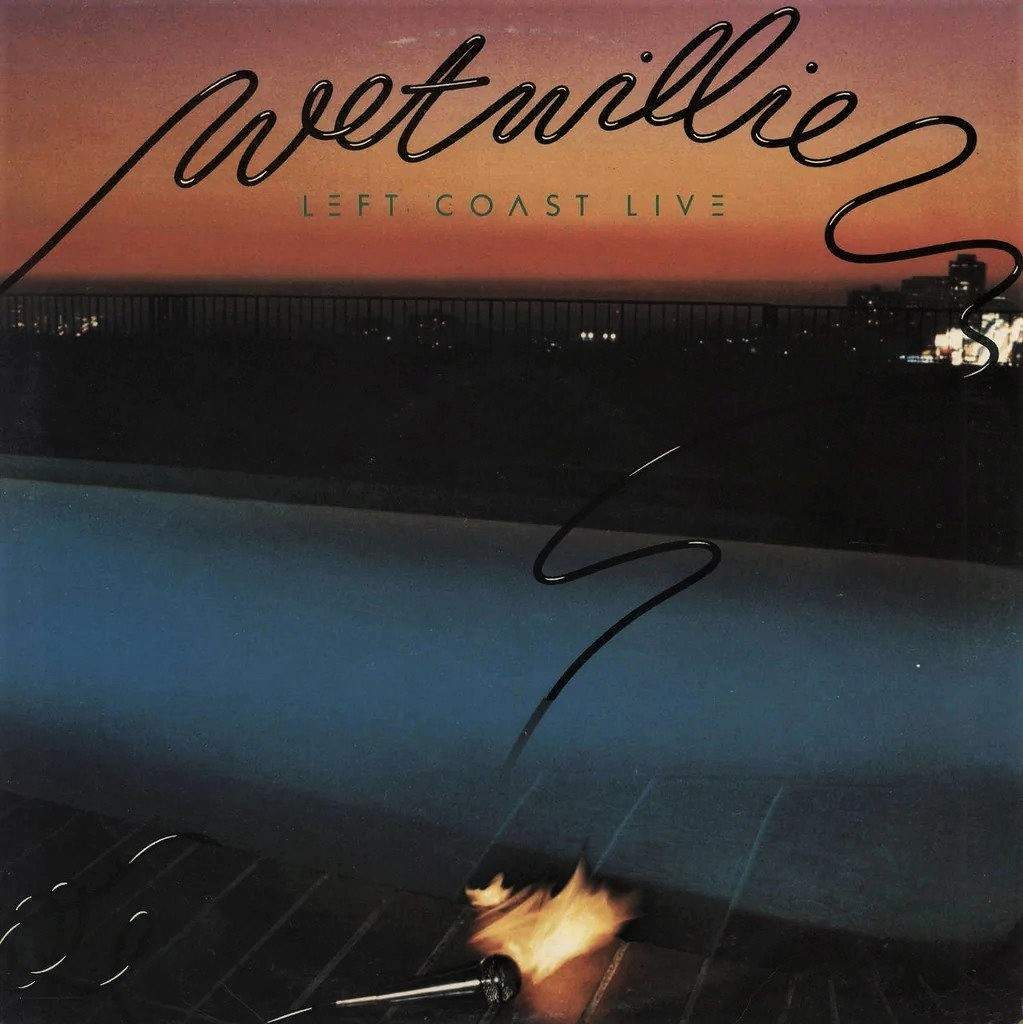
Rick Hirsch: Recorded at The Roxy in Los Angeles, the energy on ‘Left Coast Live’ is pretty intense, and a bit over the top for my tastes. There were a few guests in the house that night and it was an exciting gig. I think Capricorn, who had established a branch office in LA, probably promoted that show with high expectations. That may have worked its way into our set as those things can do.
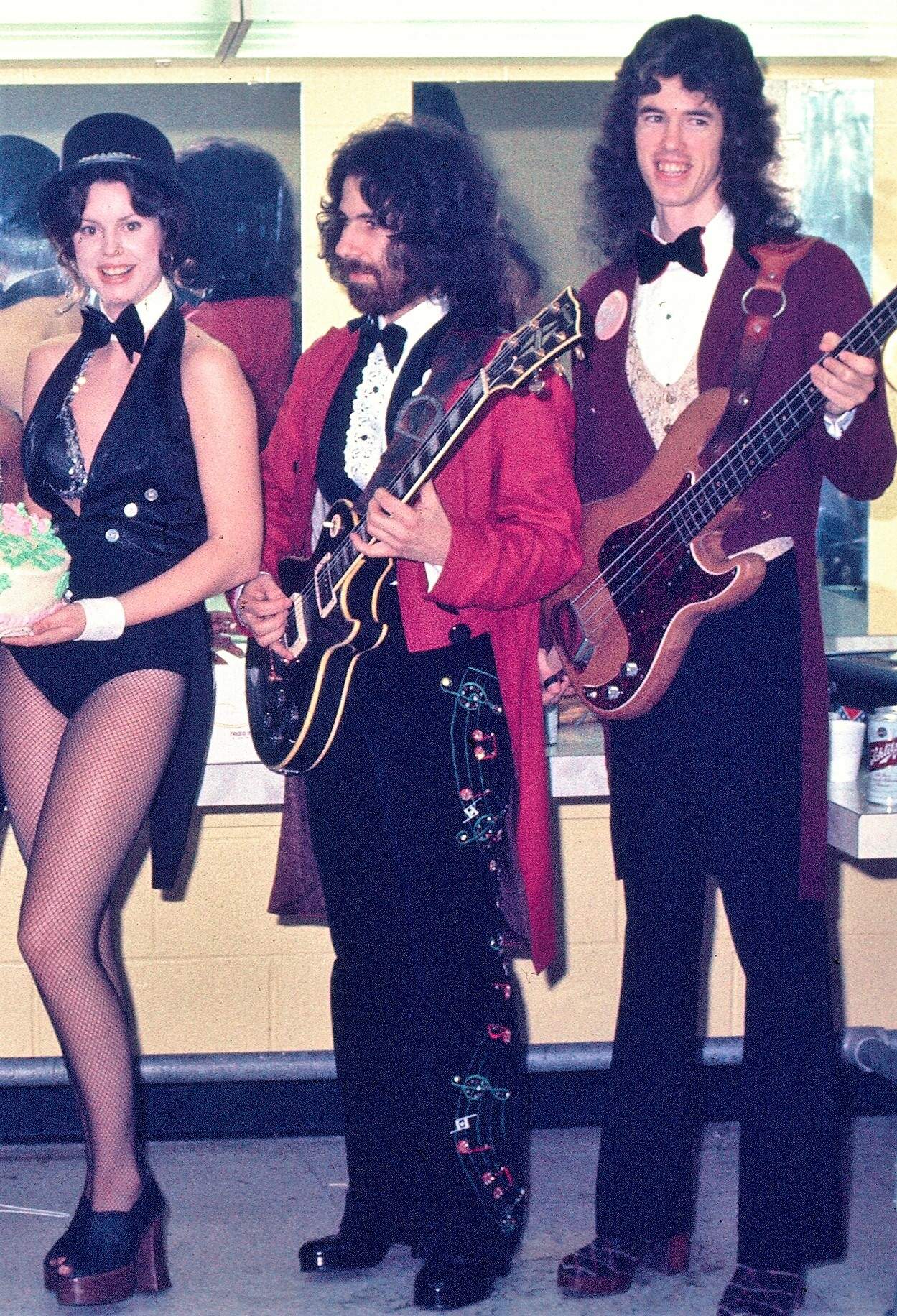
What led you to sign for Epic?
Jack Hall: When Rick decided to leave the band in ’76, other members followed suit, leaving Jimmy, Mike Duke and myself wondering what to do next. We ultimately decided to try and to keep the band going with some new members. We reached out to Marshall Smith, a Mobile friend some of us had played with before Fox, but he was drafted into the Army and was unavailable back in 1969. He’d since returned to Mobile and was playing guitar and singing with other musicians from the area. When approached with the offer, he readily accepted, with one condition- that we also bring TK Lively on board, the stellar drummer Marshall was playing with at the time.
We agreed and began looking for a lead guitarist, since Marshall played mainly rhythm. Meanwhile, believing we had fulfilled our contractual obligations with Capricorn, we decided to look for another label. I contacted Brian Rohan, a music attorney recommended by a good friend and sent him a copy of our Capricorn contract. He looked it over and agreed that we were free to seek a new record label. and began soliciting offers. The most interest came from Epic and its head of A & R, Lenny Petze, who made us an offer we couldn’t refuse. So Jimmy and I flew to New York to sign the deal. We were given a nice advance, more money than we’d ever seen with Capricorn.
As these negotiations were taking place we found Larry Berwald in Florida, he was the perfect fit for Wet Willie: a very gifted lead guitarist, with a great personality. He accepted the position and moved to Atlanta, where we had relocated after leaving Capricorn. To our disappointment, we later learned the Capricorn contract had a ”gotcha” clause, a so-called overcall clause, and said we owed them another album. Unfortunately Epic had to shell out $100,000 bucks to buy us out of that old contract.
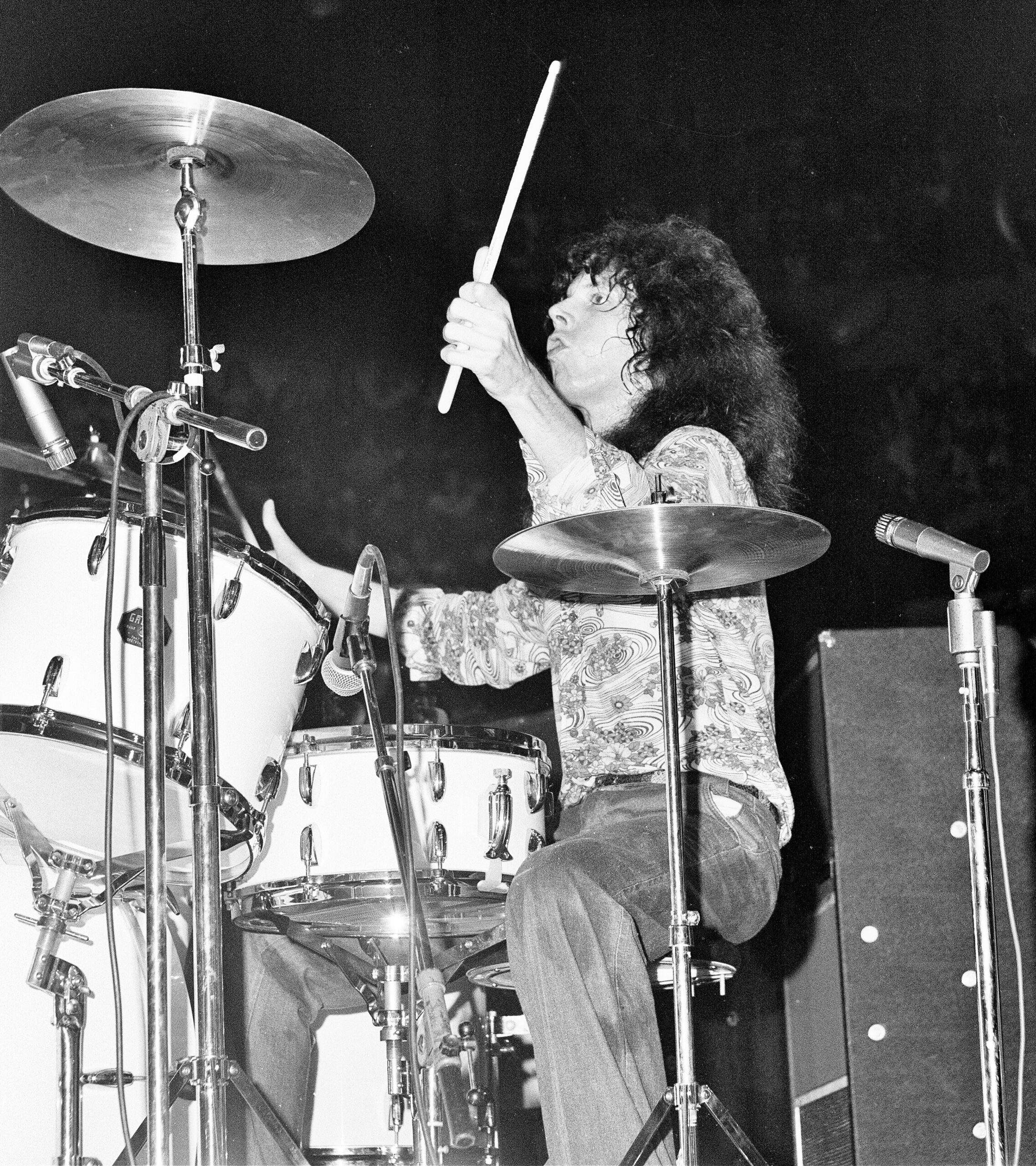
Two more albums followed in the 70s, ‘Manorisms’ and ‘Which One’s Willie?,’ please tell us about them.
Jack Hall: These were our two Epic albums. ‘Manorisms’ was recorded at the Manor Studios, a couple of hours from London. The producer, Gary Lyons, wasn’t able to secure a visa to work in the US, so Epic shipped the band and our equipment, plus a couple of wives, to England to work with him. Gary, our second British producer after Eddie Offord, also had an impressive track record, working with bands like Foreigner. We stayed in England for almost a month and it was one of the most enjoyable and rewarding experiences of our career.
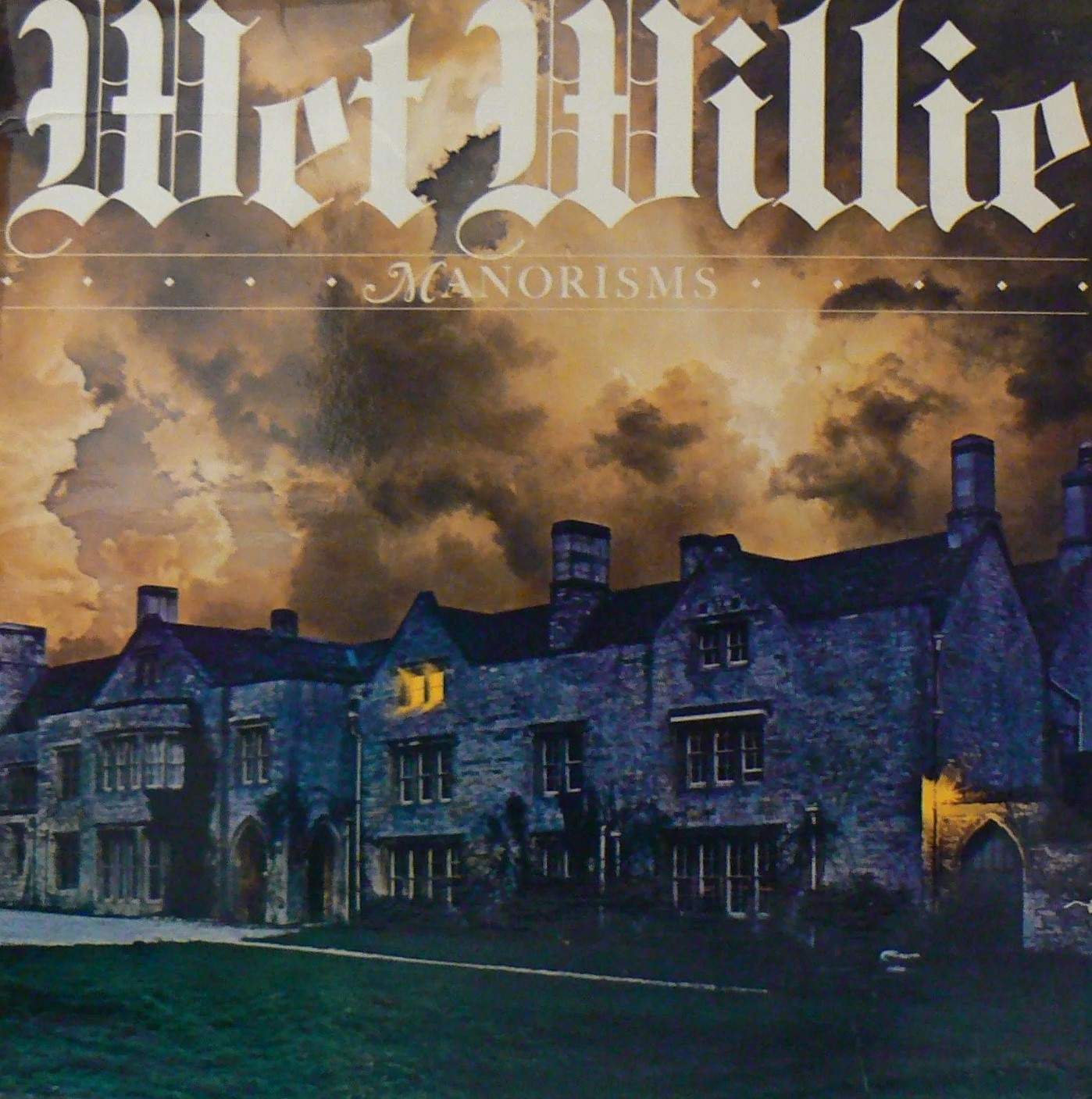
’Streetcorner Serenade’ was the standout song on the album, becoming another charting single for the band. It was a collaboration between Jimmy and Mike Duke, with Jimmy writing the verses and Mike the sing along choruses.
‘Which One’s Willie?’ was our second and final album for Epic and Lenny Petze decided to produce it himself. We recorded basic tracks at the Record Plant in NYC and did the overdubs at the LA Record Plant. Striving hard for another hit, Lenny threw everything into the mix: Horns, strings, backing vocalists (The Blackberries), a percussionist, even an arranger for strings and horns.
As Epic’s A&R man, Lenny presented several non-band songs to us, one of which was ‘Weekend’. This song had an infectious chorus and hook line: ‘You gotta make the best of life while you’re young.” But we could not relate at all to the verse lyrics, which talked about shopping on Rodeo Drive in LA and other LA specific references. So Jimmy completely rewrote every verse to be more relatable for us. This was the disco era and ‘Weekend’ had the distinctive walking-octaves disco bass line - probably the only southern rock disco record ever recorded! But it did hit the charts and was a Friday evening staple on Top 40 radio stations for years.
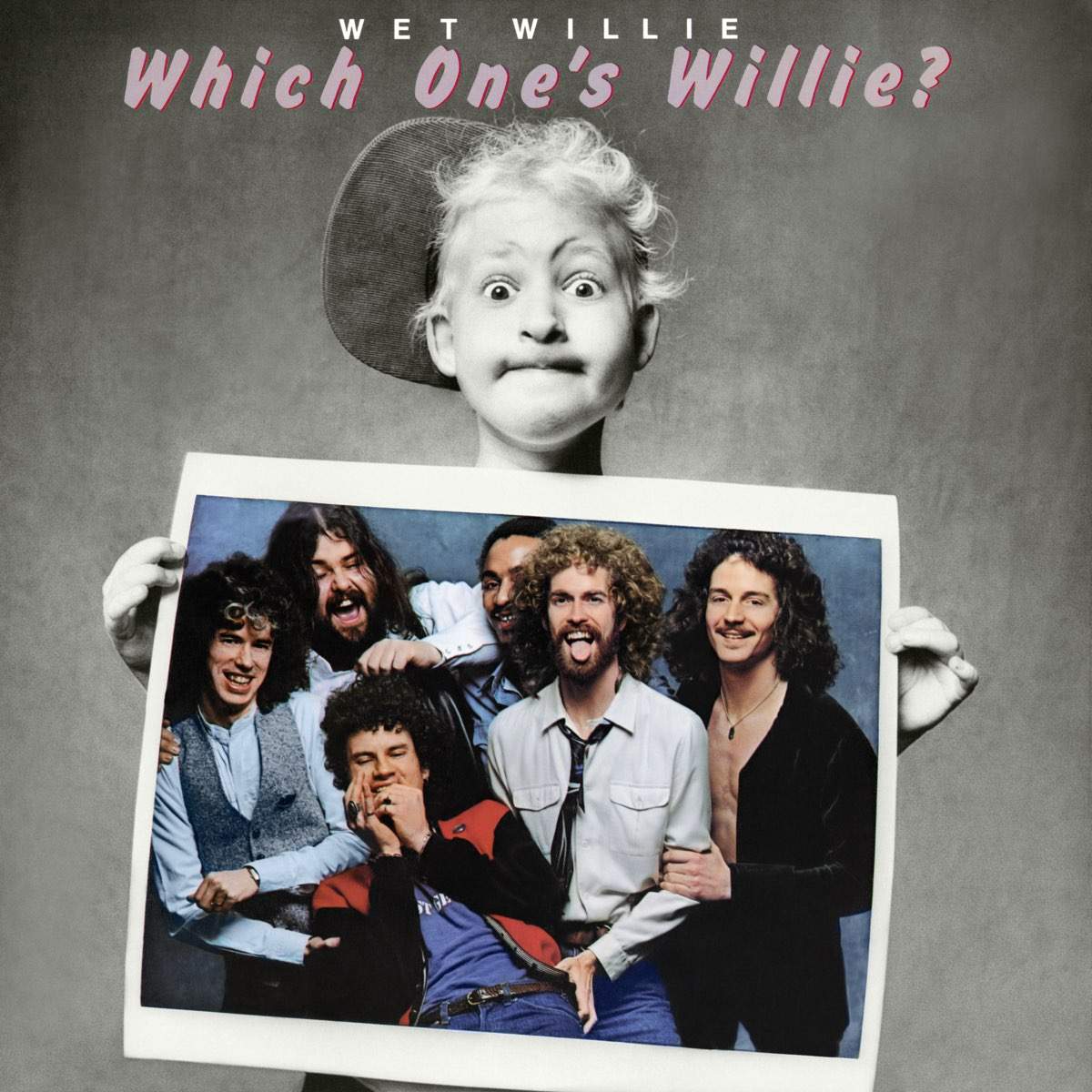
What can you tell us about ‘Touch You’ by Jimmy Hall? Jack Hall and Larry Berwald played on it.
After ‘Which One’s Willie?,’ the decision was made by our then-manager Joe Sullivan (Charlie Daniels manager) and Epic to offer Jimmy a solo deal with the label. This basically put Wet Willie in limbo as a band for years. But the producer of ‘Touch You,’ Jimmy’s first Epic solo album, wanting Jimmy to feel comfortable with the musicians, decided to use a combination of Wet Willie and studio players. So Larry Berwald and I, along with several Nashville studio musicians, played on all the tracks. I remember being intimidated at first by these ”first take” guys, but they put us at ease and were a pleasure to work with.
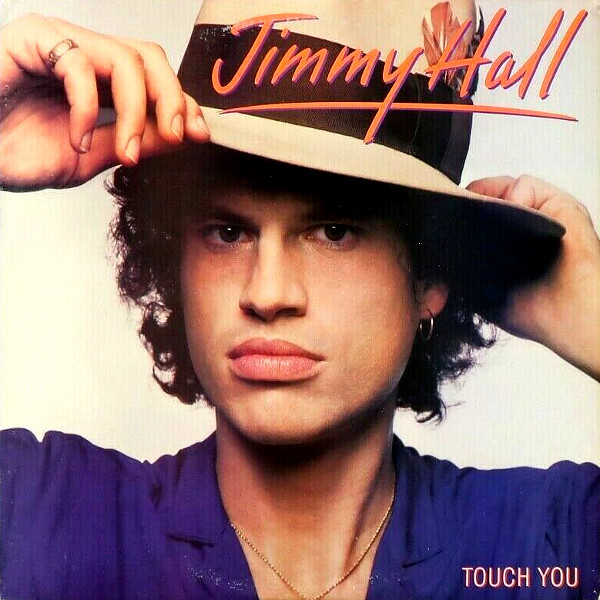
I contributed one song, ‘Easy Street,’ on which I used a string popping technique for the first time, and which was the second single released from the album.
Jimmy Hall later went on to play with Jeff Beck. Do you know how that came about?
Jack Hall: This story goes all the way back to our days as Fox. We were playing in Fayetteville, Arkansas, the home of the University of Arkansas, in a college club, the Red Lion. when we got an offer to open for Vanilla Fudge. Their drummer, Vinny Appice, must’ve been very impressed with Jimmy, as he joined us in our van after the show to share some smoke and relate that he and Jeff Beck were in discussions to do a project together. This project didn’t materialize, but Vinny had told Jeff about Jimmy, and later Jeff and his then drummer Cozy Powell came to Macon, where a hastily organized jam took place in Capricorn studios, with Jeff Beck, Jimmy Hall, Cozy Powell, Paul Hornsby and myself. Somewhere in the world there are tapes of that jam, which Jeff’s manager took with him.
We were concerned we might lose Jimmy to Jeff Beck, but that project didn’t work out either, much to the band’s relief. But years later Jeff contacted Jimmy to ask him to record and do some touring, and a long lasting relationship ensued.
What followed for you guys in the 80s? Were you part of any other bands?
Jack Hall: After Jimmy’s ‘Touch You’ album we toured together for awhile, opening for Charlie Daniels quite a bit, but we parted ways when Jimmy did his second Epic solo album. I then did some touring with country artist Terry Gibbs, whose single ‘Somebody’s Knockin’ took off and crossed over into the pop charts. We did shows throughout the US and did a couple of USO (United Service Organization) tours of military bases in Europe. I also toured with another Nashville act, Dave & Sugar, who had a big country hit with ‘Queen of the Silver Dollar.’
Later I enjoyed playing with a Southern ”allstar band,” The Renegades of Southern Rock, with former members of the Marshall Tucker Band, the Gregg Allman band, and singer Johnny Townsend, from the Sanford Townsend Band, who’s ‘Smoke from a Distant Fire’ was a big hit in the late 80’s. We played hits from all these bands, including ‘Keep On Smilin”.
[Rick Hirsch] You left the band at the end of 1976 to play with Gregg Allman, as part of his solo band. Would you like to share how that experience was for you?
Rick Hirsch: Sometime in the last few months of ’76 Gregg, who was married to Cher by then and living in LA, called to ask if I’d be interested in playing on a proposed duet album he and Cher were planning. I accepted the offer. I think we started tracking initially in around November. They’d collected the songs for the album by then, and we went into Sunset Sound and recorded four or five songs by different writers, including a couple of covers. John Haney produced those first few tracks of which four made it onto the album. When it was time to leave and head back to Georgia, we hadn’t finished and were going to return when everyone’s schedule allowed. Before everyone left, Gregg and Cher asked us to come to a meeting at which they offered to hire us as their recording and touring band. The package included a weekly retainer but required us to move to LA, a daunting prospect personally because of many things. Primarily the upheaval of my life in Macon and leaving a band of friendships that had developed for several years. Of course I ended up moving on the offer for a multitude of reasons and U-hauled out to LA on New Years Eve, 1977 where I worked and resided permanently.
When I moved out, Gregg and Cher and their management team decided to briefly abandon the duet project and jump into an album project for Gregg and use the same band, myself on guitars, Bill Stewart on drums, Calvin Arline, bass, Neil Larsen on keys. That nucleus was augmented by many great A-team players from the LA area, including Dr John, Billy Payne, Victor Feldman, and Willie Weeks. Guitarists Steve Beckmeier and John Hugg joined in on some of it. Plus a horn section with Sal Marquez, Jimmy Robinson, and Gene Dinwiddie. The result was Gregg Allman’s second solo effort, ’Playin’ Up A Storm,’ produced by Lenny Waronker and Russ Titleman and some string arrangements by the undeniably legendary Marty Paich who had done so much but for me the stand out was Ray Charles, ’Modern Sounds In Country And Western Music Volumes 1 & 2’. I was a wide eyed fanboy for many of the moments that happened during this group of sessions at Warner Brothers’ Amigo Studio in Burbank, CA. The album turned out to be very different from Gregg’s first solo LP, ’Laid Back,’ as it should have been. My perception is Lenny and Russ were taking Gregg to the school of Ray Charles and a much more urban sound than his first one. I’ll hear it nowadays and am blown away by how it stands the test of time.
After recording that album we began to finish up the Gregg/Cher duet and tried to find the right studio for completing it. We checked out Larrabe, Cherokee, and a couple of others finally landing at The Record Plant which was conveniently located about three blocks from my house in West Hollywood. Johnny Sandlin and Gregg produced the balance of the album. Allman and Woman caught a lot of flack, I think mostly for the pettiness of a fanbase who thought those two couldn’t possibly blend styles and have anything credible come out of it. Wrong. It’s a great record with one of the most amazing cast of participants of anything I’ve played on.
These albums spurred a couple of significant tours. The first one was an extensive tour of Japan as Gregg’s band which was mindblowing on so many levels because it was my first visit to Japan. We played the Budokan in Tokyo, a huge arena for a Japanese audience that knew every single audience response on The Allman Brothers Band ’At Fillmore East’ album and was repeating them right there in front of us en masse! My fascination with Japan and its culture was intense and I don’t think I slept the entire time we were there. The second tour was a Gregg and Cher thing, and was in Europe. I’ll never forget upon arriving at the first hotel in Birmingham, Cher saw me walk in the lobby, grabbed my one valise, threw it at the bell captain and hustled me out the heavy revolving door I’d just entered. When I asked what was up she didn’t say but walked down a busy sidewalk. Stores were beginning to close and she was in a hurry. We ended up at a leather place and she started pointing at boots while asking if I liked this or that. Saw a simple plain pair I thought was cool and she asked the clerk to bring them out to try on. Then she looked at me and said she was going to put those on her Mastercard which she already had out, but on the condition that I give her the shoes I was wearing … then and there. I agreed (what else would I do?) and the clerk gave her a bag to put them in. When we left, she dropped them in the first dust bin we passed on the way back to the hotel saying how much she disliked those shoes!
That tour was full of surprises. One gig we played, in London I think, I was backstage warming up through a new at the time Roland JC-120 that had this interesting stereo chorus feature. Roland gave them to us to try out. While I was getting ready to play, my back was facing the dressing room door when I heard this voice say “Hello”. I turned to see and there leaning halfway across the doorway was none other than George Harrison … you know ... the Beatle??? When I gathered my composure, and said please come in, he asked what I thought of Roland. We chatted for a brief moment or two after my stumbling about and he was off. But I had actually met a Beatle. Fanboy struck again.
Unsure of how deep you would like me to dive here, but suffice it to say most of my adult life was spent working in Los Angeles (35-40 yrs). The opportunities were endless and I count my blessings daily for all the good that came from making the move. Maturing both as a musician and an adult was greatly enhanced from exposure to such a culturally diverse city on a continual day in and day out basis.
[Rick Hirsch] You later recorded with a lot of artists, including Joan Armatrading, Bonnie Raitt, Bonnie Bramlett, Billy Vera and the Beaters and so on. What are some of the collaborations you are the most proud of?
Rick Hirsch: After Gregg and Cher concluded their relationship, about a year and a half later, everyone began to disperse. I liked where I was and instead of rushing back to the deep south decided to give it a go and see where it would lead. Not long after I got a call from someone on behalf of Bonnie Bramlett who asked about my doing some work with her. I think I’d run into Bonnie at one of the first rehearsals I had attended for Gregg and Cher’s project in a small rehearsal space on Santa Monica Blvd. She was preparing to do another album in Macon for Capricorn and Frank Fenter contacted me about potential players. I plugged myself in the mix along with friend Bobby Martin on keys, Freddie Beckmeier on bass and Steve Beckmeier on guitar as well. Deke Richards was producer and he used his regular drummer, Jay Armentrout along with some other fine musicians to augment the basic rhythm section. We tracked in the Macon studio, so it was like old home week for me. It resulted in ‘Memories,’ Bonnie’s subsequent solo album after ‘Lady’s Choice’. I then toured with Bonnie to promote that record. There were truly some great memories with that touring band and working with Bonnie. She taught me a ton and introduced me to Delaney with whom I did some session work and also one of my fave guitarists, Jesse Edwin Davis.
After Bonnie’s gig ended, I was biding my time in Los Angeles doing the occasional session and writing whenever the inspiration hit. At a random session at Gold Star Studio I met a keyboardist virtually in the headphones. Afterward, we intro’d and his name was Red Young. This was toward the very end of 1978. Red contacted me not long after to explore the possibility of working with him in Joan Armatrading’s band. He was her acting music director at the time and had been playing with her for a while. He sent the songs to me via USPS and cassette tape. I was only slightly familiar with her but after I started listening, I knew this was a gig I needed and wanted to do. At that time Joan’s fanbase was primarily in Europe and Australia, New Zealand, Canada, and Japan. So those are the places we toured plus some in the northern USA, Oregon, Washington State, NYC, Boston jumping back and forth over the Canadian border. I think we made it all the way to Calgary just in time for stampede fest or something like that. Anyway, Joan Armatrading was probably my most rewarding experience musically and in many other ways. She is a brilliant, kind person with songs that reflect it and will move you in the best of ways. The players we used in that ensemble changed up depending on what her concurrent albums were like as far as musical direction. Drummers included the late amazing Art Rodriguez and late also amazing Richie Hayward (separately of course.) And Denny Seiwell (Wings, et al.) She plugged in Dickie Sims on keys for a stint (‘I Shot The Sheriff’ and other Clapton songs.) The tours were remarkable playing countries like (then) Yugoslavia and other obscure places. We recorded with Glyn Johns, Henry Lewy, and Richard Gotterer in different studio settings. All round great experience with Joan Armatrading.
While working with Joan’s bands, I met saxophonist Lon Price. Lon and Red were both from Ft Worth, TX which is kind of the South, but not really. So we were geographically compatible! After Lon left the first permutation of Joan’s band, he went back to Los Angeles and joined Billy and the Beaters, a new horn band. When I went back to LA, I wasn’t there long before I got a call from Lon on a Saturday asking me to do a gig with Billy at the Roxy the following Tuesday night to replace Rick Vito who couldn’t make the date. That was a challenge, because Billy’s songs are not in any way predictable where you can just wing it. I buckled down and learned the songs and walked out onstage with them for that gig in ’82. From then until not that long ago, I worked with Billy Vera. That band was badass and I was able to do some remarkable things while making many great friends. Plus I was able to stay in Los Angeles and work in my studio. Billy would occasionally come to that studio and demo a song. And he’d bring a co-writer now and then. Larry Russel Brown and Chip Taylor were two interesting writers I met and worked with through Billy. Larry wrote ‘Tie A Yellow Ribbon’ and ‘Knock Three Times’. Chip Taylor wrote ‘Wild Thing’ and ‘Angel of the Morning’. Suffice it to say they were great to collaborate with. Chip, Billy and I wrote ‘Papa Come Quick’ during one of those sessions and Bonnie Raitt ended up cutting it on her album ‘Luck of the Draw’. The Beaters worked in a ton of unique situations with some interesting people. We were featured in a few movies like Blake Edward’s film Blind Date with Bruce Willis and Kim Basinger. Another with director Bobby Roth called Baja Oklahoma with Willie Nelson. Meeting and working with Willie was pretty special. We landed a late night talk show house band gig with Rick Dees Into the Night on ABC. Had a hit with a ballad, ‘At This Moment’ which spurred another album for Capitol, ‘Retro Nuevo’. Played the Tonight Show with Johnny Carson what seemed like a dozen times. Many memorable moments with the Beaters. If I end up doing a memoir, I’m certain all that will be included.
While in LA, I started to take advantage of the fact that I lived in the Mecca of media and began networking for music gigs for jingles, film music, tv and writing/recording the most forgettable music that exists. With a few friends, that panned out doing incidental music for shows like Leesa Gibbons (NBC), a daytime talk show, having music placed in sports broadcasts eg ABC Sports (ABC Monday Night Baseball), NBC Sports (Olympics in Seoul, Barcelona). Getting those gigs is a major side hustle and takes a lot of energy.
The band got back together in the 90s again?
Jack Hall: After Jimmy’s second album, the label released him and he was able to focus on Wet Willie again for a while. Many people aren’t aware that Mardi Gras in the US actually started in Mobile, not New Orleans. They have parades and Mardi Gras balls hosted by ”crewes” of men and women of stature in Mobile. We were approached by members of one crewe, the Knights of Columbus, I think, in the early 90’s, to regroup and play for their ball. We were able to pull the band back together, the full line-up of which I can’t recall, to play for them, and continued doing concert and club dates for several years, with varying line ups.
But again, after gaining some momentum, Jimmy was offered a position with Hank Willams Jr., which he accepted, and the band was again in limbo.
Donna Hall Foster: Wet Willie did reunite in the 90s for some scattered shows and since Jimmy had a solo career, the rest of the band would play as Wet Willie Band sans Jimmy but to lukewarm response.
What’s the story behind the 2012 album, ‘Miles of Smiles’?
Jack Hall: After several more years Jimmy was again in a position where he had time to devote to Wet Willie, between dates with Beck and Hank Jr. The line up of players in this iteration of the group may have been the best since the original group. It included Jimmy, of course, sister Donna, myself, TK Lively, John Anthony, and guitarists Ric Seymour and Ricky Chancey.
Seymour was a very gifted guitarist and vocalist, and he and Donna harmonized very well together. Chancey, also a talented guitarist and harp player, went on to play with Hank Jr. as well. This was the band that recorded ‘Miles of Smiles,’ another one-off live set recorded in Woodstock , GA in 2012, for the Hittin’ the Note label, owned by Joe Bell, who handled merch for the Allman Bros. for many years. Produced by Ric Seymour and myself, I think this recording captured the finesse and professionalism of the band in its latter years.
Donna Hall Foster: Wet Willie’s current line up includes all original members except Lewis Ross, who was replaced by TK Lively in the late 70/early 80s and Ella Avery, who passed away 10 years ago.
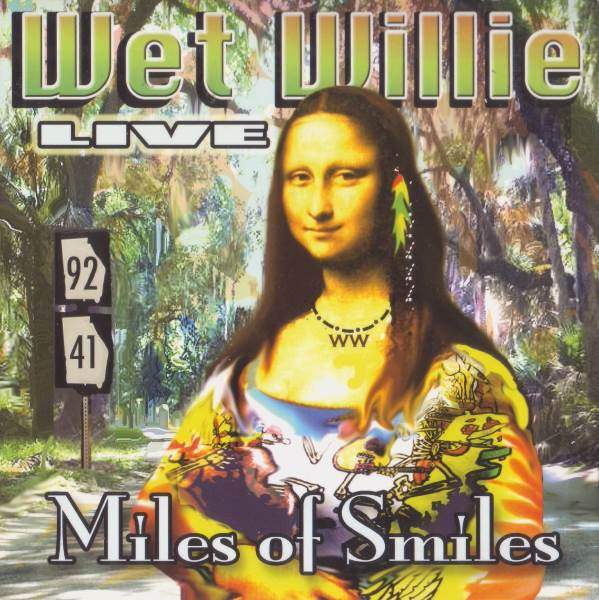
Looking back, what was the highlight of your time in the band? Which songs are you most proud of? Where and when was your most memorable gig?
Jack Hall: There are many highlights from my time in Wet Willie. I was in the band longer than anyone other than Jimmy; played on every album, every mile of every tour from day one through ‘Miles of Smiles’ and beyond. It’s very difficult to pick one special moment, but I’ll mention two: When we were inducted into the Georgia Music Hall of Fame, and then the Alabama Music Hall of Fame. These two honors really underscored the legacy of the band to me.
Although I’ve mentioned several times that we weren’t a prolific songwriting band, we did record some special songs. Of course ‘Keep On Smilin” is probably the one I’m most proud of, as it touched the lives of so many, with a message of hope and positivity. ‘Dixie Rock’ was another, an anthem paying tribute to our Southern roots, even though in today’s politically charged climate, the word “Dixie” had fallen out of favor. One more song I’m proud of is ‘Leona’s Home Cookin’ Cafe (Leona),’ one of Jimmy’s, which was inspired by ‘Mama’ Louise’ who ran the H&H Cafe in Macon, where many a young hippie musician could count on a meal, even if he (or she) was flat broke. She truly was our ‘Mama’ away from home.
And with so many amazing gigs through the years, it’s difficult to pick one. But one that does stand out was the opening of the SuperDome in New Orleans, once again a great city for Wet Willie. This was a tremendous celebration with a week of concerts in the Dome each night. We played Southern Rock Night with bands like Marshall Tucker, Charlie Daniels and the Allman Brothers, and the crowd was overflowing, estimated at 70,000 or more. One of so many special nights I’ll never forget.
Rick Hirsch: This is a tough one. So many highlights and firsts with Wet Willie. I know the main highlight isn’t just one event or show or recording. It’s the idea that we were reaching so many people and in such positive ways with music and songs we had written and performed. And the spirit of that isn’t self adulation. It’s gratefulness for such a blessing of being able to make your way through this world doing that which invigorates and propels you through life. And being able to pass that on to others who are given to this purpose in their young lives. That’s the biggest payoff probably. I spoke with an old friend’s (Scott Boyer) son last night and I could tell he is flourishing in his music which made me happy. Wet Willie played hither and yon, but in the end it’s the part of your legacy that moves onward that matters. And may all that be for the betterment and good of this world. I believe that Wet Willie was born to that purpose and I accept it with open arms.
As far as my favorite song that I wrote while part of Wet Willie, it’s probably ’Everything That Cha Do (Will Come Back To You)’. I know that’s a bit preachy and heavy, dealing with the Karmic thing, but as a song, I think it was my best from those days, both musically and lyrically.
Donna Hall Foster: One of the highlights of my time with the band was the period when we were touring with big name acts and large venues in the 70s, when ‘Keep On Smilin” was #10 on the Billboard charts and we played JFK stadium with The Grateful Dead and The Allman Brothers in front of thousands of people. Another high point of my career was when we were inducted into both the Alabama and Georgia Music Halls of Fame. The most notable Wet Willie song, in my opinion, is ‘Keep On Smilin”. To this day, people tell us that this song has had a positive impact on their lives or encouraged them in some way.
When Jimmy Hall is not in the band you play under the name of The Wet Willie Band and you also released an album, if I’m not wrong?
Jack Hall: This was during a time when Jimmy once again was engaged with other projects and gave his permission for the rest of the band to perform as the Wet Willie Band. In hindsight we should’ve chosen a different name, but promoters wanted the Wet Willie cachet. So there were a few shows where we heard “Where’s Jimmy?” even though the line up had been clearly advertised.
However, one show, at Tipitina’s, once again in New Orleans, was recorded by a local producer and friend of the band. This show was made more special with the addition of the Hurricane Horns, a three piece section based in Mobile which played quite a few Wet Willie gigs with us over the years. And Ric Seymour did an outstanding job, not only playing great guitar, but replicating Jimmy’s lead vocals as well! This recording really highlighted the talent and musicianship of that band, on its own.
What currently occupies your life?
Jack Hall: These days, at 75 and as a two time cancer survivor, music is still my ”raison d’etre,” the reason I get out of bed, and my very best therapy. I thoroughly enjoy playing bass with good friends in our gospel band reunion and with our secular side project SilverTone, a band that plays that good “Old Time Rock & Roll.”
And occasionally, when Jimmy’s hectic schedule permits, it’s still a tremendous joy to play with Wet Willie, still, after all these years.
Rick Hirsch: Still involved with music as much as I can be at the age and stage of life I am in. And it’s effortless, so I know it’s the right place to be. I have developed a passion over the years to record other artists and help them understand their music in getting it recorded. Any skills that I have as a musician or writer or production person I gladly offer up to anyone whatever age he or she is. If I have relevance on this earth now it is found in that offering. I do enjoy playing live and conversing with other musicians through our instruments. A group I have worked with for the last few years is Molly Thomas and the Rare Birds, a quartet that is very close to my heart. And when Wet Willie plays I’m always pleased and happy to be there with them when possible, my family.
Donna Hall Foster: These days, my time is spent with family…the most important thing in this life. Enjoying my children and grandchildren and husband and brothers, and sisters and nieces and nephews … the biggest blessings and source of joy imaginable. I do continue to sing with Wet Willie and several other bands at this time.
John Anthony: I’ve been a Jehovah’s Witness for the last 30 something years and I play 4 nights a week at 2 four star hotels in the Bay Area of Mobile and Fairhope Alabama.
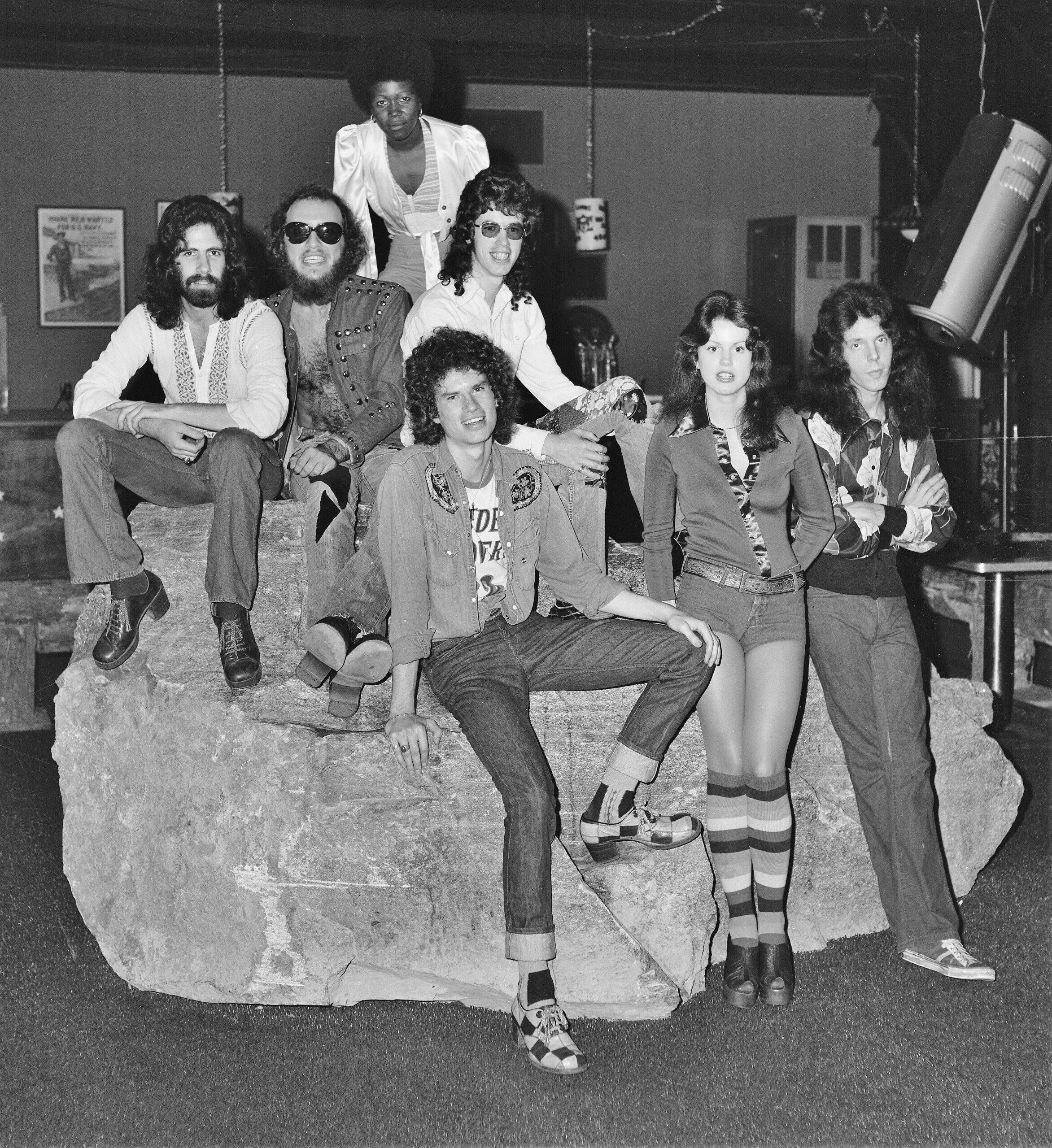
Thank you for taking your time. Last word is yours.
Jack Hall: Klemen it’s very clear you have a deep knowledge and appreciation of the history and provenance of Wet Willie. It’s very gratifying to realize that someone from so far away from America’s deep south knows who we were and are. It’s been a real pleasure revisiting these memories with you. All the best and “Keep On Smilin!”
Rick Hirsch: I want to sincerely thank you, Klemen Breznikar. This has been an incredible journey back in time for me. It’s spurred me on to possibly complete a book of memoirs I started a decade ago. But mostly it’s made me thankful for where I’ve been and hopeful for where I may go.
Klemen Breznikar
Headline photo: Wet Willie | Photo by Sidney Smith / RockStarPhotos.net

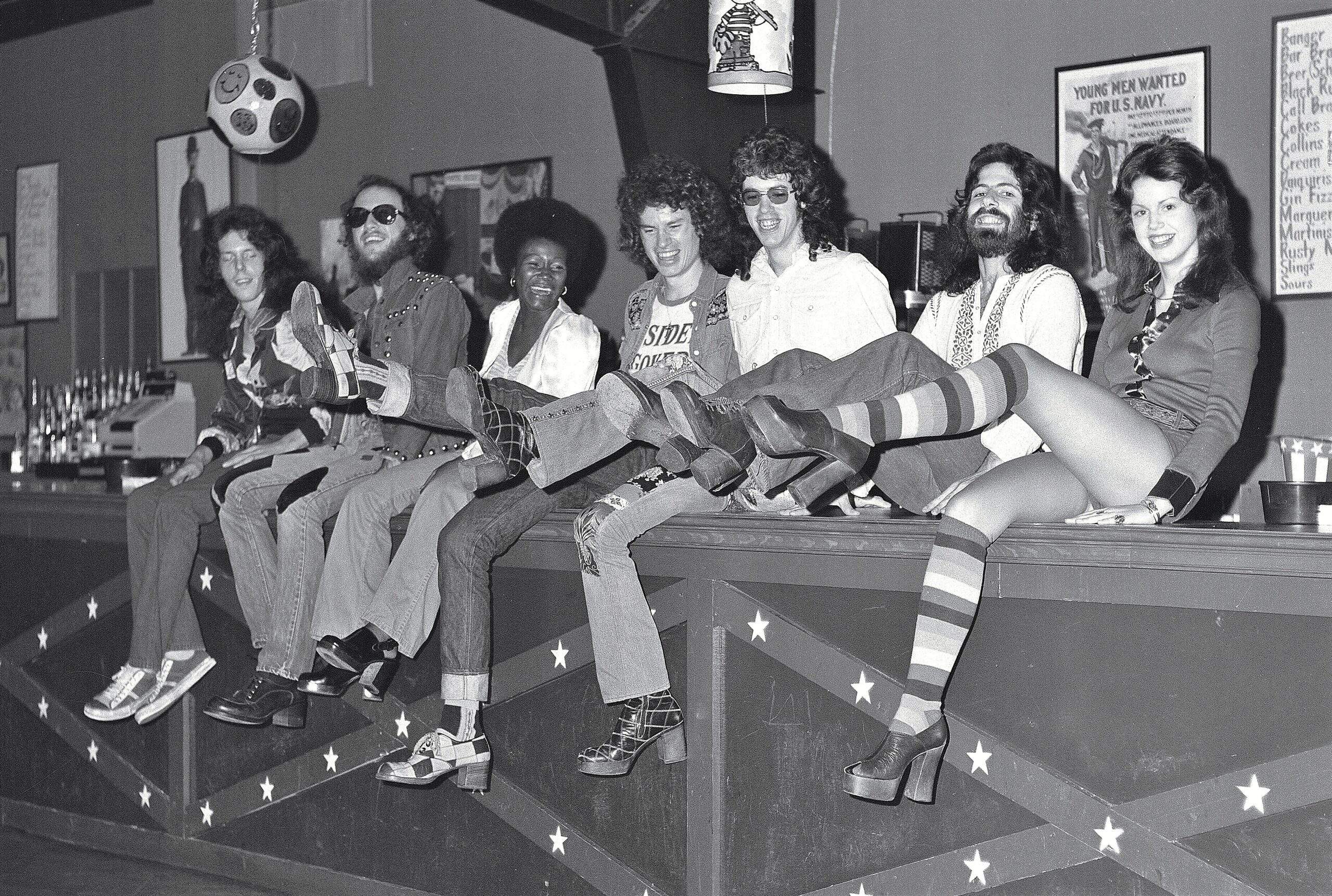
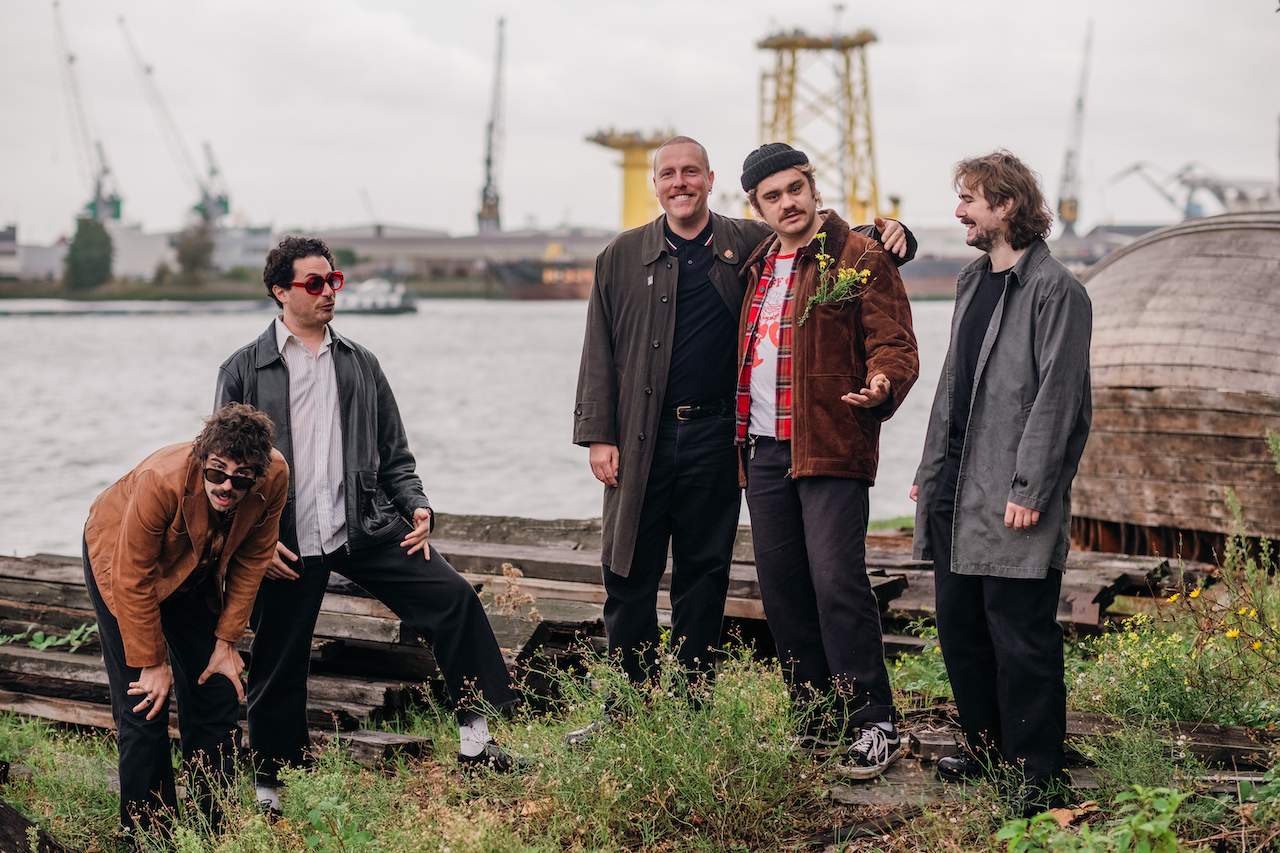
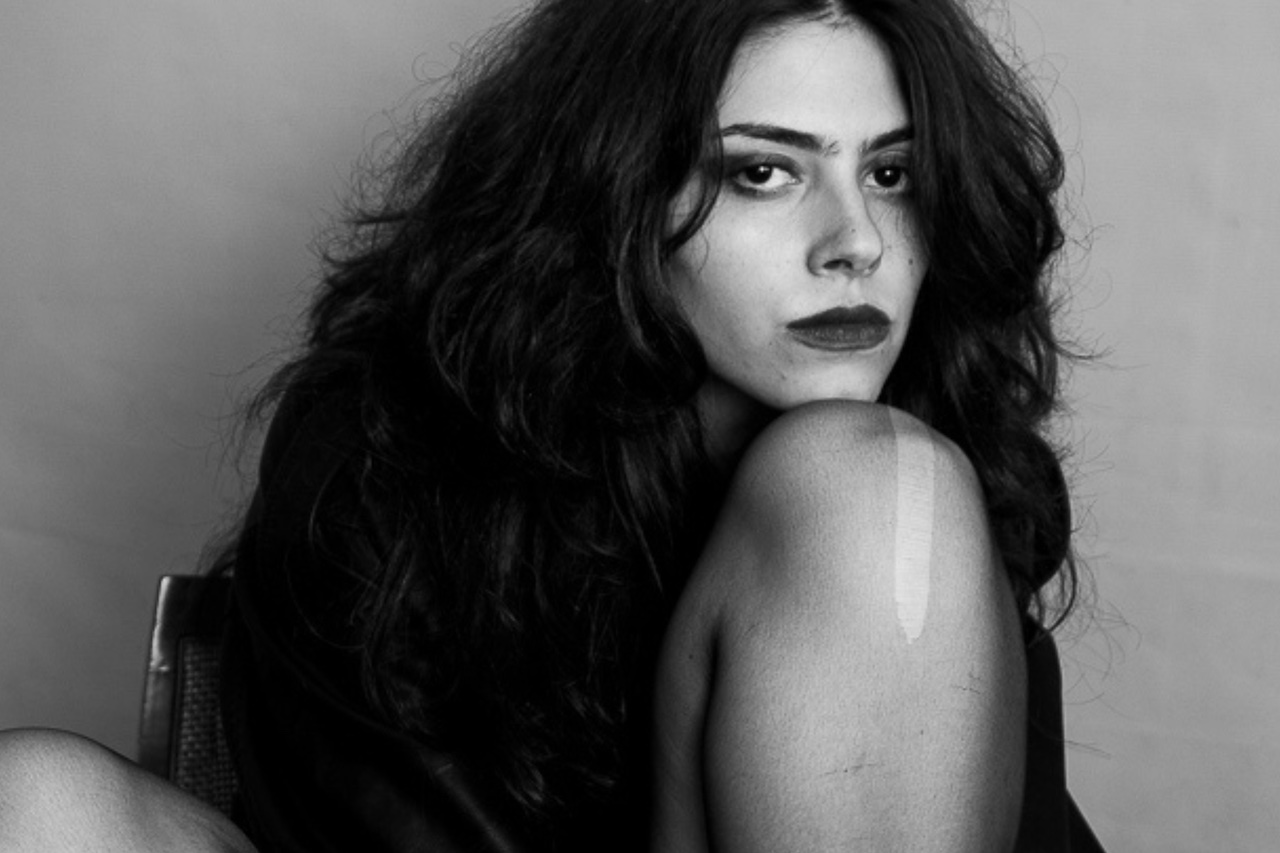
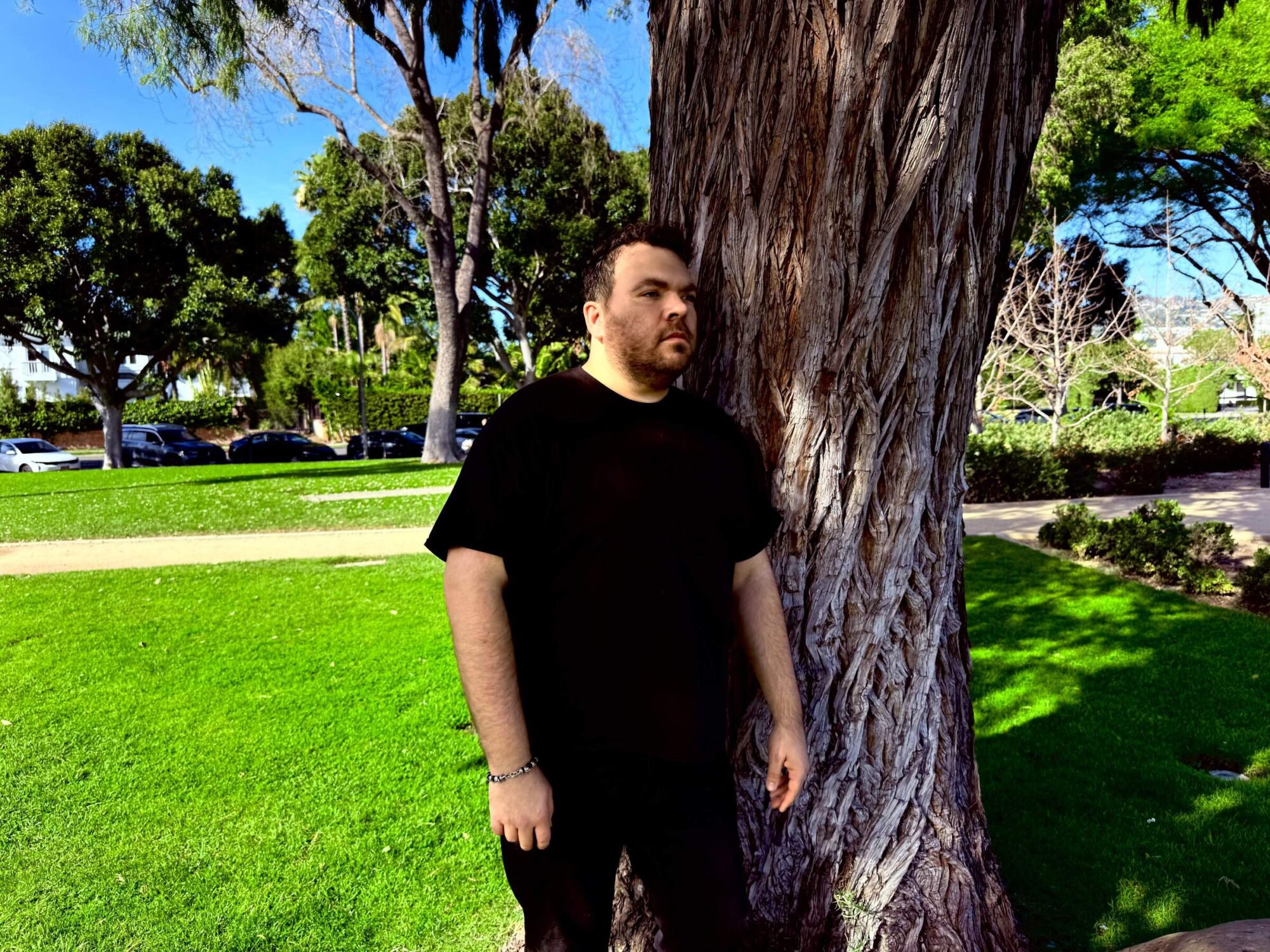
Excellent interviews and story! – And the photos are amazing! 😉
Nice interview and good photos. As a Southern Rock fan it’s good to know another act from the genre’s glory days.
What an incredible interview.. seriously well done. I would like to say that Left Coast Live imo is one of the greatest live albums EVER! If any of you come to Nashville let me know.. I’m buyin’
What a great in depth interview! I had the pleasure of seeing Wet Willie about 5 years or so ago. Everybody except for Jack was there, I was told that he was sick. The band had a “meet and greet” after the show, and Jimmy agreed to take our picture. Something I’m sure he doesn’t even remember, but i treasure that picture. It hangs on my “wall of fame”. Everyone was so nice. I hope to see them again.
I had the pleasure of attending some of those Municipal Park Sunday afternoon Fox performances. Laying on the grass with friends just digging the music. Later the same gig at the Brookley Field park where I met my first girlfriend.